17th October 2024
Global Fund partnership has saved 65 million lives since 2002
In 2023, 25 million people received antiretroviral therapy for HIV, 7.1 million were treated for TB, and 227 million mosquito nets were distributed. This marks the first year of full recovery from COVID-related disruptions. The Global Fund has reduced the combined death rate from AIDS, TB, and malaria by 61% since 2002. The Global Fight
Melinda French Gates launches a $250-million women’s health fund
This is part of a two-year, $1-billion commitment that the billionaire made in May to support women globally. Rejecting the traditional invitation-only philanthropy model, French Gates is issuing an open call to not-for-profits to apply for funding, with 100 NFPs expected to benefit from up to $5 million in funding each. AP
Americans are safer from gun violence than they have been in years
We’ve reported on multiple datasets showing a decline in violent crime in the US. Here's one more: a new analysis shows that 2024 had the smallest summertime increase in all fatal and nonfatal gun injuries since the summer of 2018—25.7% compared to a 41.5% average between 2018 and 2023. American Progress
This finding is yet another sign that the nation has turned a corner on its approach to preventing violent crime and interpersonal gun violence, with some major U.S. cities now safer than they were before the pandemic.
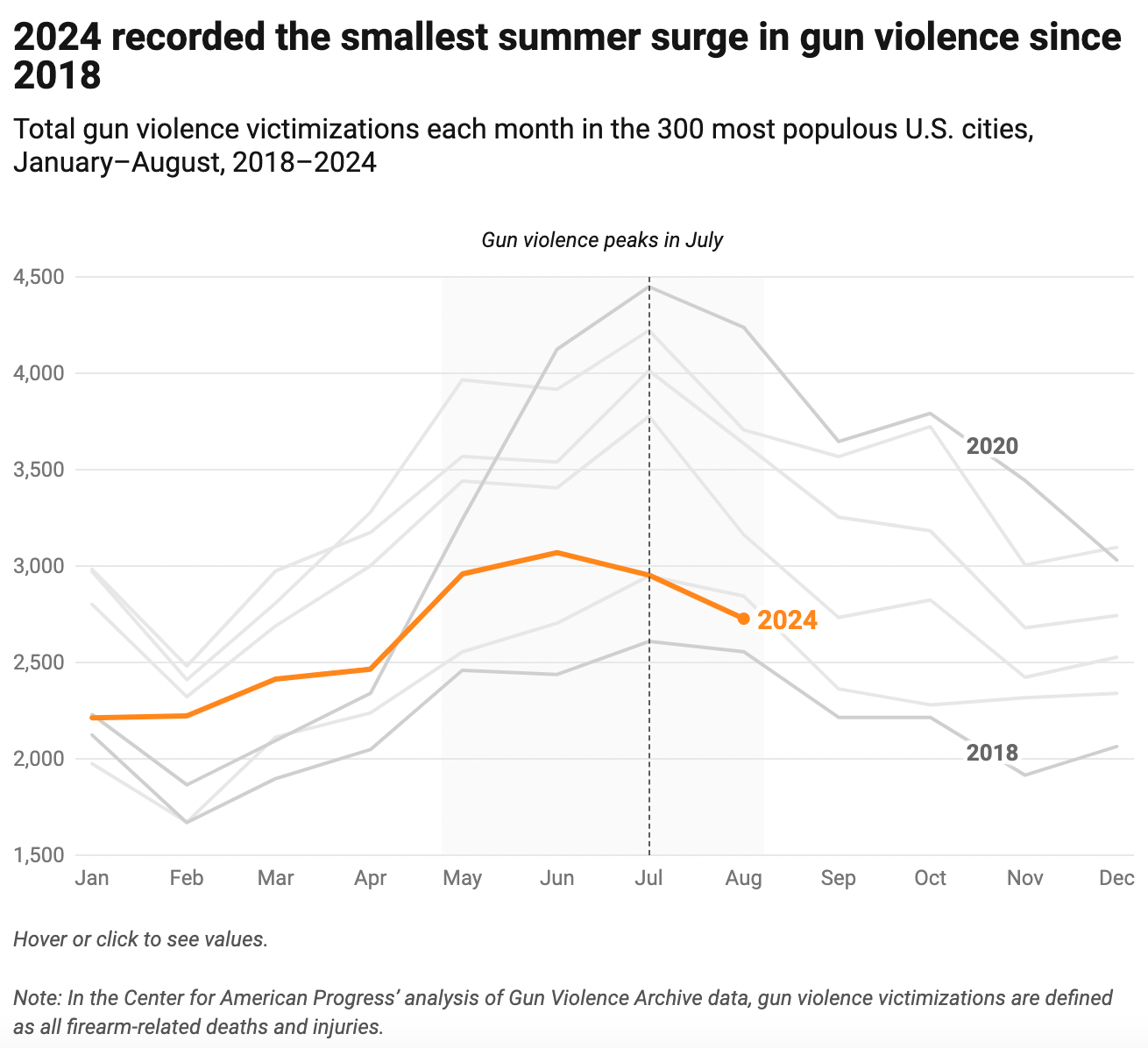
Mozambique’s striking progress on vaccination coverage
UNICEF and WHO data show that DTP3 coverage rose to 70% in 2023, just one year after plummeting to 55% due to COVID-related disruptions. Health workers are also holding three 'Big Catch-up' vaccination rounds in areas with the largest numbers of unvaccinated children. Gavi
Road fatalities in London drop to lowest recorded level
In 2023, the number of people killed or seriously injured on London's roads fell by 6% compared to 2022 and 30% compared to a decade ago. Recent OECD data show that UK road deaths have fallen from 8,000 annually in the 1970s to under 2,000 today, a 75% reduction. TFL
CAR success stories: saving lives, forests, and livelihoods
From the Central African Republic, stories of delivering essential healthcare to nearly 475,000 women and children; strengthening local livelihoods in the Mbaéré-Bodingué National Park; providing 583,000 smallholder farmers with improved seeds, fertilizers, and tools; and a work scheme for 120,000 internally-displaced people. World Bank
Record-breaking number of same-sex marriages in Brazil
In 2023, over 13,000 same-sex marriages were celebrated, a 23.5% increase from 2022 and a 268% rise since 2013, when registry offices were first allowed to perform these marriages. Activists are now urging Congress to allow same-sex civil unions, with their #SayYes campaign garnering over 74,000 signatures to date. Fair Planet
All the evidence, everywhere, all at once
The Economic and Social Research Council, together with the Wellcome Trust, has pledged over $70 million to build giant ‘evidence banks’ for policymakers worldwide trying to solve complex issues. These banks are designed to contain 'everything the world knows about how to solve an important problem in one place'. Nature
Mexico preschool policy generating positive returns two decades later
In the early 2000s, Mexico made preschool education mandatory for all children. New research has revealed lasting cognitive and non-cognitive benefits: children who attended pre-school had better attention spans, improved academic performance, and were 8.7% more likely to finish high school and 11.1% more likely to attend college compared to those who did not. VoxDev
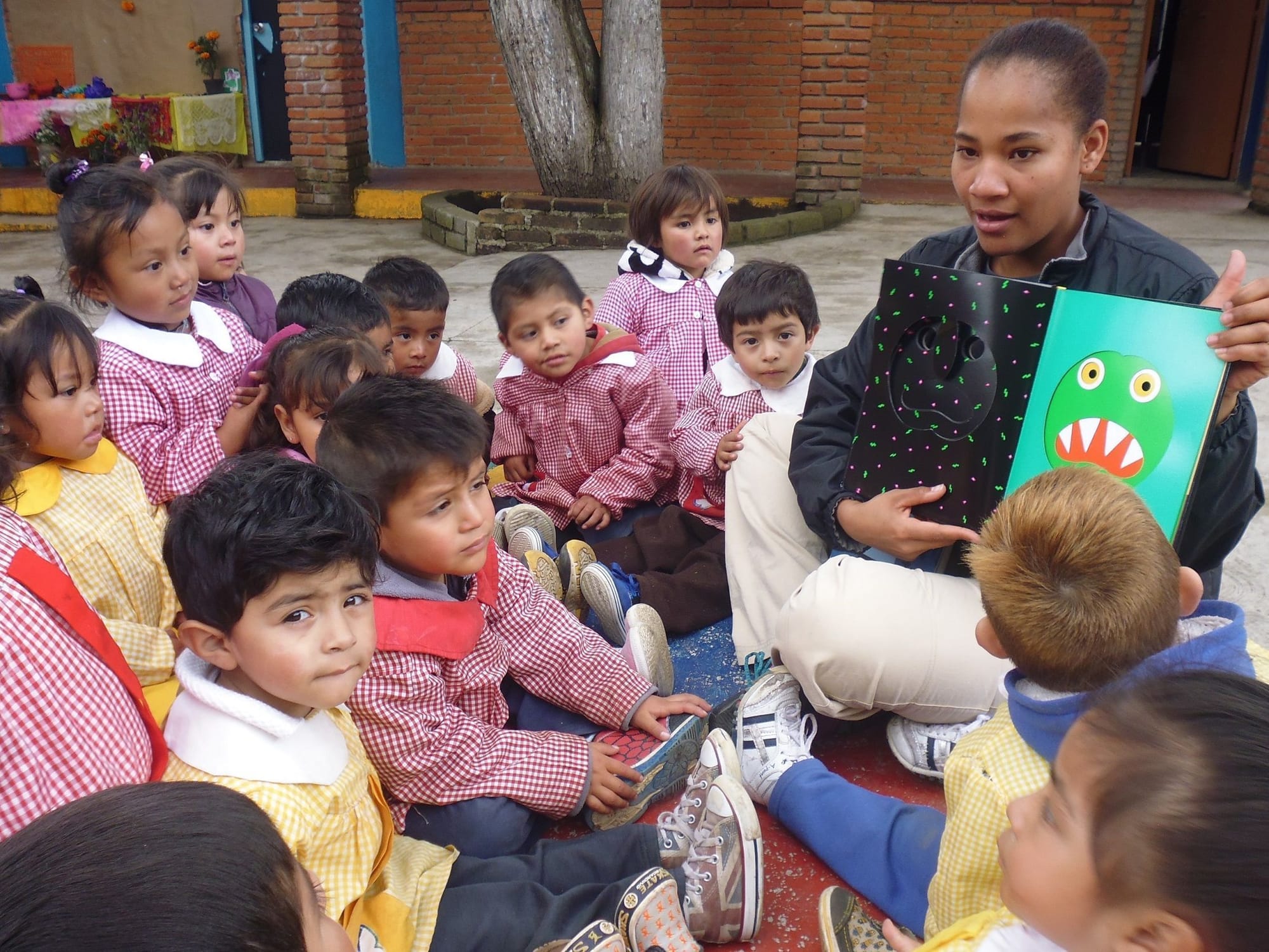
10th October 2024
Pakistan eliminates trachoma as a public health problem
In 1997, Pakistan became the first country to be certified free of dracunculiasis (Guinea-worm disease). Now it has also eliminated trachoma as a public health problem, just seven years since launching its first mass drug campaign. Pakistan is the 19th country globally to reach this historic milestone. WHO
Brazil eliminates elephantiasis as a public health problem
The WHO said that 'Brazil’s extensive and unified health system, coupled with solid specialized laboratory expertise and robust surveillance were essential to interrupt the chain of transmission.' It becomes the 20th country to eliminate one of the most horrible diseases in existence. WHO
The United States may have passed peak obesity
According to new data, the obesity rate in American adults fell by 2% between 2020 and 2023. Although no direct link has been established, it is likely that drugs like Ozempic have contributed to the decline. 'The obesity crisis might have plateaued or begun to ease, and that would be good news for millions.' WaPo
Jordan becomes latest country to join School Meals Coalition
The School Meals Coalition aims to ensure that every child can receive a healthy, nutritious meal in school by 2030. In Jordan, 520,000 students are now served daily through its national school meals programme, reaching over 60% of public primary school students nationwide. X
Two lives saved every minute by Gavi-supported vaccines in 2023
In 2023, Gavi's efforts helped prevent over 1.3 million future deaths by immunising 69 million children, including vaccinating 14 million girls against HPV—surpassing the total HPV vaccinations from the previous ten years combined. Since Gavi was founded in 2000, over 1.1 billion children have been vaccinated. Gavi
'Game-changing' HIV drug to be made affordable in 120 countries
Pharma giant Gilead has signed agreements with six manufacturers to make and sell cheaper versions of its HIV prevention drug lenacapavir in 120 'high-incidence, resource-limited' countries. Lenacapavir, a twice-yearly injection, has been shown to offer near-complete protection from HIV in recent trials. Guardian
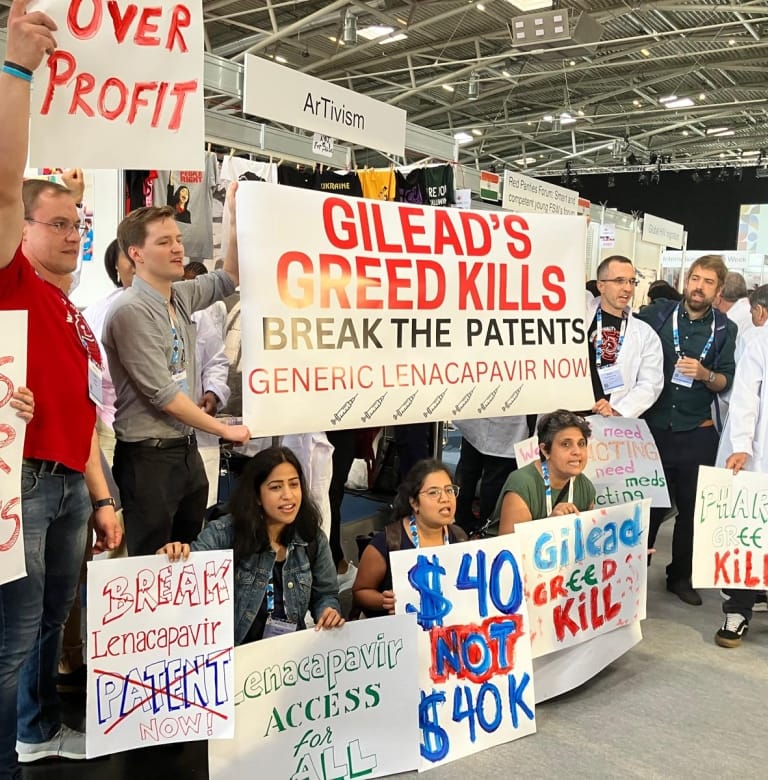
Bangladesh’s social safety net drives remarkable progress
Bangladesh, one of the world's most impoverished countries in the 1970s, is on track to be crossed off the UN's Least Developed Countries list in 2026. The speed of this success is largely attributed to its social spending policies, which now cover 30% of households and have improved a wide range of poverty indicators. Borgen
USAID and UNICEF launch Partnership for a Lead-Free Future
Vox has a great explainer on this amazing initiative, which we first reported two weeks ago. Lead poisoning has long remained on the sidelines of global health despite killing 1.5 million people every year. The new $150-million partnership—which doubles previous global spending—is a gamechanger.
No cervical cancer cases among HPV-vaccinated women in Scotland
A groundbreaking study, the first to track a national group of women over a lengthy period, has found no cases of cervical cancer among women born between 1988 and 1996 who were fully vaccinated against HPV at ages 12 and 13. STAT
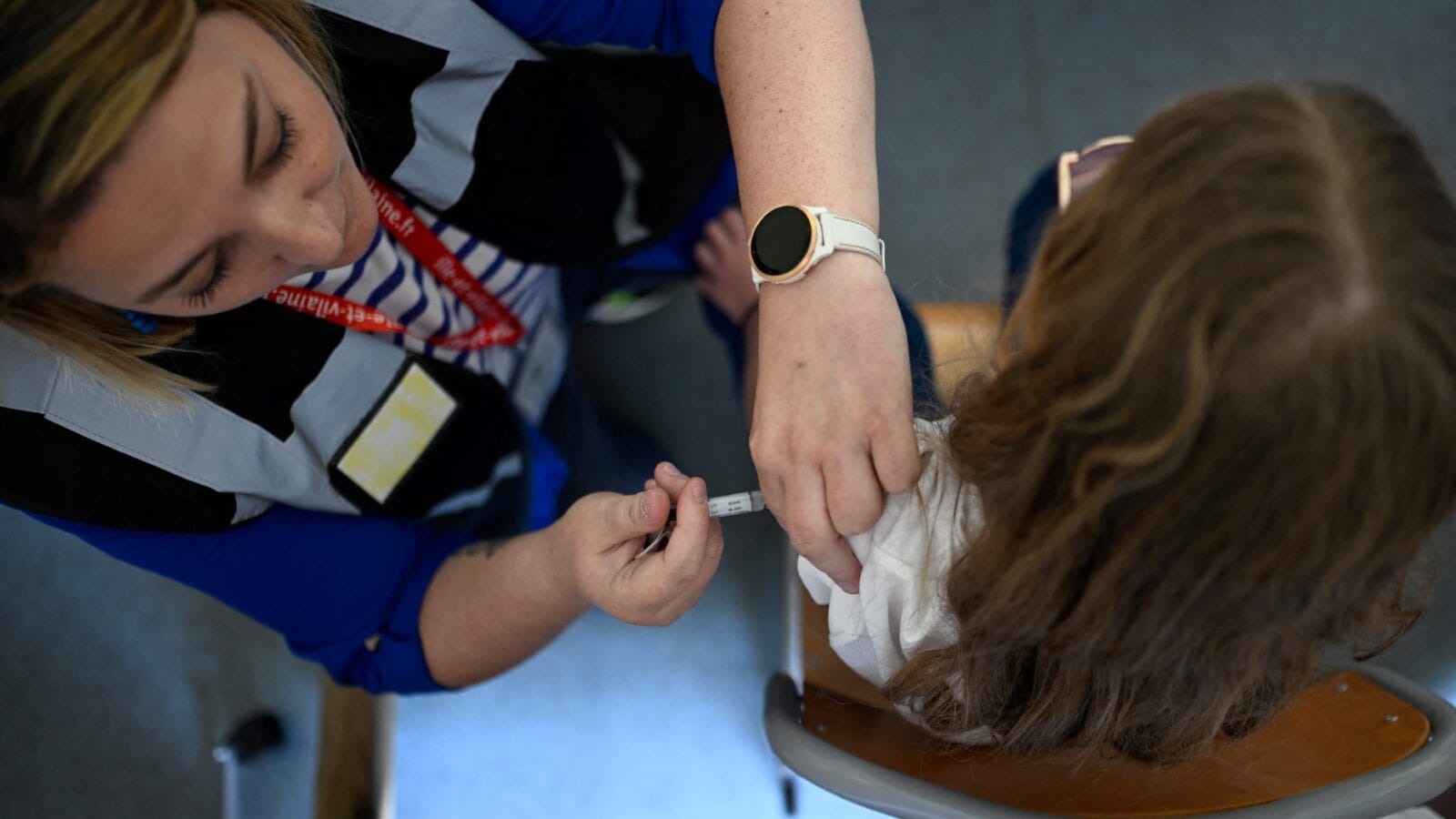
More dads taking paid parental leave in the Netherlands
Since August 2022, the Netherlands has offered paid parental leave on top of existing maternal and parental leave policies. It's working. Between August 2023 and August 2024, more than 170,000 parental-leave applications were received, of which 40% came from fathers—up from 33% the previous year. I Am Expat
A milestone for transgender rights in the EU
The EU's Court of Justice has ruled that member states must recognise legal changes to gender identity processed elsewhere within the bloc, siding with Arian Mirzarafie-Ahi, a transgender man who sued his home country of Romania for refusing to accept the gender identity changes he initiated in pre-Brexit Britain. 'Gender, like a first name, is a fundamental element of personal identity.' WaPo
Nigeria lights up
Back in July, we reported a $500-million loan from the AfDB for electrification in Nigeria, and next month, the government will launch a $750-million rural electrification project to provide electricity to 17.5 million Nigerians via mini-grids, integrated grid systems, and stand-alone solar setups. iAfrica
29th September 2024
World leaders at the UN adopt the Pact for the Future by consensus
We believe that there is a path to a brighter future for all of humanity, including those living in poverty and vulnerable situations. Through the actions we take today, we resolve to set ourselves on that path, striving for a world that is safe, peaceful, just, equal, inclusive, sustainable and prosperous, a world in which well-being, security and dignity and a healthy planet are assured for all humanity. UN
Jordan becomes the first country to eliminate leprosy
A real-life miracle in a country where Abraham, Jesus and Muhammad once walked, a region that half of humanity views as the geographic and spiritual heartland of their faith. 'As the first country to achieve this target globally, Jordan stands as an inspiration to other countries, encouraging them to enhance their efforts and overcome barriers to achieve this remarkable feat.' WHO
In a world first, a woman’s diabetes is reversed by her own stem cells
A 25-year-old woman with type 1 diabetes has become the first person with the disease to be treated using cells extracted from her own body. It's a 'stunning result' a complete reversal of the disease in a patient that previously required substantial amounts of insulin. A reminder: diabetes affects close to half a billion people worldwide. Nature
World Bank says global poverty has returned to pre-pandemic levels
Their Poverty and Inequality Platform just released new estimates through August 2024 showing that the pandemic caused global extreme poverty to rise from 8.8% in 2019 to 9.7% in 2020, but that it fell to 9% in 2022 and is expected to drop to 8.5% this year. World Bank
Also—Max Roser says it's time to lift the global poverty line to $30 per day. 🎁
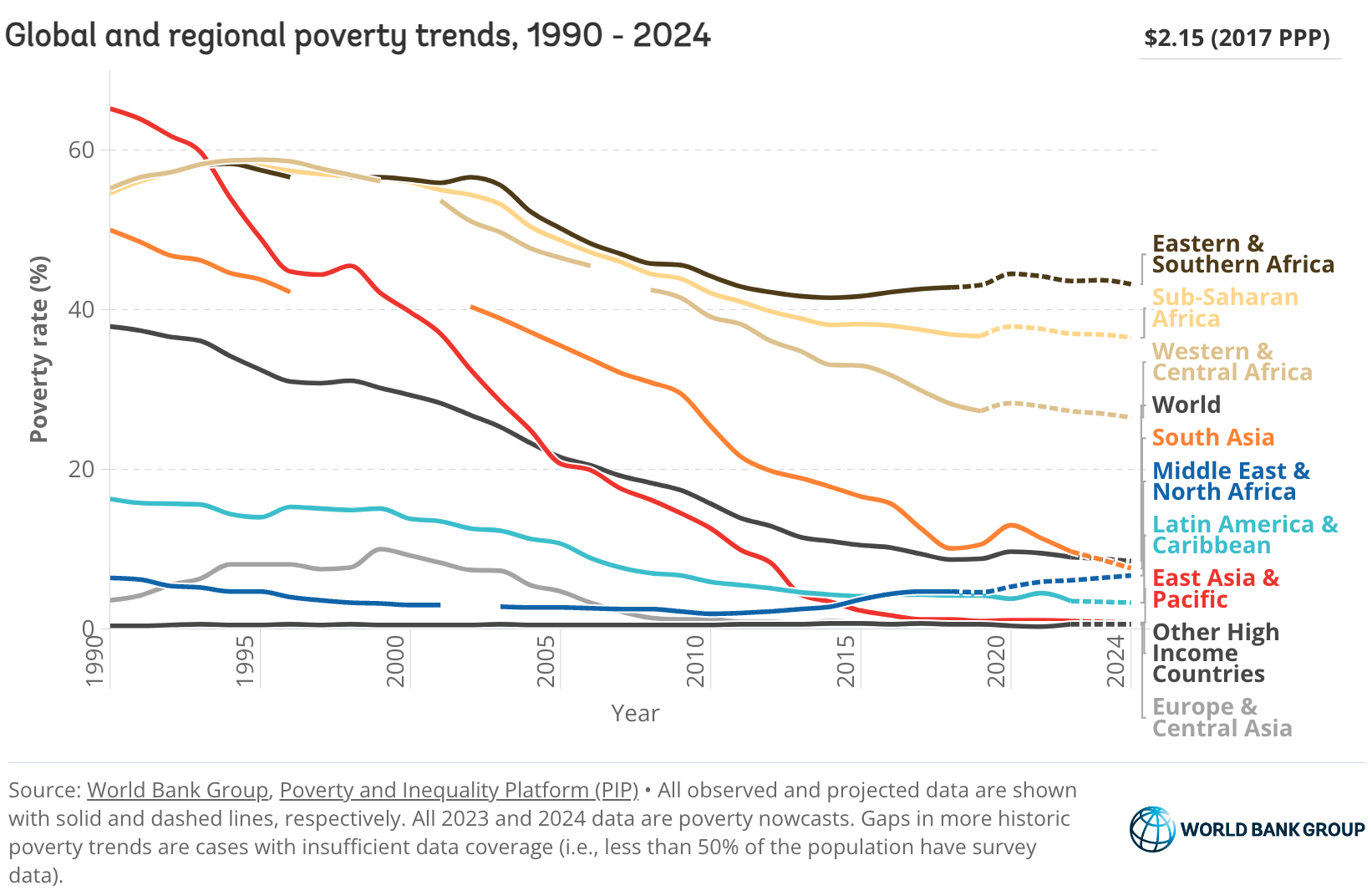
UNICEF to add nutrients to polio vaccinations for kids in Gaza
The second round of a vaccination campaign to protect 640,000 children in Gaza will also deliver micronutrients—essential vitamins and minerals—and conduct nutritional screening. Discussions are also happening about the feasibility of adding further vaccinations, including a measles immunisation. Reuters
A massive effort to electrify Africa gets underway
A plan to bring electricity to 300 million Africans by 2030, backed by an initial pledge of $30 billion from the World Bank and the African Development Bank, has kicked off with an assessment of the first potential beneficiaries. It's a really good idea (🎁). 'Electrifying the world could produce the largest development gains since the 1990s.' Bloomberg
India reduces childhood stunting
In 2018, the country launched the Poshan Abhiyaan, a programme to reach kids in the first 1,000 days of their life, led by an army of 860,000 frontline workers. In the 11 states with the highest burden, stunting decreased from 41% to 37%, the proportion of undernourished women fell from 24.5% to 20.3%, and exclusive breastfeeding increased from 54.1% to 64.6%.
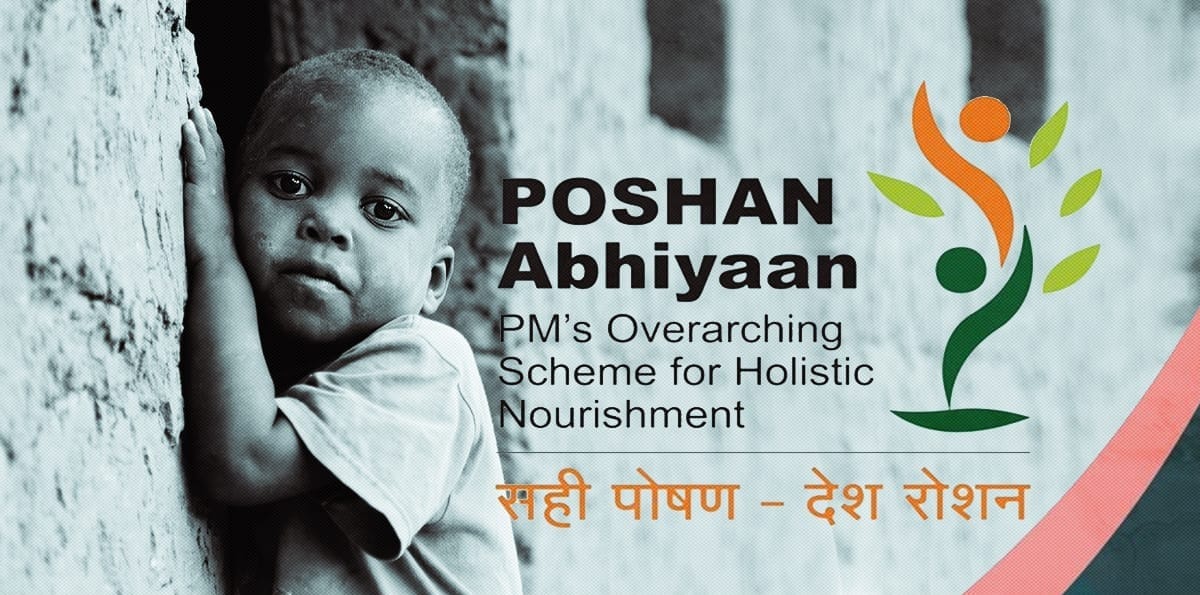
Sierra Leone almost halves maternal mortality in five years
The number of women dying from pregnancy, childbirth, and postpartum complications has decreased from 717 per 100,000 births in 2019 to to 443 per 100,000 births in 2023. UNICEF
Everything in America is awful
Aside from the fact that overdose deaths are down by 10%, the FBI says last year saw the largest one-year decline in murder ever recorded and that reported violent crime has fallen to levels last seen in the early 1970s, wages have been ahead of inflation since May 2023, and a record 92% of the country is now covered by some kind of health insurance.
Oh, and over 100,000 Americans have joined a programme to welcome refugees in their first three months, helping them find homes, enrol in schools, and pursue their dreams. No cats, dogs, or geese were harmed.
North Dakota court restores reproductive rights
Abortion will again be legal in North Dakota after a state court ruled that its near-total abortion ban is unconstitutional. Abortion has been illegal in North Dakota since April 2023. Center for Reproductive Rights
Kentucky's governor bans use of conversion therapy
'My faith teaches me that all children are children of God. And where practices are endangering and even harming those children, we must act.' AP
Most of the world now has legal protection against domestic violence
Twenty years ago, 8 in 10 people lived in countries without legal penalties for domestic violence. By 2023, this had more than reversed, with 9 in 10 people living in countries with legal measures against domestic violence. There are still huge gaps in implementation and enforcement—but this is progress. OWD
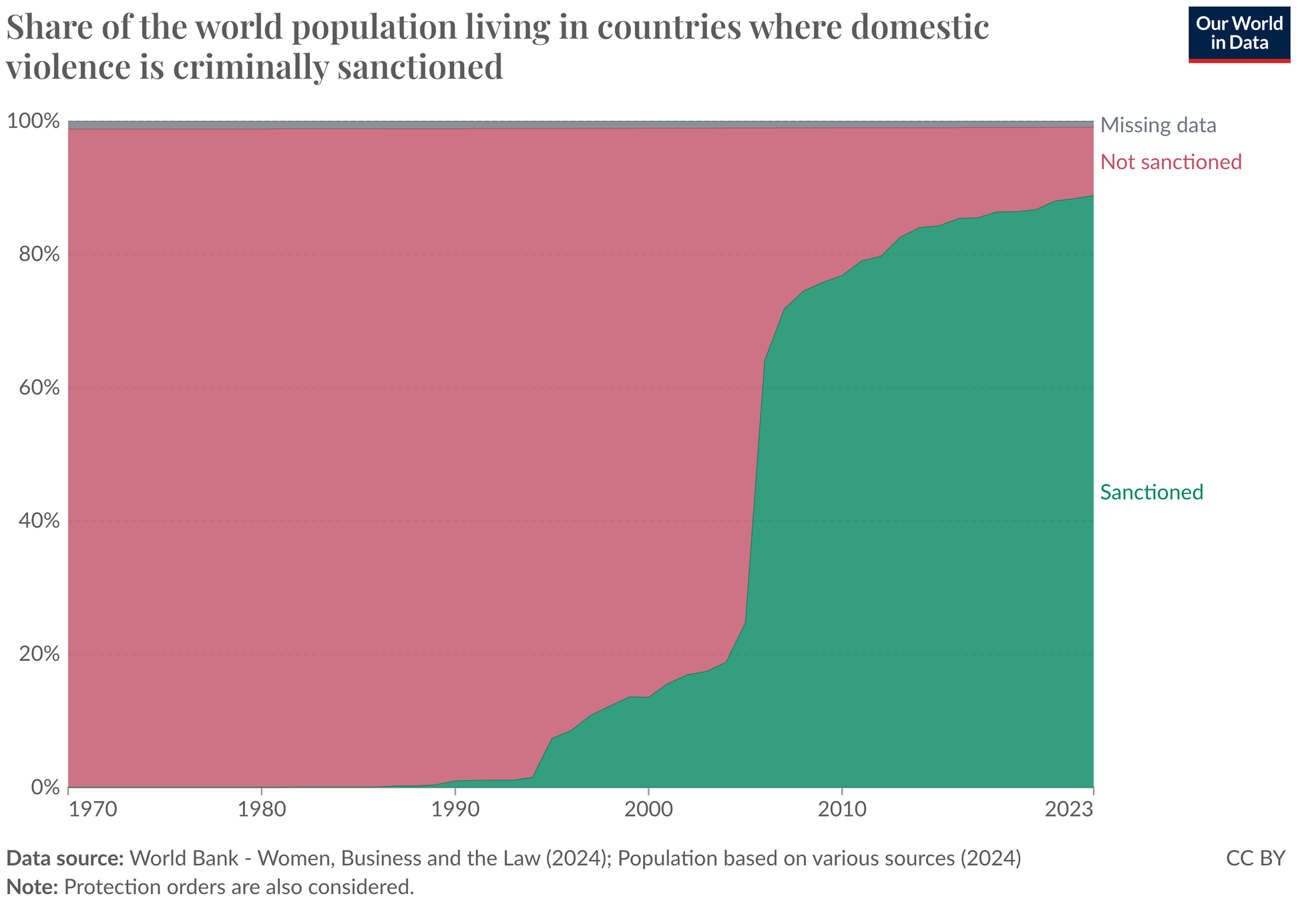
Quad countries launch cancer moonshot
The United States, Australia, India, and Japan are launching a groundbreaking effort to help end cancer in the Indo-Pacific, starting with cervical cancer. It's backed by a ton of money: billions of dollars from governments, philanthropic partners, and multilateral organisations, and a commitment from India for something like 40 million doses of the HPV vaccine.
How the lessons of COVID-19 ensured a rapid response to the mpox outbreak.
A major advance in the fight against drug-resistant tuberculosis
Last month the WHO recommended three new regimens for multidrug-resistant tuberculosis. It's a big breakthrough—the new regimens allow patients to be cured in nine months with all-oral treatments, compared to the current, conventional 18-month regimen, which includes daily painful injections. PIH
First patients start receiving treatment for sickle cell disease
His life with the disease has been punctuated by episodes of excruciating pain, requiring days in the hospital as doctors tried to control it. Sickle cell eroded his hip bones. It prevented him from riding a bike or playing soccer or even going outside when the temperature was below 55 degrees Fahrenheit because cold often brought on intense pain.
Now he could see a future — in a month or so — without pain from sickle cell.
'I can’t wait to start my new life.'
New York Times 🎁

17th September 2024
Towards the elimination of a Biblical scourge
A new WHO update on Hansen's disease—more commonly known as leprosy—shows that from 2014 through 2023, the number of new cases globally decreased by 14.6%, from 214,001 to 182,815. New leprosy cases among children also significantly dropped during this time, from 18,862 cases in 2014 to 10,322 in 2023, representing a decrease of 45.3%. WHO
Zimbabwe makes huge strides towards eliminating trachoma
Since holding its first mass drug administration campaign in 2016, Zimbabwe’s Ministry of Health has reached and treated over 4.5 million trachoma sufferers in poor communities with the antibiotic azithromycin. Around 3,000 people with advanced trachoma have benefitted from successful surgeries, and trachoma prevalence is now reported in just 3 of Zimbabwe’s 63 districts. Gavi
India extends health coverage scheme to over-70s
Fulfilling a key election promise, the government has expanded its national medical insurance scheme to provide citizens aged 70 and above with annual coverage of 500,000 rupees (about $6,000) per family. The government already provides free health services to 500 million low-income people, and the new plan is expected to benefit an additional 60 million. Reuters
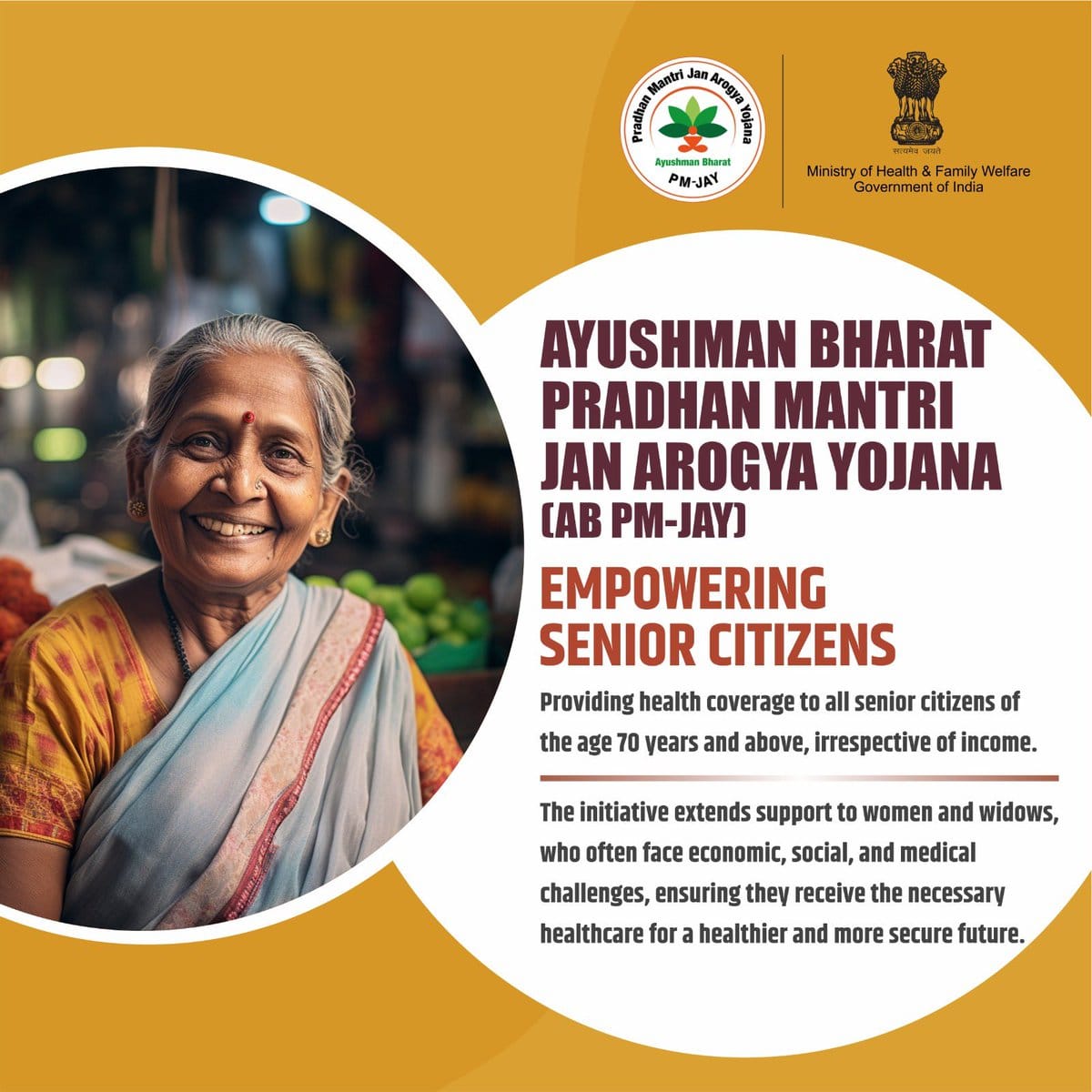
US household purchasing power restored to pre-COVID levels
The inflation-adjusted median income of US households has rebounded to 2019 levels, rising from the equivalent of $77,540 in 2022 to $80,610 in 2023, an increase of 4%. The proportion of Americans living in poverty has also fallen slightly, from 11.5% in 2022 to 11.1% in 2023. This income jump has been attributed to the unemployment rate falling to a 50-year low in 2023. AP
Domestic violence in America down by two-thirds in 30 years
In September 1994, President Bill Clinton signed the Violence Against Women Act, the country's first federal law criminalising domestic violence and providing support for community-based efforts against sexual assault. According to the FBI, between 1993 and 2022, domestic violence rates dropped by 67%. President Biden, who authored and championed VAWA as a senator, has announced that future renewals will include over $690 million in grants to support survivors. PBS
America’s shoplifting epidemic: more fiction than fact
OK, so immigrants aren’t eating pets, murder and crime rates are way down, and inflation is back to normal, but what about the huge wave of shoplifting? Well, it was more smoke than fire. Analyses show that many retailers’ merchandise losses have stabilised or improved, while mentions of 'shrink'—lost inventory as a percentage of sales—on companies’ earnings calls dropped 20% during the first two quarters of 2024 compared to 2023. CNN
The narrative that shoplifting exploded nationwide has been mostly unfounded. In reality, retail crime has not meaningfully gone up nationwide in the past few years, and it has even gone down in many places. Some retail analysts have suggested companies may have overblown the impact of shrink and theft to mask other problems.
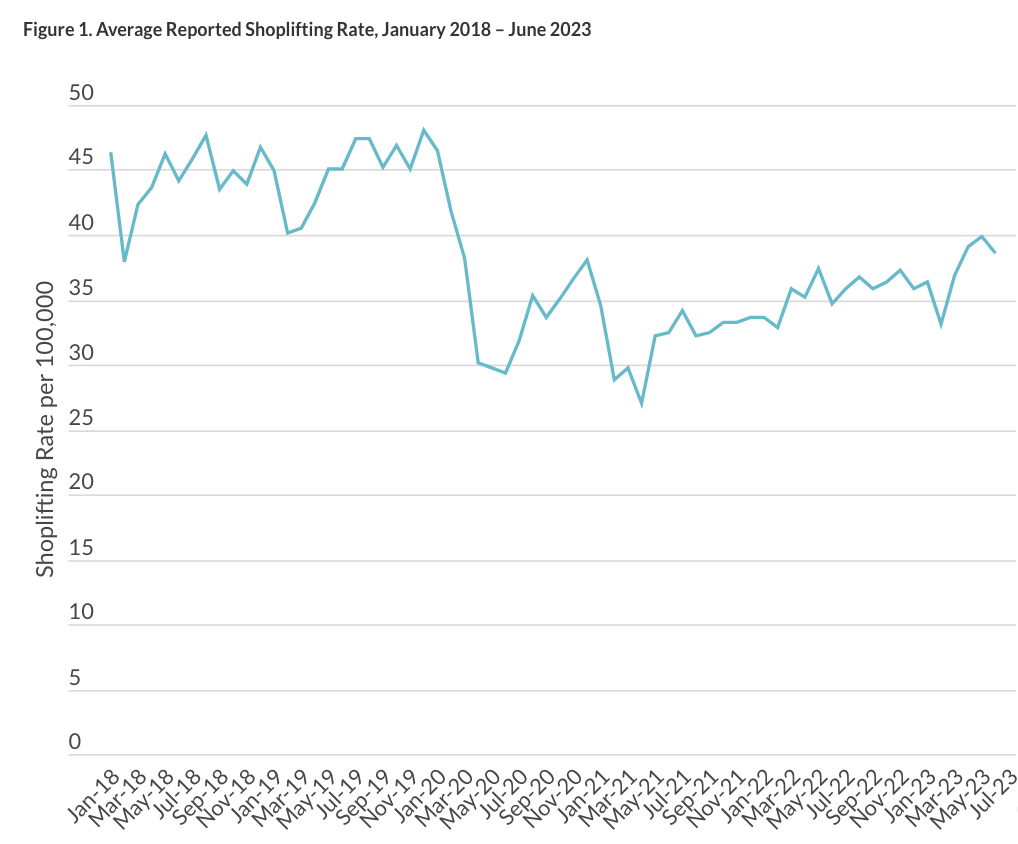
Skin cancer rates are dropping among Swedish adults
Swedish researchers have reported that the risk of malignant melanoma has been decreasing in people aged 50 years and younger since 2015. Mortality rates among under-60s have also decreased. The declines have been attributed to increased awareness of sun protection, reduced access to sunbeds, less time spent outdoors, and increased immigration. EurekAlert
Curbing pesticide access has drastically reduced suicides in South Asia
In Nepal, doctors and regulators have long advocated for stricter pesticide regulations due to their use in suicides. In 2019, the country banned imports and sales of eight pesticides, adding two more to the list in July. Early data show a 30% drop in reported deaths, with no impact on agricultural output. Replace 'pesticides' with 'guns', and you've got a compelling case for the United States. Telegraph
'A massive success amidst a tragic daily reality'
The WHO has successfully completed the first round of its emergency polio vaccination campaign in Gaza. From 1st to 12th September, health workers provided novel oral polio vaccine type 2 to some 558,963 children in central, southern, and northern Gaza, working rapidly during nine-hour humanitarian pauses. A second round in four weeks’ time will provide a second dose of the vaccine to children to prevent it spreading internationally. UN
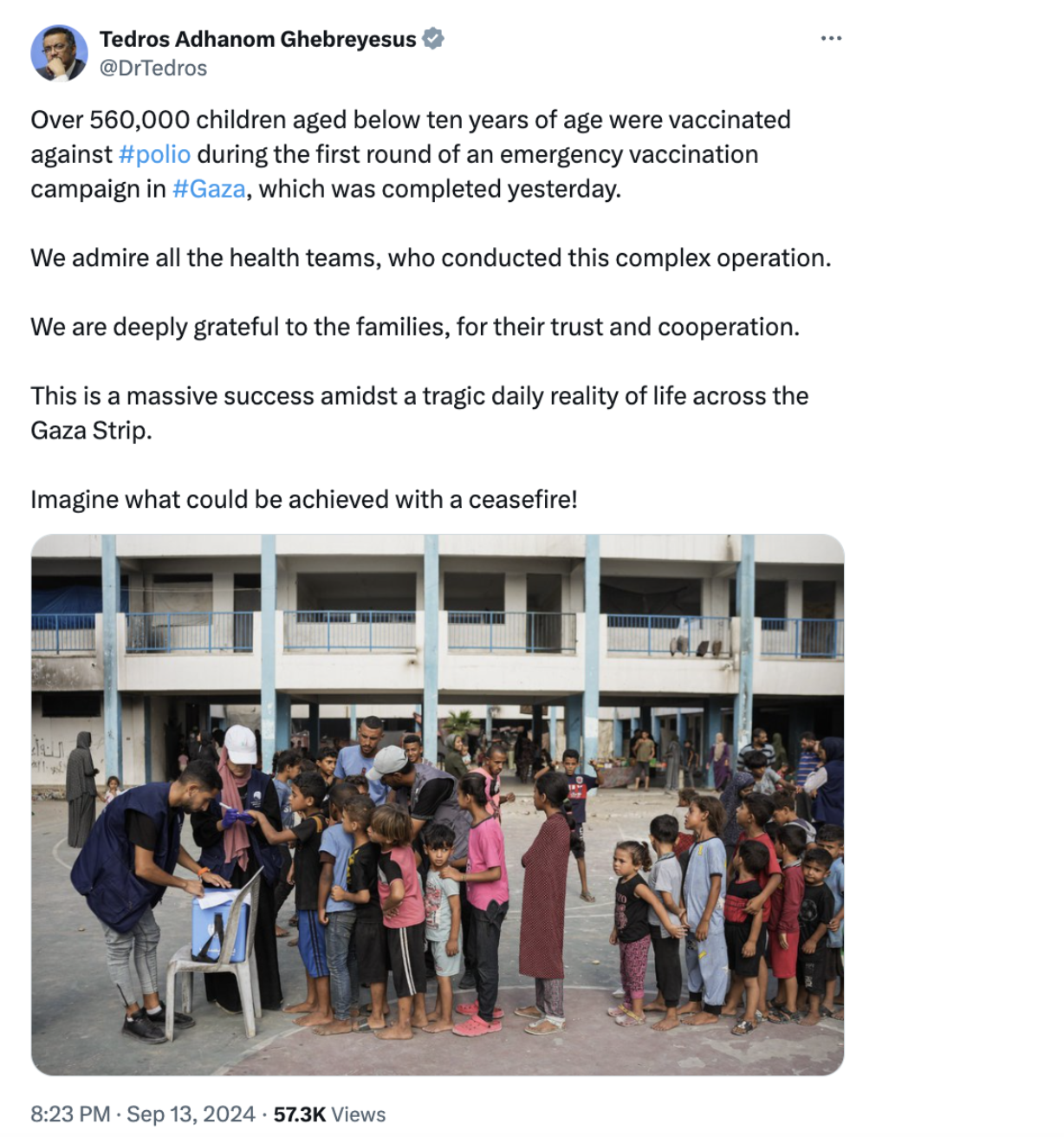
More good news you didn't hear about
- How the fight against sleeping sickness was won (we are closer than ever before to consigning 'the colonial disease' to history).
- Thailand has fully adopted the UN Convention on the Rights of the Child, which strengthens legal protection and expands access to essential services for refugee children.
- Hunger and food insecurity are falling in Latin America and the Caribbean.
- The World Bank has approved a new $150-million loan to upgrade road infrastructure in the state of Bahia, Brazil, benefitting 2.35 million people.
- Six outstanding literacy programmes from Austria, Egypt, Ghana, Indonesia, Nigeria, and Panama recently received prizes from UNESCO.
- The FDA has approved a second Alzheimer’s drug that has been shown in clinical trials to moderately slow cognitive and memory decline.
- The FDA has also approved three new therapies for Duchenne muscular dystrophy in the last fifteen months.
- More than 50% of people with advanced melanoma now survive for at least ten years when they receive a double dose of a new immunotherapy drug; 15 years ago, the five-year survival rate was 5%.
- In the shadow of war, life begins anew in a Congolese maternity ward.
- Hope amid the rubble - 84 community initiatives that are restoring learning in the Gaza Strip, alongside vital mental health and psychosocial support.
- The Nuwa Senchi project (‘strong woman’ in a local language) has provided domestic violence support to over 13,000 women in the Peruvian Amazon.
- Drones are delivering life-saving vaccines on demand to children in remote parts of Kisumu, Kenya.
- After a two-year project by UNICEF and the German government, Torit, a city in South Sudan, is now efficiently providing clean water to over 80% of its population.
- The real immigration crisis? Not enough immigrants.
- Case in point: Heman Bekele, a 15-year-old Ethiopian immigrant to the United States, who might change skin cancer treatment with just a bar of soap.
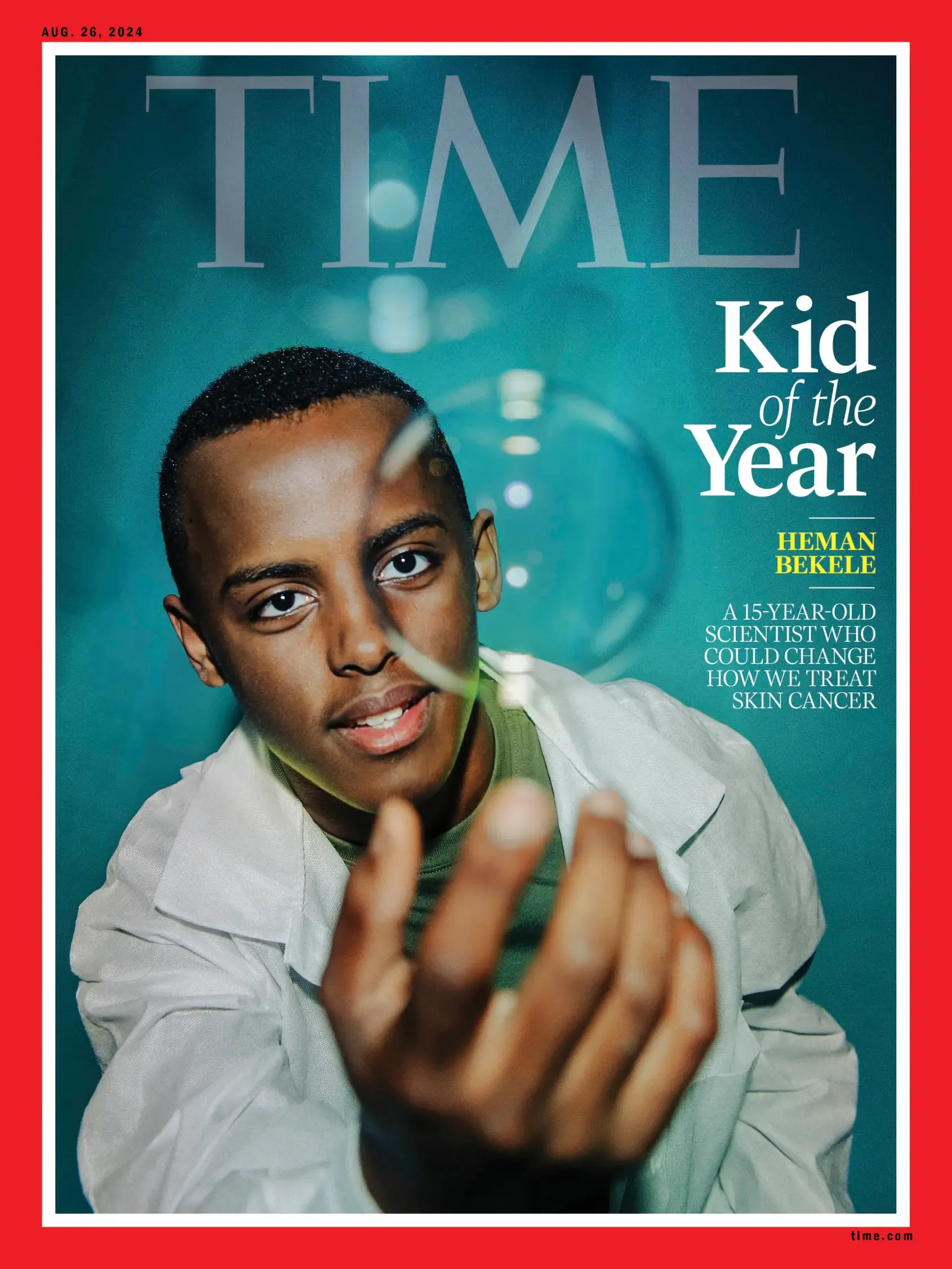
10th September 2024
Infant mortality rates have plummeted over the last 50 years
Globally, infant mortality rates have dropped by more than two-thirds, from approximately 10% in 1974 to less than 3% today. A recent study published in The Lancet attributes much of this decline to increased access to essential vaccines, which are estimated to have reduced infant mortality by 40% over the past 50 years, saving the lives of around 150 million children. Our World In Data
Children in London are walking or cycling to school more
Researchers have found that schoolchildren living in London’s Ultra Low Emission Zone (ULEZ) were nearly four times as likely to switch to walking and cycling compared to those living outside the zone. The clean air policy has substantially reduced levels of harmful nitrogen oxides and particulate matter in central London since its introduction in April 2019. University of Cambridge
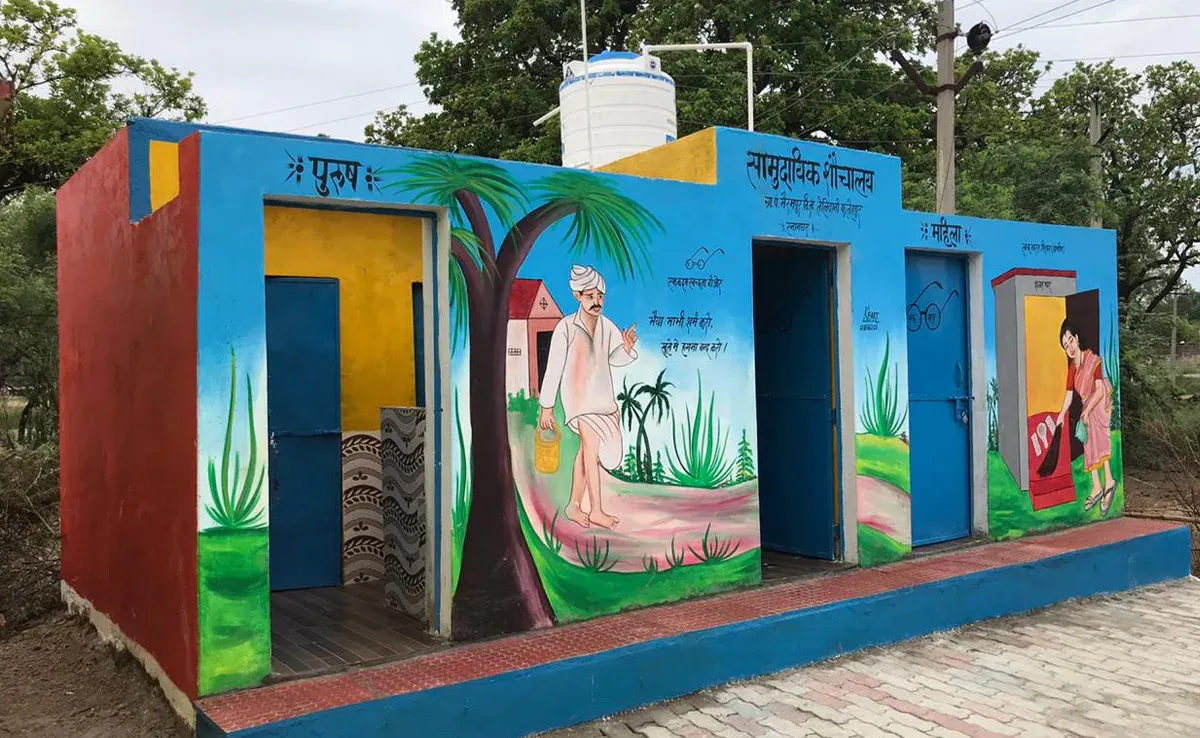
Transforming water and sanitation access in the DRC
The DRC has one of the world's lowest rates of access to basic water and sanitation services. A new USAID-World Bank agreement is aiming to provide basic water access to 12 million people and basic sanitation to 8 million across nine provinces. If successful, this would be one of the biggest water and sanitation projects in Africa's history. World Bank
Vietnam’s credit policies a 'pillar' of poverty reduction
Social policy credit provided by the Vietnam Bank for Social Policies has contributed to lowering the poverty rate from 14.2% to 4.25% between 2011 and 2015, and from 9.88% to 2.23% between 2016 and 2021. The program has helped more than 4.2 million people find jobs, and over 610,000 students have been supported through loans. Vietnam Plus
The fight to wipe out the Philippines' final malaria stronghold
The Philippines has limited malaria transmission to just one region in the country, going from over 48,000 cases in 2003 to just over 6,000 ten years later. The Telegraph has a great insider look into the work going into eliminating malaria in the country completely via efforts in remote Indigenous communities where transmission still occurs. Telegraph
South Asia records significant trend reversal in pollution levels
The region saw a decline in pollution of 18% from 2021 to 2022, with the highest declines observed in Bangladesh, followed by India and Nepal. This is the largest single-year decline for a region since data collection began in 1998. If pollution in South Asia had continued to rise in line with the past two decades, global pollution levels would not have decreased from 2021 to 2022. AQLI
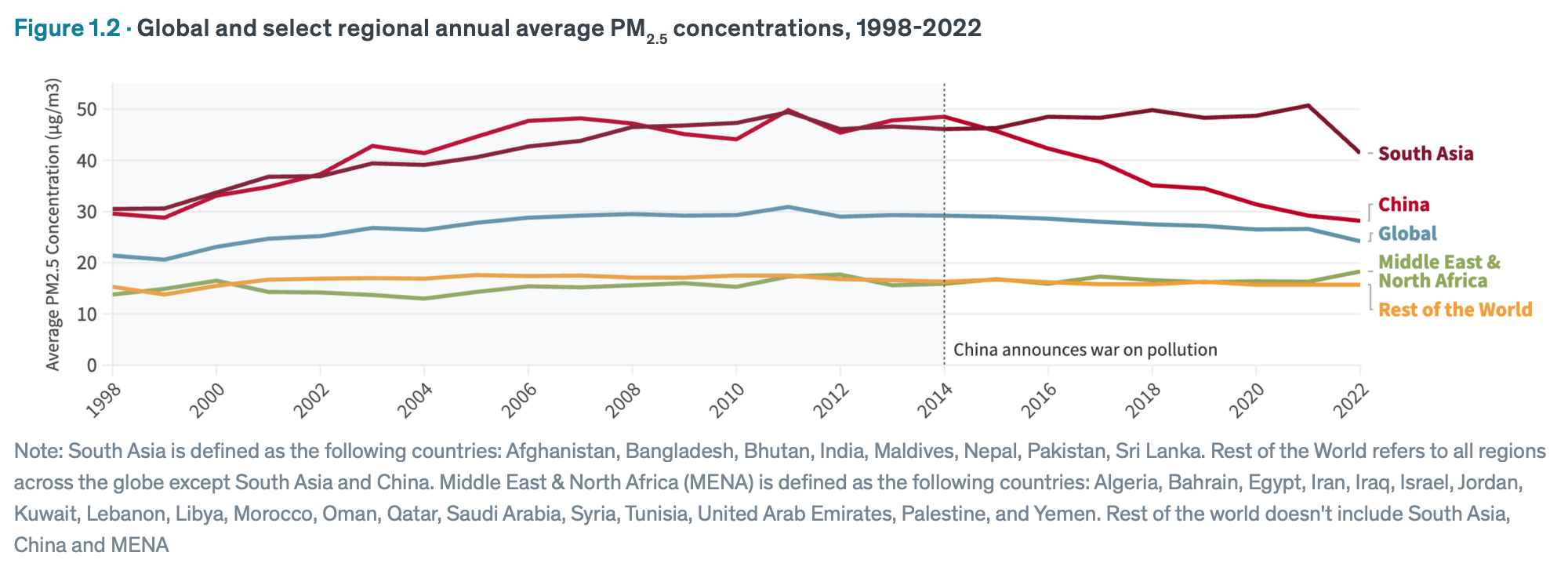
Ghana passes long-awaited gender equality bill
Parliament unanimously passed the Affirmative Action (Gender Equality) Bill in August, following decades of campaigning by women’s rights activists and allies. The bill aspires to achieve gender equality in decision-making by 2030 by making it compulsory to have women elected or appointed to major decision-making organs of public life and promoting policies and programs to effectively address social, cultural, economic, and political gender imbalances. The Conversation
India’s queer community can now open joint bank accounts
In October 2023, the Supreme Court recommended that queer partners be allowed to open joint bank accounts and name their partner as a nominee to receive the balance if they die. The government has now confirmed this information in an advisory, noting that the Reserve Bank of India has issued a clarification to all scheduled commercial banks. Business Standard
The IRS collects $1.3 billion in unpaid taxes in the US
In 2023, the IRS launched initiatives targeting high-wealth tax dodgers with over $1 million in income and $250,000 in tax debt. Nearly 80% of the 1,600 millionaires targeted have made payments. A new 2024 effort has recovered $172 million from 21,000 wealthy taxpayers who haven’t filed returns since 2017. The IRS credits enhanced enforcement to increased funding from Biden’s 2022 climate, healthcare, and tax package. ABC
A quarter of Gazan children have been vaccinated against polio
The World Health Organization has vaccinated more than 161,000 children under ten in central Gaza in the first two days of its mass campaign to prevent the spread of polio within Gaza and its borders. Health workers will now move on to southern Gaza, where they are aiming to reach some 340,000 children, followed by northern Gaza. Reuters
More good news you probably didn't hear about
- Since 2018, the World Bank has helped nearly 95 million women receive skilled attendance at birth through project investments in 47 LMICs.
- The Central African Republic has become the fourth country to introduce the R21 malaria vaccine, aiming to vaccinate 200,000 children in 2024.
- A Scottish charity that started in a shed in the Highlands is now reaching 110,000 children in Tigray, Ethiopia, with its school meal programme.
- Teen vaping in the United States has dropped to its lowest level in a decade.
- US traffic fatalities are on track to drop for a third consecutive year, with the Transportation Department announcing $1-billion for road safety projects.
- Kidney donation in the US has become even safer: today's mortality rate is 0.9 per 10,000 people, down from 3 per 10,000 in the 1990s.
- The Asian Development Bank has approved $936 million for water supply services and basic hygiene facilities in rural Cambodia.
- Rwanda’s Volcano Belt Water Supply System Project will provide 354,000 people in the Musanze, Nyabihu, and Rubavu districts with clean water.
- Mozambique has launched an ambitious plan to implement the UN's Early Warnings for All initiative nationwide by the end of 2027.
- Mauritania's social protection programmes have benefited thousands of women and children.
- Average household spending on food in India has dropped to less than half of monthly expenditure for the first time.
- Bangladesh’s interim government has signed the UN convention against forced disappearance.
- How open trade saved us from a global food crisis: despite the apocalyptic headlines, global markets for basic food commodities are almost back to normal.
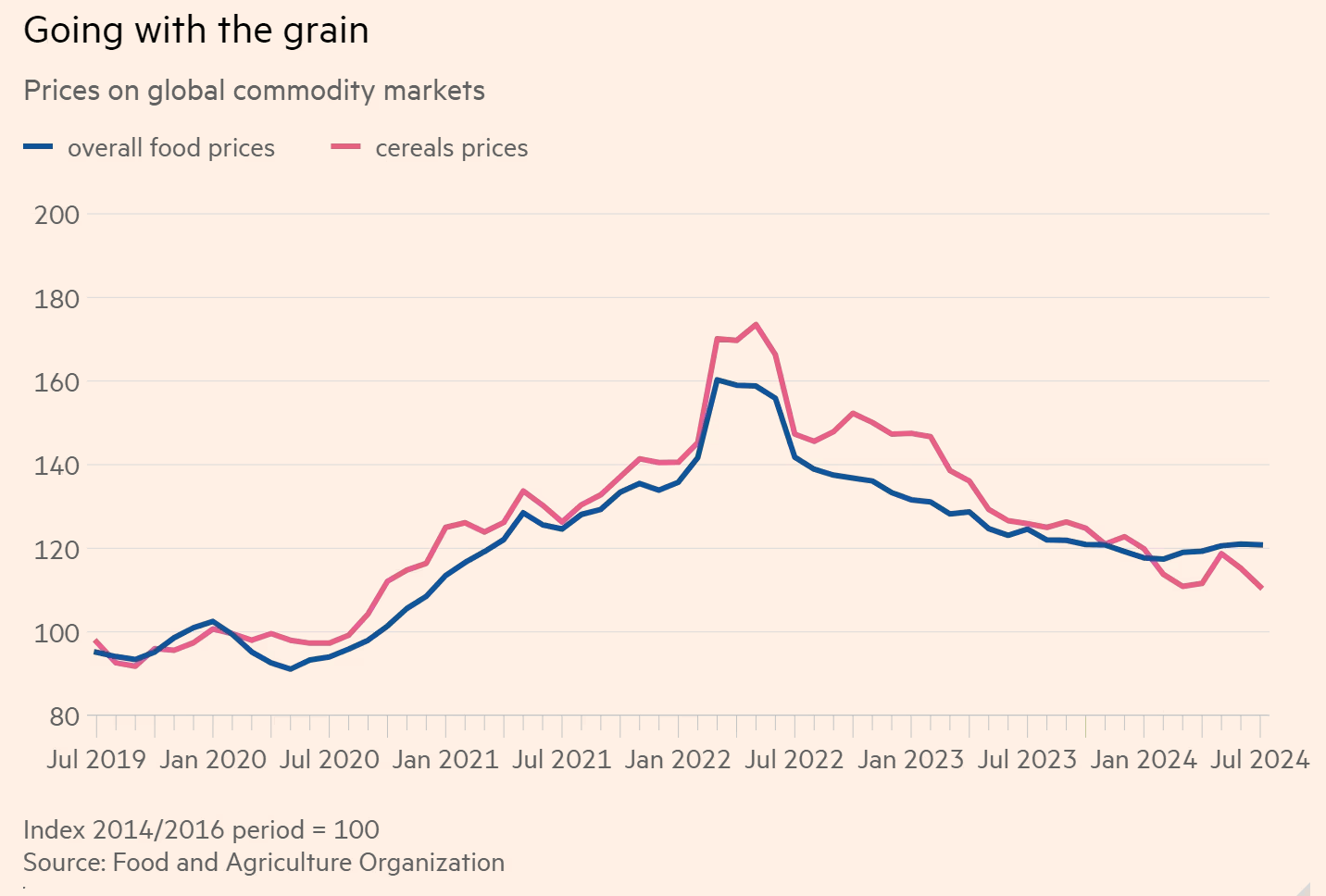
4th September 2024
New study confirms Brazil’s plummeting poverty rate
The Brazilian Observatory for Inequality study has found that the number of Brazilians living in extreme poverty dropped by 40% between 2022 and 2023. A similar study by thinktank Fundação Getulio Vargas reported a 50% decline in poverty between 2021 and 2023. Both studies used federal data and attributed the decline to Lula's Bolsa Família financial aid program. Brazilian Report
Mexico enshrines right to 'adequate' food
Mexico’s new “General Law on Adequate and Sustainable Nutrition” prioritises the right to nutritious, safe, sufficient, quality, and culturally appropriate food. It also guarantees elementary school students have access to free or affordable meals at school and aims to reduce food waste. Food Politics
China’s war on air pollution yields 'tremendous' results
Since the government launched its multi-million dollar initiative to reduce air pollution in 2014, overall particulate pollution levels have declined by 41%. In Beijing-Tianjin-Hebei (BTH), the most polluted region in Mainland China, particulate levels declined by 45% between 2014 and 2022. The average Chinese citizen can expect to live two years longer thanks to these improvements. AQLI

India is a model for global tuberculosis control
Increased funding and community efforts across India have led to significant progress in controlling the world’s top infectious-disease killer. Innovative screening and treatment methods, shorter drug regimens, and the introduction of portable, AI-assisted X-ray equipment, have improved TB detection and treatment completion rates. New York Times 🎁
Poland announces new guidelines reaffirming legality of abortion
Previously, abortion was only possible in the case of a pregnancy that was the result of rape or incest or in a situation of extreme danger to a pregnant woman's health. The new guidelines now say that a recommendation by one specialist doctor, including a cardiologist, endocrinologist or psychiatrist, is basis enough for a woman to obtain a legal abortion in hospital. Euronews
Declines in stillbirths and neonatal and infant mortality in England
The Office for National Statistics says the infant mortality rate has declined from 6.3 deaths per 1,000 live births in 1993 to 3.9 today, and the neonatal mortality rate has fallen from 4.2 deaths per 1,000 live births to 2.7. Stillbirth rates have also fallen since 2005. The UK government is aiming to achieve a 50% reduction in stillbirth and neonatal mortality rates in England by 2025. Nuffield Trust
Efforts to improve sanitation in Zambia’s capital exceed expectations
The Lusaka Sanitation Project, a public-private partnership, has improved sanitation for approximately 345,000 people. It has also enhanced faecal sludge management for 263,898 people, and expanded the sewer network by 117 km. These efforts have resulted in a reduction in waterborne diseases and improved environmental hygiene. World Bank
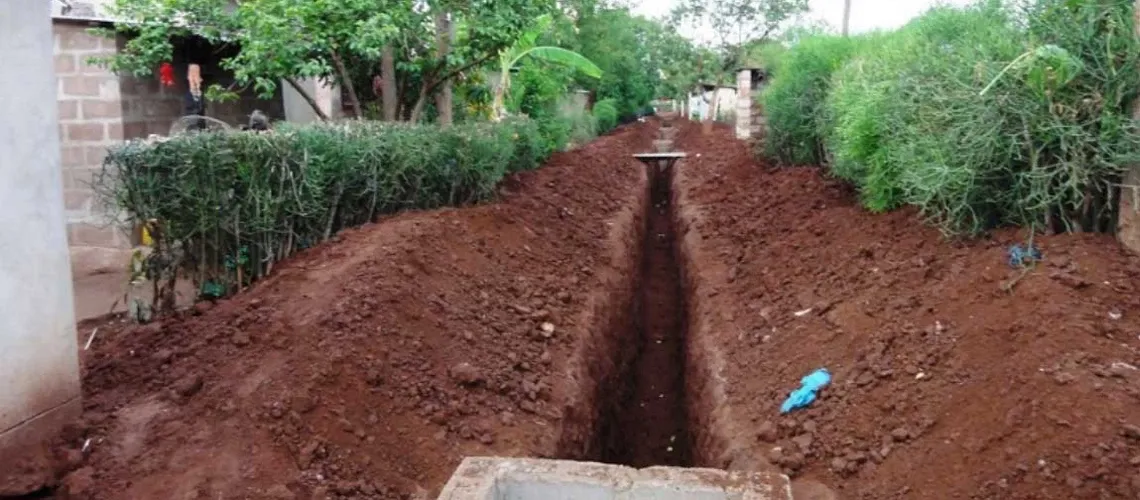
France wants to give teens a digital pause
The government is trialling a ban on mobile phones for pupils up to the age of 15 across 200 schools, following the publication of a 140-page report that concluded that the “hyper” use of phones was not only bad for children but also for “society and civilisation”. If successful, the trial could be rolled out nationwide from January 2025. Guardian
Cigarette smoking in the United States is at an 80-year low
When Gallup first asked about cigarette smoking in 1944, 41% of U.S. adults said they smoked. In the most recent Consumption Habits poll, 11% of U.S. adults say they have smoked cigarettes in the past week, matching the historical low of 2022. A major reason for the decline is that cigarette smoking has plunged among young adults, previously the most likely age group to smoke. Gallup
China, United States hold talks in bid to start normalising relations
U.S. National Security Adviser Jake Sullivan held wide-ranging talks with General Zhang Youxia, Vice Chairman of the Central Military Commission, as part of a three-day trip to strengthen communication between the world powers on issues ranging from Taiwan, to Russia and Gaza. “It’s rare that we have the opportunity to have this kind of exchange.” Aljazeera
More good news you didn't hear about
- No country in the world today has a higher fertility rate than it did in 1950.
- Health authorities have launched an ambitious polio vaccination campaign in Gaza to vaccinate 640,000 children under ten.
- An experimental malaria vaccine has demonstrated long-term protection for pregnant women for the first time.
- An aerial piping system in Nairobi, Kenya has drastically reduced waterborne illnesses by providing clean water to 40,000 people.
- The average American worker is out-earning inflation by $1,400 a year, as median weekly earnings have climbed 24% since 2014.
- Biden’s IRA and CHIPS Acts are supercharging manufacturing construction and clean power deployment, while reviving public investment.
- The real immigration crisis? Not enough immigrants.
- US data consistently shows a decrease in crime and that America schools have become less violent since the end of the pandemic.
- Nigeria’s president has announced plans to expand the provision of school meals from 10 million to 20 million children by 2025.
- The School Meals Coalition, a global organisation founded in 2021 that promotes free school meals, just signed up its 100th country.
27th August 2024
A 'liberal, democratic, non-discriminatory, non-sectarian Bangladesh'
Following the 'people's victory' after student protests in July, the country's new caretaker leader, Nobel Prize winner Muhammad Yunus, has called for a 'new Bangladesh', promising free, fair, and participatory elections and emphasising the role of citizens in deciding the government’s fate. It's still early days—but if even half those promises are met, it will be a huge victory for democracy. Time
US cancer death rates have fallen by a third since 1999
A new CDC report has found that cancer death rates dropped from 200.7 per 100,000 people in 1999 to 142 per 100,000 in 2022. This equates to roughly three million additional Americans alive today due to reduced cancer death rates over the past two decades. The decrease is credited to advances in treatment, technological innovations, and lower smoking rates. Baltimore Sun
Ethiopia and UNICEF partner to fight childhood stunting
The health ministry has successfully piloted an Enhanced Community-Based Nutrition (eCBN) programme, in which village health leaders monitor each household’s health and nutrition and provide health check-ups for young children, as well as counselling and nutritional food demonstrations for new parents. The programme is now being rolled out nationwide. UNICEF
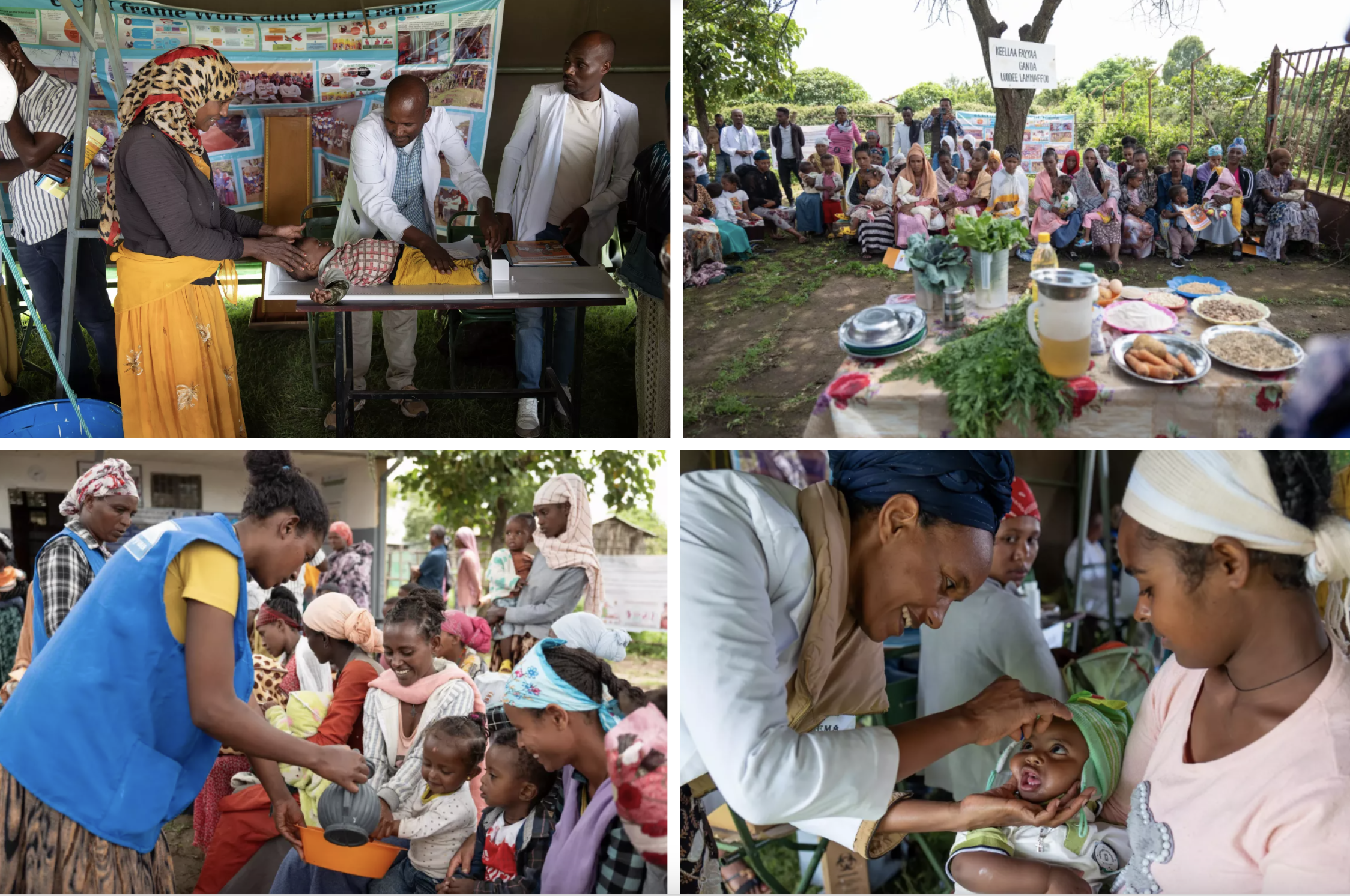
Tanzania and Laos make major strides in malaria fight
In Tanzania, a collaborative effort between the Tanzanian government, the U.S. President's Malaria Initiative (PMI), the Global Fund, and various malaria stakeholders has cut malaria prevalence from 14% in 2015 to 7% in 2022, with a goal of eradication by 2050. Meanwhile, Laos has reduced malaria cases by over 90% in the past decade and aims to eliminate the deadliest malaria parasite by 2026.
Syria is mass-vaccinating millions of children missed during COVID-19
The Ministry of Health, in collaboration with WHO, UNICEF, and Gavi, has deployed over 7,500 workers to vaccinate more than 300,000 children and screen two million children under the age of five. Using both mobile and fixed vaccination centres, vaccinators focus on building trust within communities. This is the second phase in Syria, following a successful first phase in April. UNICEF
The fight to protect abortion rights in the United States ramps up
Ballot measures on abortion rights have succeeded beyond their proponents' greatest hopes, creating a mighty political movement. Pro-choice advocates in Nebraska have now collected enough signatures to put abortion-rights measures on the ballot, meaning that ten states will have an opportunity to enshrine the constitutional right to abortion this November. New York Times 🎁
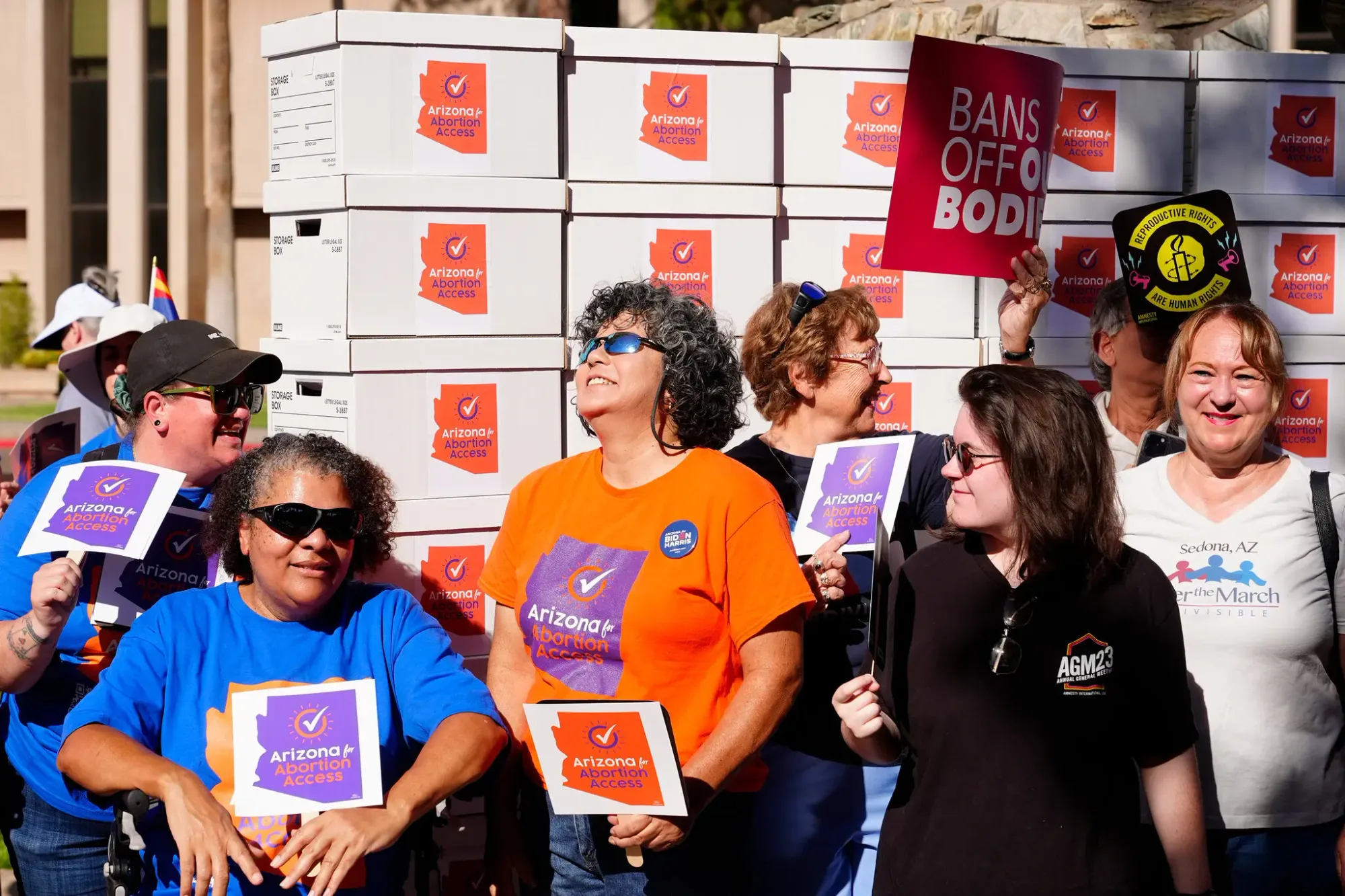
Indonesia is planning the world's largest free school meals program President-elect Prabowo Subianto, who will take office in October, has pledged to provide free school lunches and milk to 78.5 million students at 400,000 schools nationwide. A trial run that began in January, offering one free meal a day to 16 schools in West Java, has already been well-received, with parents welcoming the financial relief and teachers observing better student outcomes. Straits Times
Huge native title claim recognised in Australia
A federal judge has granted native title rights to the Ngemba, Ngiyampaa, Wangaaypuwan, and Wayilwan peoples over 95,000 square kilometres of land in New South Wales, one of the largest native title claims in Australian history. The title holders hope the recognition will help preserve their culture and traditions for future generations. ABC
Mexico’s murder rate continues to plummet
National statistics agency INEGI reported that homicide rates have dropped to their lowest level since 2016. Government statistics confirm this trend, with the Ministry of Security and Citizen Protection recently announcing a 2% decline in intentional homicides compared to 2023, 9% compared to 2022, and a 17% decrease compared to 2020 and 2019.
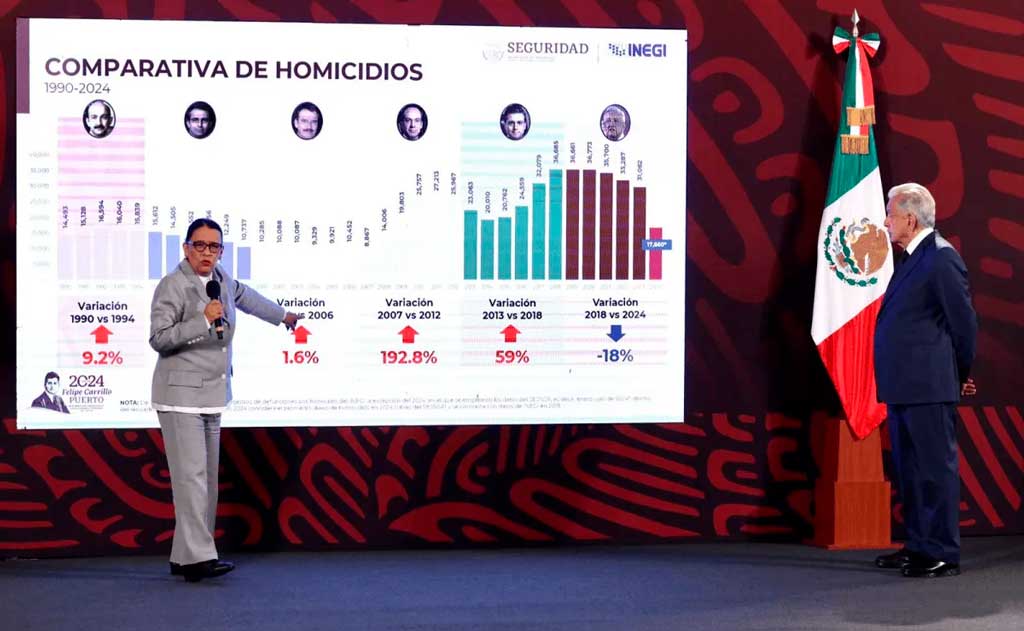
More good news you didn't hear about
World Food Programme trucks have started delivering urgently-needed food to 500,000 people in Darfur, Sudan, following the reopening of the Adre border.
Nearly 90% of TB cases in Uganda are now screened, thanks in part to portable X-ray systems powered by AI and solar, able to screen 150 people a day.
Life expectancy in sub-Saharan Africa has risen from 56 to 61 years since 2010, due to advancements in TB and HIV treatment.
The overall US death rate decreased by 6% in 2023, driven by a steep drop in COVID-19 deaths.
Oregon now has a free and voluntary programme that offers home visits from a registered nurse for any family with a new baby.
Ten charts that explain how schools in America have become less violent since the end of the pandemic.
Pakistan successfully conducts a large-scale emergency typhoid immunisation campaign in Karachi and Hyderabad.
A separate vaccination campaign to curb polio cases will launch in September on both sides of the border between Afghanistan and Pakistan.
Kenyan hospitals are successfully promoting breastfeeding to reduce infant and child mortality.
Cape Town, South Africa, has set a national record for the largest single-year infrastructure spend, focusing on water and energy security, public transport expansion, and affordable housing.
A recent story about air pollution in The Guardian pretty much nails the entire vibe of Fix The News: yes, there are problems, but there are also reasons for hope.
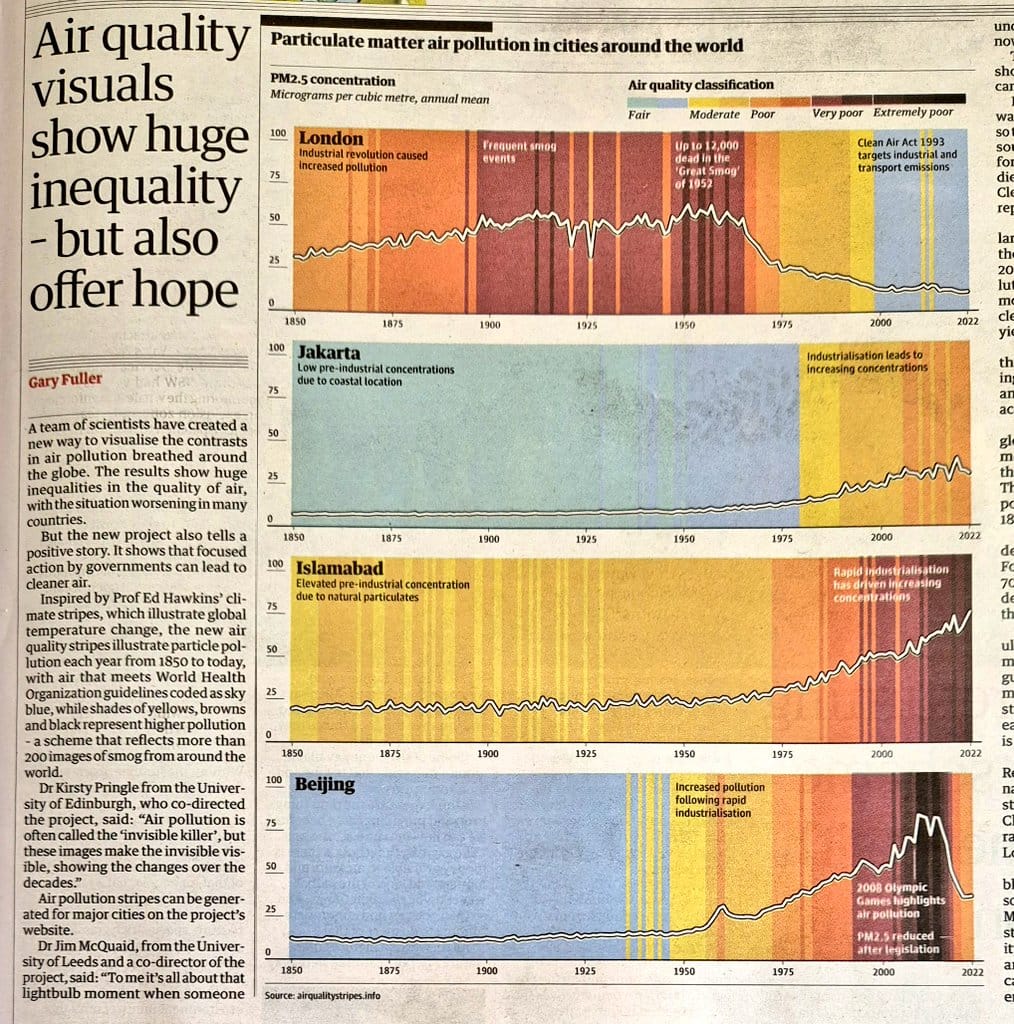
21st August 2024
Global inequality is falling between and within countries
It's generally accepted that while inequality between countries has fallen in the last few decades, inequality within countries has risen. New research by economists from Columbia University and the Federal Reserve Bank Of New York now suggests that the situation is even better - that if you combine tax data from rich countries, and unadjusted household surveys from poorer ones, within-country inequality has been falling for the better part of a decade, if not more. CEPR
Our message is an optimistic one. Not only has inequality fallen dramatically across countries, as has been recognised now for decades, but it has also stopped rising and started declining on average within countries as well. Both within- and between-country inequality are helping global inequality decline. World poverty is also declining rapidly for a large set of reasonable poverty lines and faster than estimated by the World Bank.
Guinea officially eliminates maternal and neonatal tetanus
It's the 49th out of 59 priority countries to achieve this milestone. International partners such as UNICEF have supported the government in making vaccines available on a large scale. Community awareness campaigns have also been crucial in encouraging women of childbearing age to get vaccinated regularly. UNICEF
Teen girls’ mental health improving in the United States
The CDC’s biannual Youth Risk Behavior Survey has found that the percentage of girls reporting extreme depressive symptoms dropped from a high of 57% in 2021 to 53% in 2023. Researchers say these improvements can be partly attributed to an increased focus on getting teenagers earlier access to mental health services. NYT
Behold a world of plenty: abundant harvests, lower food prices
Global crop supplies are surging, driving prices much lower than in 2022-2023. The Bloomberg Commodity sub-index for grains and oilseeds has dropped to a four-year low, down 50% from its 2022 peak after Russia invaded Ukraine. Compared to a decade ago, 2024-25 is projected to see global harvests up 10% for wheat, 15% for corn, 30% for soybeans, and 10% for rice. Bloomberg
Scott Irwin, a veteran agricultural economist at the University of Illinois in Champaign, about two hours drive south of Chicago, put the statistics into a very graphic description of the overgrowth: “jungle-like.”
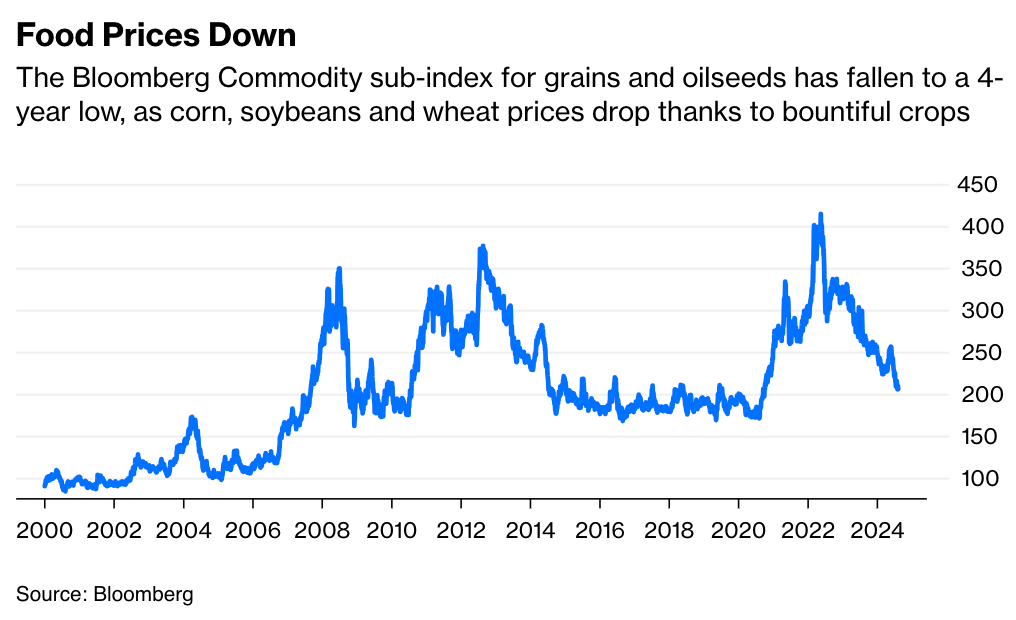
China recognises that a child can have two mothers for the first time
A court in Beijing has ruled that a mother named Didi should be allowed monthly visits with the child she gave birth to in 2017. Didi has been in a prolonged battle to gain shared custody of her daughter, who currently lives with Didi’s estranged wife. LGBTQ+ campaigners have hailed the visitation agreement as a milestone, as it sets a precedent of two mothers sharing parental custody. Guardian
Contraception allows African women more reproductive autonomy
The number of women in sub-Saharan Africa using modern contraception has nearly doubled over the past decade to 66 million. Social media has enhanced reproductive knowledge, even in remote areas, and lower-cost—and, importantly, discreet—contraceptives like implants and injections are more readily available. NYT
Medicare negotiates prescription drug prices in US for first time
The White House has secured new, lower Medicare prices for ten of the most costly drugs, potentially saving billions of dollars a year for taxpayers and beneficiaries. The reductions, which range from 38% for the blood cancer drug Imbruvica to 79% for the diabetes drug Januvia, take effect in 2026. 'No one should be forced to choose between filling their prescriptions or filling their grocery carts.' NPR
Kenya has transformed its health service delivery system
According to the 2023 Health Labour Market Analysis, the country has doubled its health workforce in the last ten years to almost 190,000 active health workers, including nurses, midwives, doctors, surgeons, and other specialists. The country currently produces approximately 8,200 healthcare workers annually. By 2031, the total is projected to climb to over 270,000. WHO AFRO

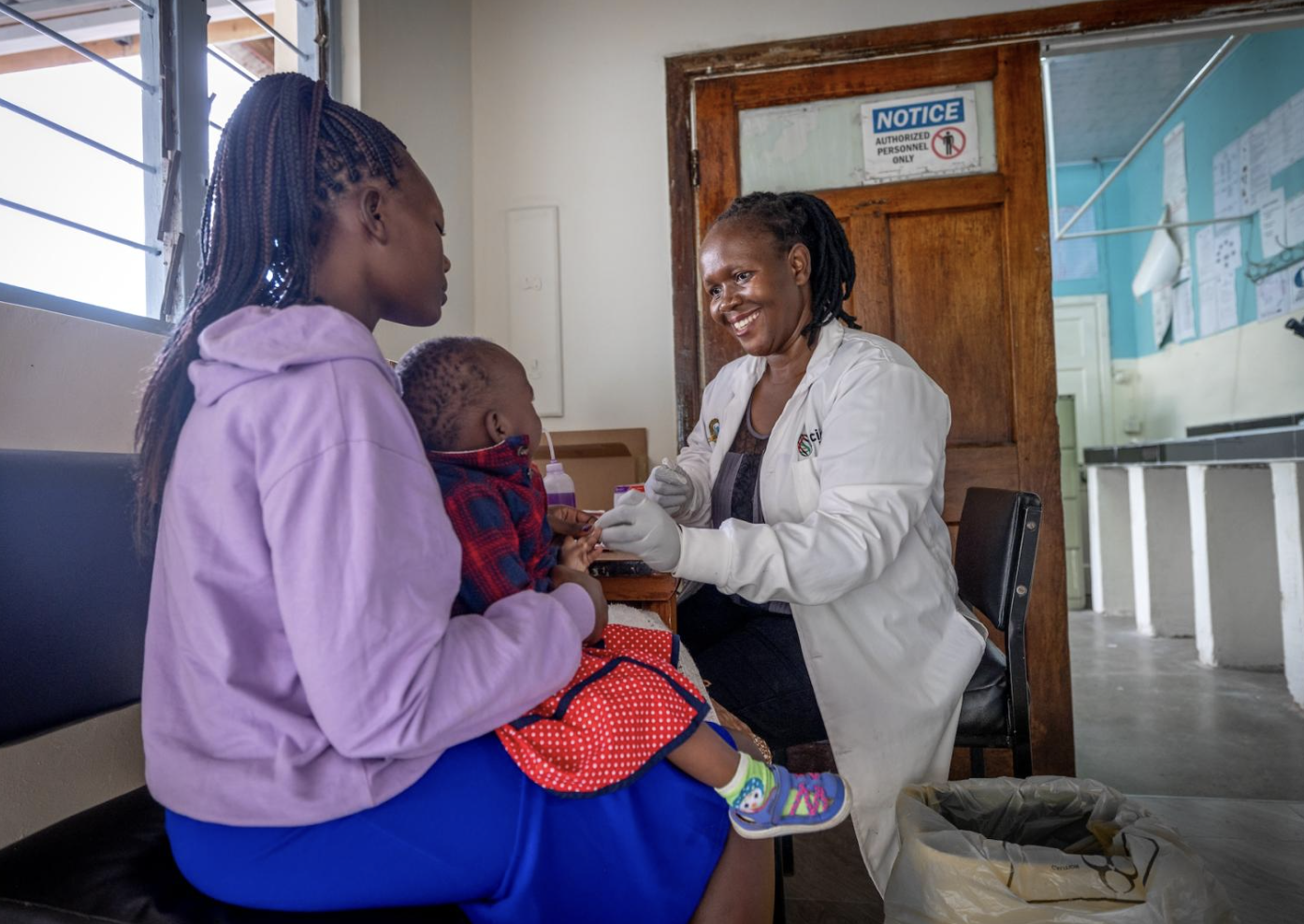
Uzbekistan sets ambitious poverty targets
Since 2020, the national poverty rate has decreased from 17% to 11%. The government intends to reduce it to 7% in the next three years through systematic measures, including boosting entrepreneurship to create jobs and allocating significant annual funding to poverty-stricken areas, along with increased public oversight of individual support programs. Times of Central Asia
Thailand has halved teenage pregnancies
The public health ministry reported that teen births among 15- to 19-year-olds have dropped from 53.4 per 1,000 in 2012 to 21 per 1,000 in 2023. The new goal is to reduce this to less than 15 per 1,000 by 2027. The ministry also plans to expand campaigns on condom use and STD prevention among teenagers. The Nation
Poland takes step towards easing abortion rules
In 2020, the former far-right Law and Justice (PiS) party imposed near-total abortion restrictions. However, in December 2023 a new coalition government formed by former opposition parties took office. A parliamentary commission has now suggested decriminalising abortion within the first 12 weeks of pregnancy. This proposal will be considered by parliament later this year. Politico
Sorry Fox News: violent crime levels in America continue to fall
A new report from the Major Cities Chiefs Association shows that violent crime levels and violent homicides have dropped by 6% and 17%, respectively, in 69 cities in the first half of 2024, compared to the same period last year. Columbus, Ohio, witnessed the biggest drop, at 41%. Experts suggest that reductions in stress and a return to normality after COVID-19 are part of the explanation. Vox
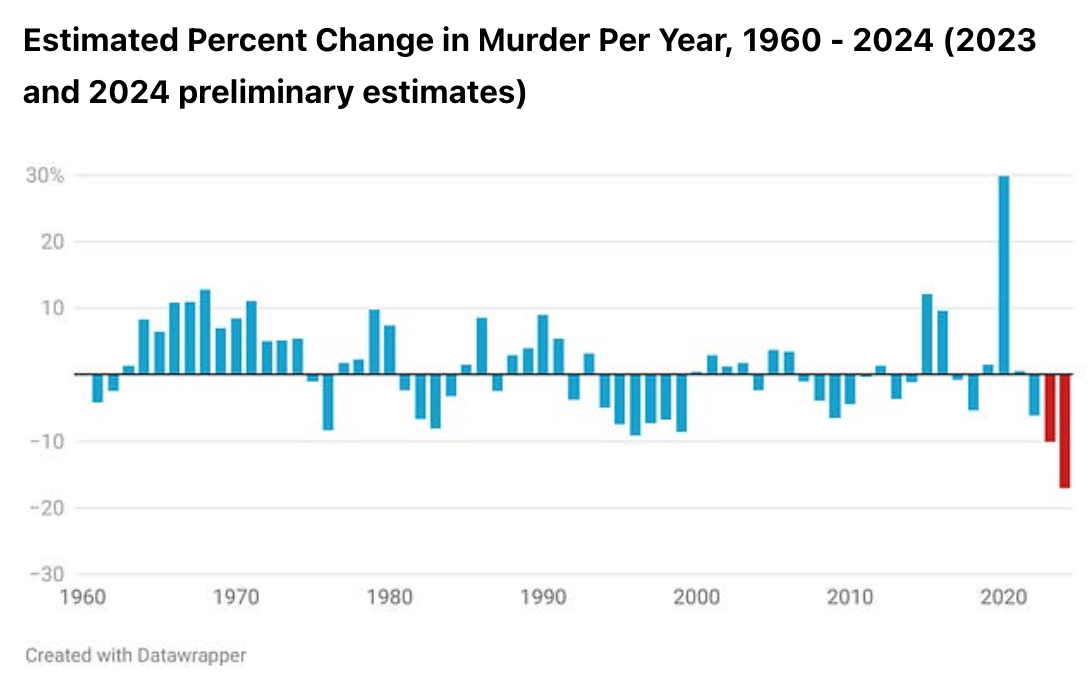
More good news you didn't hear about
The CDC estimates that childhood vaccines in the United States have saved $540 billion in healthcare costs over the last three decades, on top of the 1.1 million deaths they’ve prevented. Pro-choice advocates in Colorado have collected enough signatures to put an abortion-rights measure on the November ballot, joining Arizona, Missouri, Florida, Maryland, Nevada, New York, and South Dakota. Opioid deaths in the US have finally started to fall. Boeing dramas aside, global aviation safety continues to improve, with the fatality rate falling to 1 out of every 13.7 million passengers boarding globally in the 2018-2022 period. Last year, 11 of the Philippines’ 18 regions recorded a significant decrease in poverty. In India, state-run free bicycle distribution schemes have sparked a quiet revolution for schoolgirls. Ukraine has legalised cannabis for medical, industrial, scientific, and scientific-technical purposes. In the WHO's Pan American region, coverage of the HepB-BD vaccine increased from 23% to 65% between 2000 and 2024. Ethiopia has achieved a sixfold reduction in its tuberculosis death rate—huge for a country that had the world's highest TB rate in the 1980s. Pakistan has announced a nationwide hepatitis C eradication programme. HPV vaccination rates among Malawi’s schoolgirls are finally rebounding post-pandemic. Here are five ways scientists are giving humans the edge in the antibiotic resistance arms race. Islamabad has launched a bus ride scheme to give women and girls safe, reliable, and free travel options.
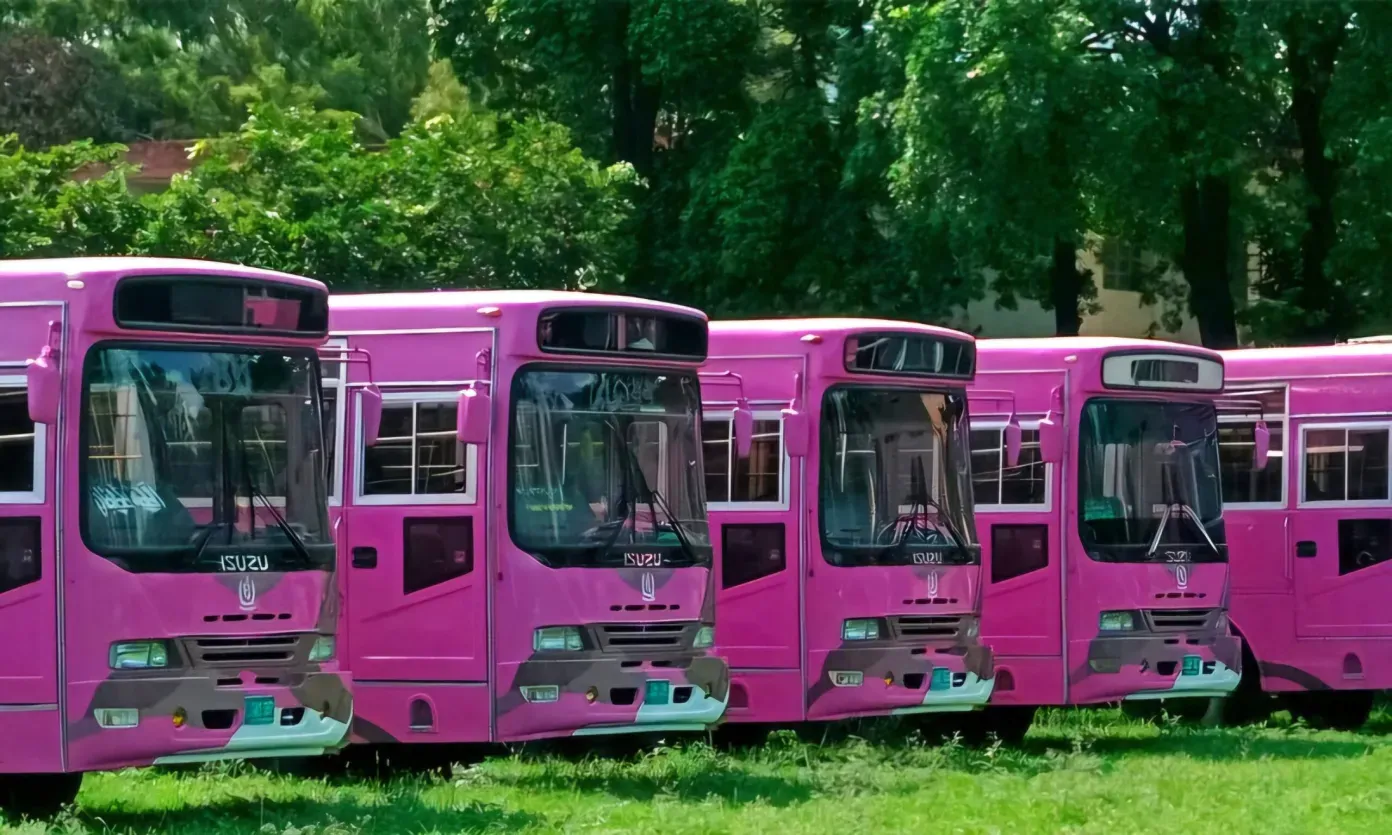
9th August 2024
UNESCO highlights significant increase in children in school
The global number of children and adolescents who are not in school across primary and secondary education has dropped from 390 million in 2000 to 244 million in 2023. That’s a reduction of nearly 40%—during a period in which the global population of children has grown. Historically, more girls have been out of school than boys, but the gender gap has nearly closed. Our World in Data
The Americas have an impressive disease elimination record
The WHO's Pan American region eliminated smallpox in 1980 and polio in 1994, and in the last decade, rubella, congenital rubella syndrome, and neonatal tetanus. This year, 19 out of 35 countries celebrated being malaria-free, and 11 countries have eliminated mother-to-child transmission of HIV and congenital syphilis. PAHO
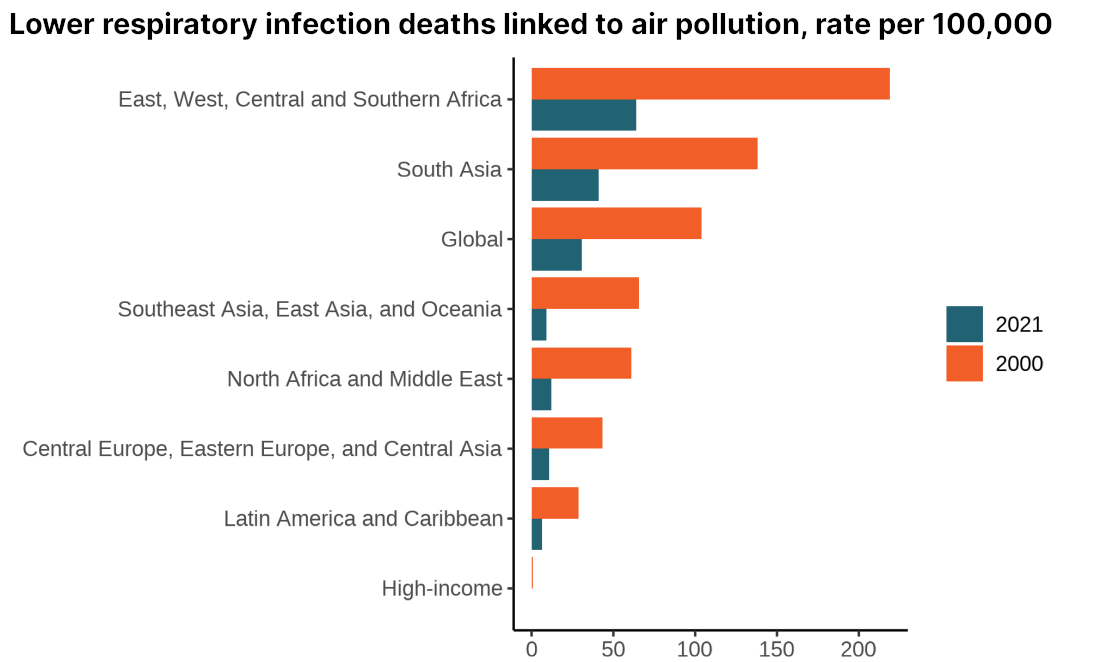
Major strides in global immunisation achieved in 2023
In 2023, 69 million children received Gavi-supported routine immunisations—more than in any other year except 2019; DTP3 (diphtheria, tetanus, and pertussis) coverage is increasing in Gavi-supported countries in Africa; and cervical cancer vaccination rates for girls in Gavi-supported countries have doubled since 2022. Gavi
Biggest tobacco-producing country raises smoking age to 21
Indonesia has one of the world’s highest smoking rates. A new government regulation, effective immediately, is intended to 'lower prevalence of smokers and prevent early-age smokers.' In addition to raising the smoking age from 18 to 21, it also bans single cigarette sales and sales within 200 metres of schools and playgrounds and heavily restricts selling and advertising on social media. Reuters
A dedicated campaign to eradicate polio in Sierra Leone
Over 4,000 vaccinators recently mobilised to ensure that every child under five in Sierra Leone is reached with two drops of the oral polio vaccine. Using door-to-door vaccinations and fixed vaccination centres in health facilities, vaccinators focus on building trust within communities. Over 3.3 million children under five in Sierra Leone have already been vaccinated against polio this year. WHO
Mozambique adds malaria vaccine to routine immunisations
Thanks to co-financing by the government and Gavi, the country has over 800,000 doses of the R21 vaccine for its 'Expanded Programme on Immunization.' The first phase aims to immunise about 300,000 children in Zambezia Province. International partners such as WHO and UNICEF are assisting with the vaccine's preparation, acceptance, and introduction. Gavi
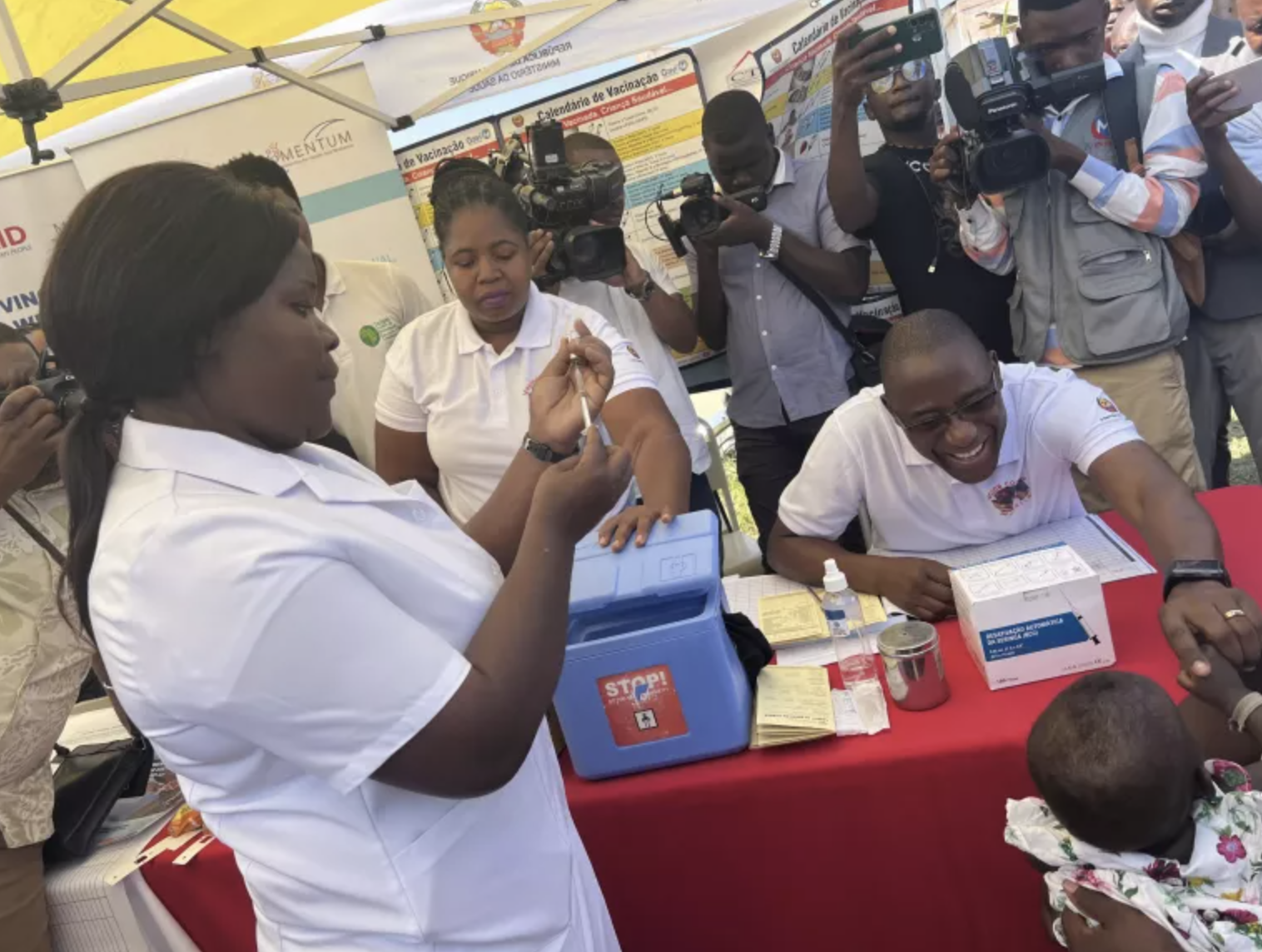
Africa celebrates hard-won gains in education
Across the continent, primary school completion rates have soared from 52% to 67% between 2000 and 2022. High school dropout rates have slowed, with 50% of students finishing lower secondary education (up from 35%), and 33% completing upper secondary education (up from 23%). The number of tertiary education students has skyrocketed from 800,000 in 1970 to over 17 million today. Guardian
Cleaner air brings relief to India’s urban residents
In 2019, the government implemented the National Clean Air Programme (NCAP) to reduce air pollution. Now a Princeton University-led study has recorded significant decreases in fine particulate air pollution emissions in six cities between 2017 and 2022, with four cities seeing reductions of over 20%.
People power changes lives
Amnesty International has published a lengthy list of human rights victories that occurred in the last six months—from the release of political prisoners to safeguarding press freedoms, enshrining LGBTQ+ and gender rights, and successfully holding governments to account. To quote Andorran abortion activist Vanessa Mendoza Cortes, 'Our strength is in our solidarity.'
14.7 million fewer people go hungry in Brazil
A new UN report shows that severe food insecurity in Brazil has fallen by a colossal 85% in just one year, from 8% in 2022 to 1.2% in 2023, meaning the country might be removed from the FAO Hunger Map. Celebrating this progress, President Lula has proposed a Global Alliance Against Hunger and Poverty, aiming to foster international collaboration to achieve zero hunger by 2030.
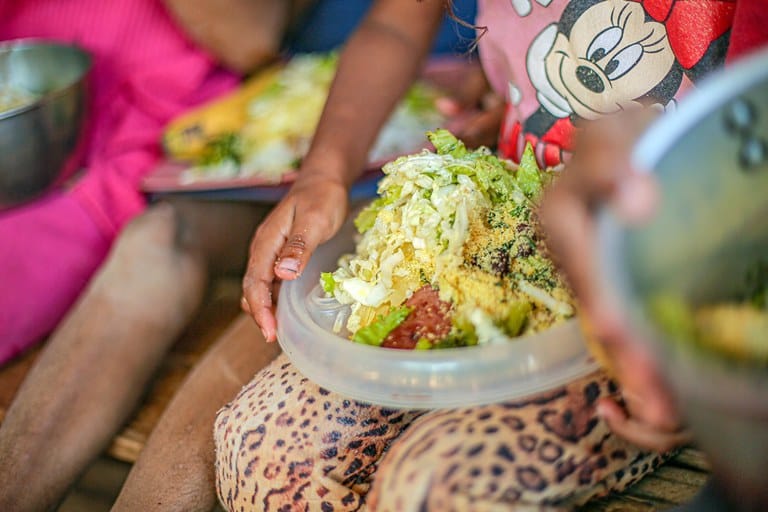
More good news you didn't hear about
Every day of infancy is safer for the world's children than it was a century ago. The world's leading HIV drug also reduces carbon emissions. Cancer researchers worldwide are hailing several new breakthroughs, including less-invasive liquid biopsies and the world’s first cancer treatment injections. Türkiye receives $600 million in financing to rebuild after the 2023 earthquakes. A new UN report finds anti-corruption strategies in Nigeria are working. Gavi strikes again: more than 50 low- or medium-income countries across Asia and Africa can now receive financial aid for the rabies vaccine. A few clapbacks to Fox News-style talking points: crime rates in San Francisco are now below pre-pandemic levels (no, seriously); the first dose of the COVID-19 vaccines reduced cardiovascular events and complications; sin taxes improve health outcomes; inflation rates are falling in 90% of the world's countries. Across southern Africa, over six million people will be better protected against climate shocks. In Guyana, authorities are conducting a mass drug administration campaign to eliminate elephantiasis. Pakistan has increased its exclusive breastfeeding rates by 10%. In Albania, new roads have revitalised local economies and catalysed investment. How the war on drunk driving was won. It's not just London and Paris—Barcelona’s low-emission zone is working too: pollution has fallen to levels last seen at the height of the pandemic (except now the city is back to full activity).
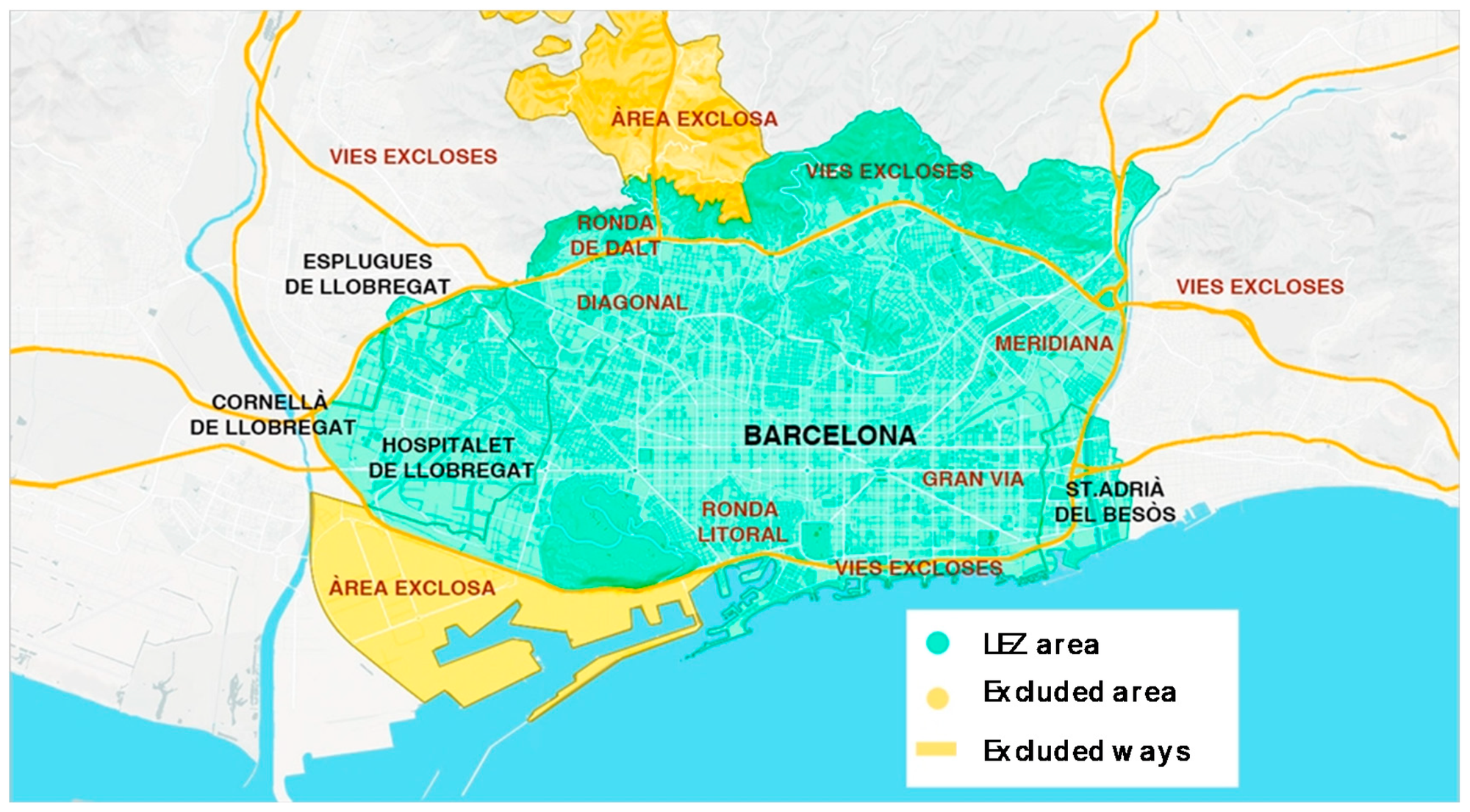
2nd August 2024
UN predicts world population to peak earlier, and lower
A new analysis projects a high of about 10.3 billion people by the mid-2080s—and that the population will fall to approximately 10.2 billion by the end of the century, which is 6% lower than predicted a decade ago. This is also earlier than expected, with UN officials describing it as a 'hopeful sign… [that] could mean reduced environmental pressures from human impacts.' Guardian
Incredible progress on maternal and neonatal tetanus
Since the WHO began its maternal and neonatal tetanus elimination initiative in 1999, neonatal mortality due to tetanus in the 59 priority countries has decreased by 84%. Globally, the percentage of infants protected at birth increased from 74% in 2000 to 86% in 2022, and 47 of the 59 priority countries had achieved full elimination by 2022. WHO
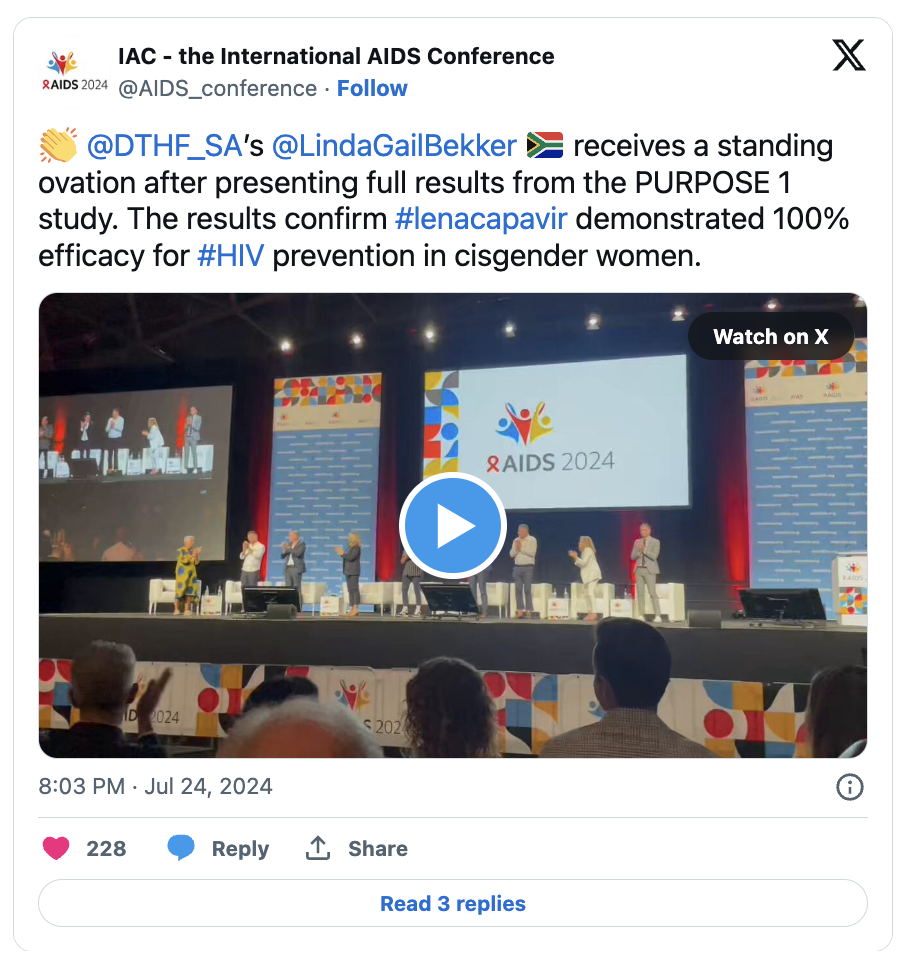
China makes inroads on hepatitis prevention and control
Thanks to a prevention-first, whole-society approach, China's hepatitis B infection rate has continued to fall, especially among children under five, among whom it is now below 1%. Also, the incidence rate of hepatitis A has dropped from 55.69 per 100,000 individuals in 1991 to 1.06 per 100,000 in 2020, and the antiviral cure rate for hepatitis C patients has surpassed 95%. CGTN
G20 nations plan to make the super-rich pay their taxes
At the G20 summit in Brazil, the nations’ finance ministers pledged to 'engage cooperatively to ensure that ultra-high-net-worth individuals are effectively taxed.' Brazilian Finance Minister Fernando Haddad said that 'from a moral point of view, it is important that the 20 richest nations consider that we have a problem, which is to have progressive taxation on the poor and not on the rich.' DW
US crime rates now at their lowest level in decades
'Our crime rate is going up, while crime statistics all over the world are going down because they’re taking their criminals and they’re putting them into our country' (take a guess who said it). Actually, America's violent crime rate is at its lowest level in more than 40 years, and property crime is also at its lowest level in many decades. NYT 🎁
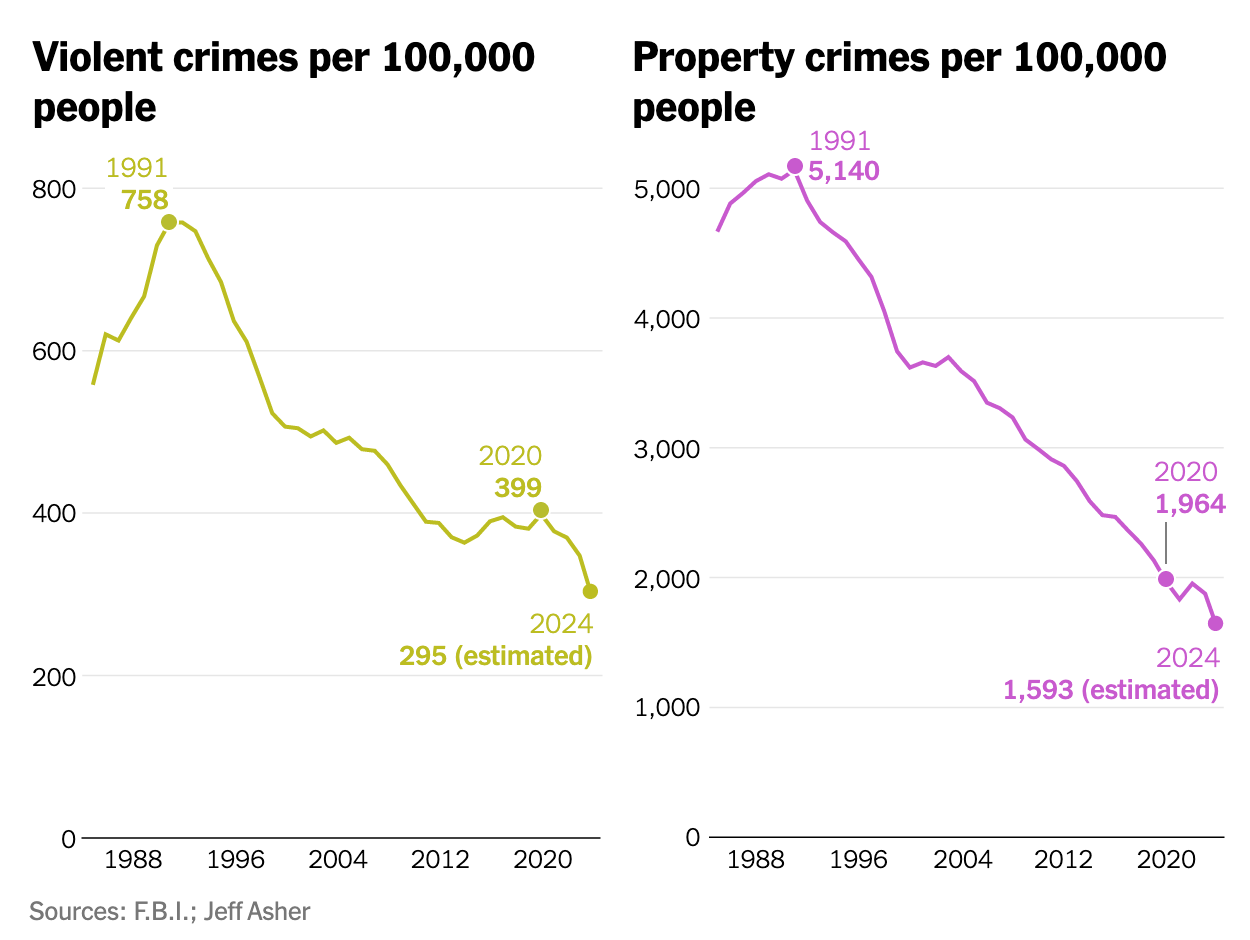
London’s Ultra Low Emission Zone yields results
New data confirm that the air quality in London has dramatically improved in the year since Mayor Sadiq Khan expanded fees on polluting cars, vans, minibuses, and motorcycles driving into the city. Harmful particulate matter and nitrogen oxide emissions are an estimated 20% lower than they would have been had Khan not expanded the zone to outer London in August 2023. NYT 🎁
Bosnia and Herzegovina crosses bridge to a more hopeful future
When the Stari Most ('Old Bridge') in the city of Mostar was destroyed during the Yugoslav Wars in 1993, residents called it 'the saddest day of our lives.' Today, thanks to a decades-long collaboration between Bosnia and Herzegovina and the World Bank’s International Development Association, the bridge is whole once more. World Bank
Progress on ending violence against women in Australia
New data tracking national progress find that the prevalence of physical intimate partner violence has decreased significantly since 1989. Australians’ attitudes towards gender inequality and domestic violence have also improved. In 2023, only 37% of Australian men aged 18-30 felt social pressure to conform to rigid ideals of masculinity, compared to 49% in 2018. Our Watch
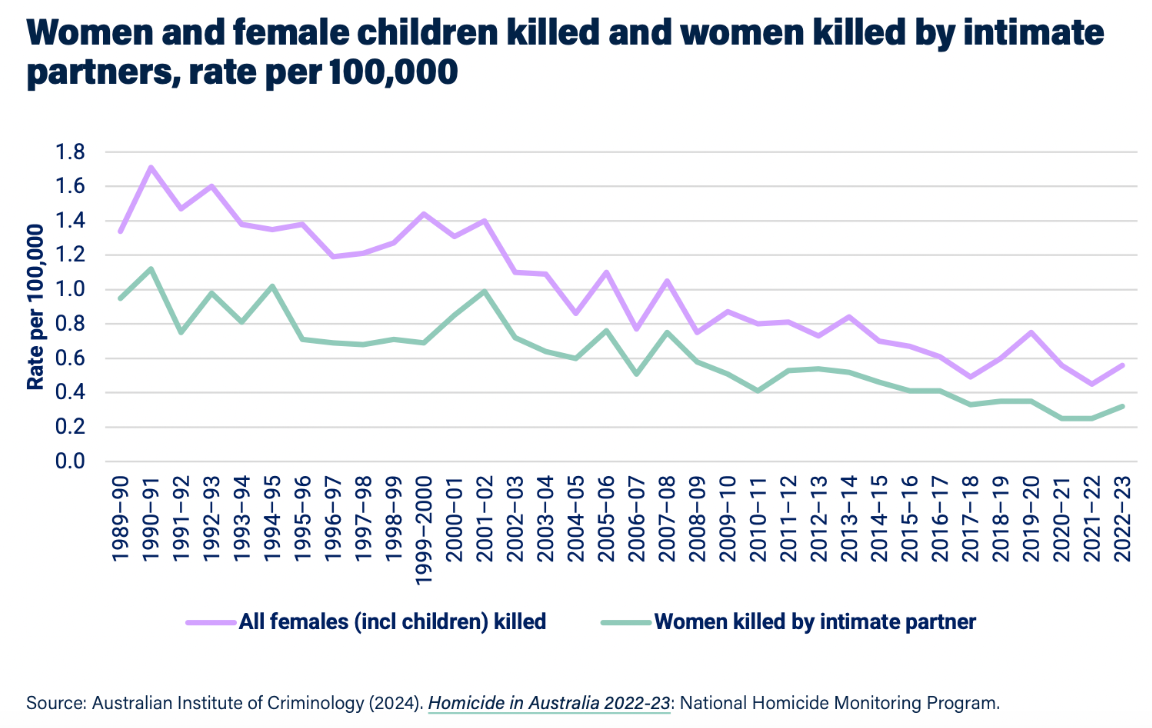
More good news you didn't hear about
More than five billion people around the globe can now read and write. Public health officials in Bangladesh say they're on track to eliminate malaria after witnessing a 96% decline in deaths between 2008 and 2023. The real immigration crisis in Germany? Not enough immigrants. In America, human rights lawyers and activists are holding the line: halfway through 2024, just 41 of the 527 anti-LGBTQ+ bills introduced this year have passed into law. More news from the United States that's not about the election: several states have enacted pay transparency laws to fight gender and racial wage gaps; the overall birth rate for 15- to 19-year-olds declined 71% between 2000 and 2022 (with Latina teens seeing the steepest declines); Michigan's latest education budget includes free community college and preschool programs; and Virginia is laying down plans for cell phone-free education in public schools. Scientists have identified a cause of lupus, potentially paving the way for a cure where none currently exists. HPV vaccination rates among Malawi’s schoolgirls are finally rebounding post-COVID, and in Timor-Leste, 61,374 girls will receive the HPV vaccine thanks to support from international partners.
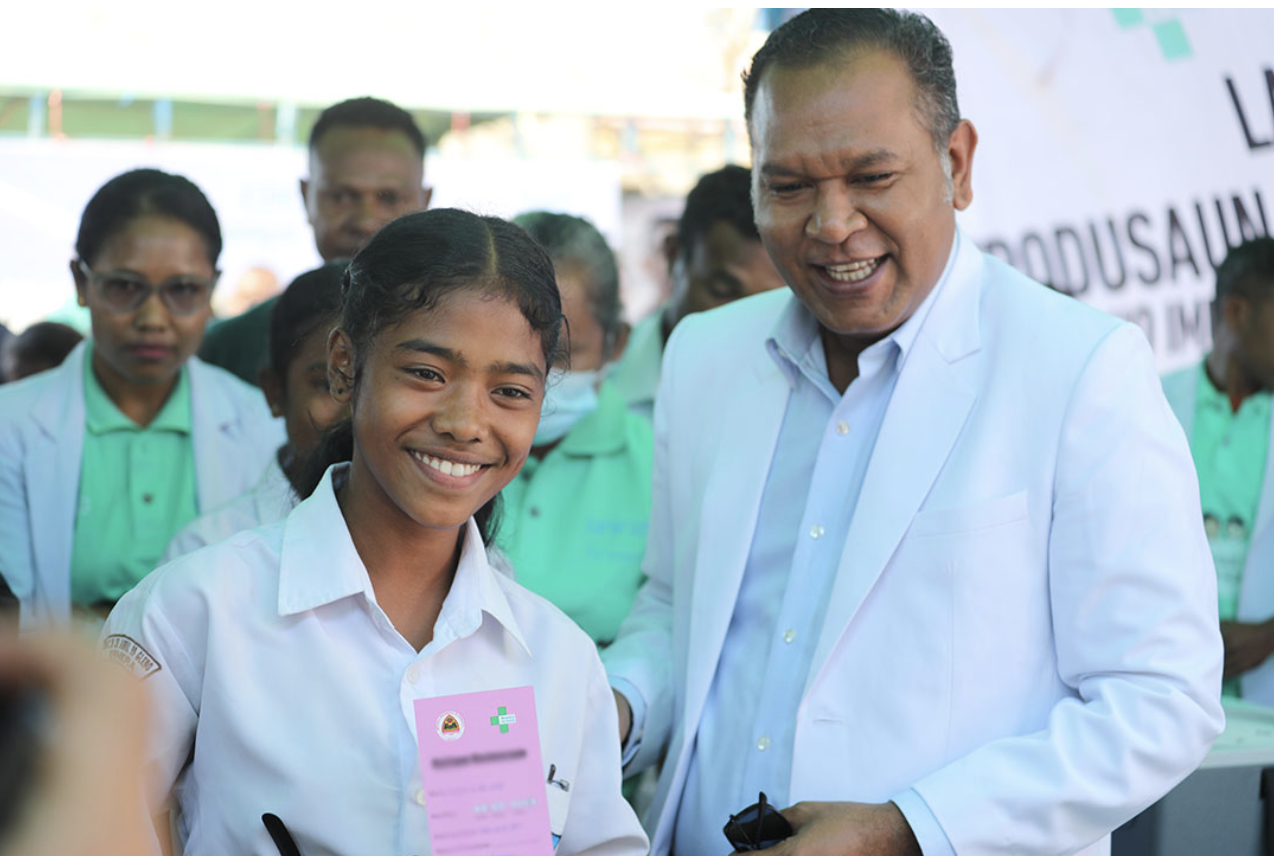
26th July 2024
A century of progress for human rights across all world regions
Ranging from 0 (least rights) to 1 (most), the Varieties of Democracy 'Human Rights Index' examines the extent to which people are free from government torture, political killings, and forced labour and enjoy freedoms of movement, religion, expression, and association. Every region in the world scores significantly higher today than 100 years ago, with Europe leading the charge. OWD
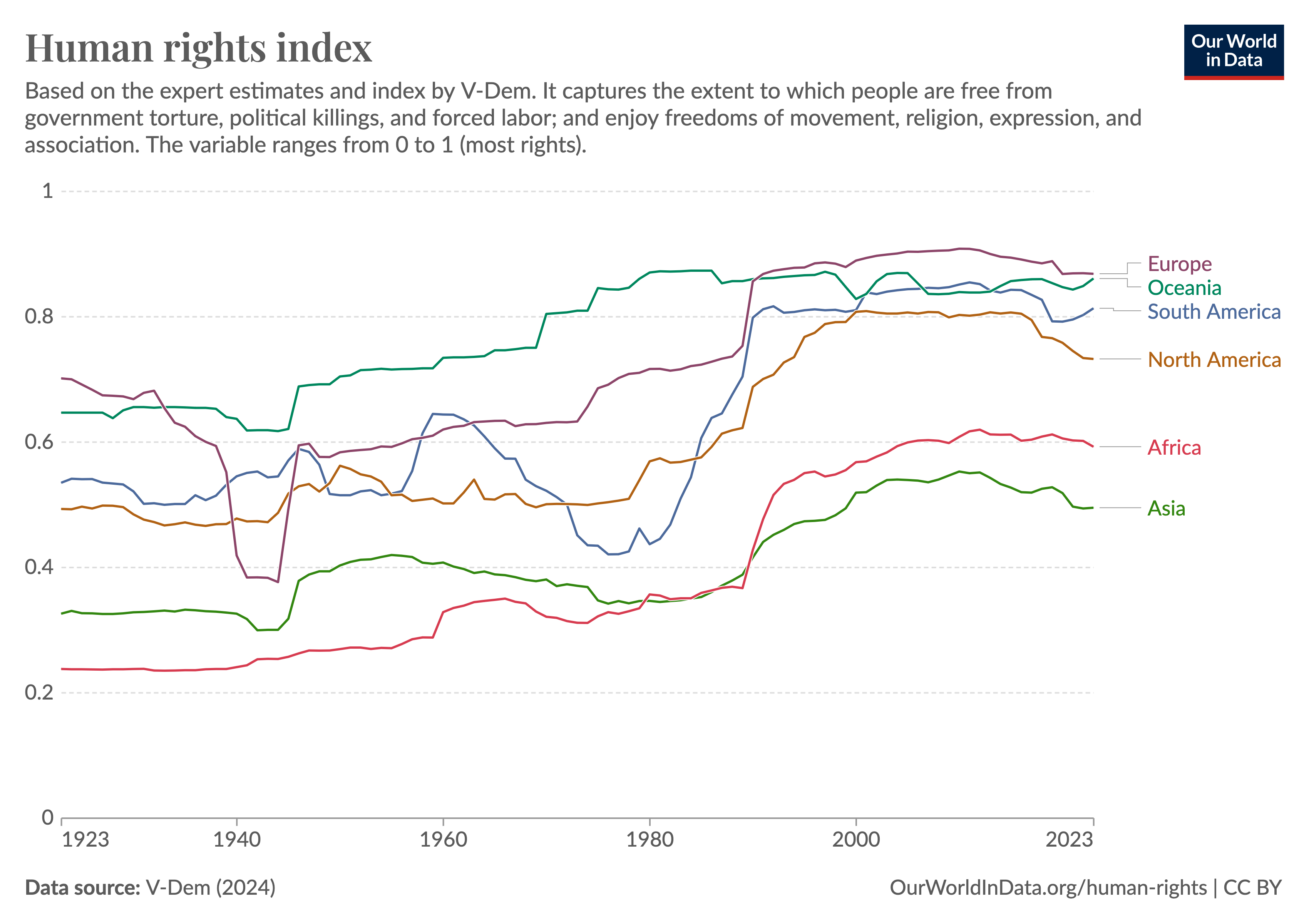
No cases of Guinea worm detected yet in 2024
When the Carter Center began leading the international campaign to eradicate Guinea worm disease in 1986, there were an estimated 3.5 million cases in at least 21 countries in Africa and Asia. During the first three months of this year, not a single case has been detected worldwide. If this continues, we could soon achieve global eradication of the third disease in history. Carter Center
Nepal sees a threefold reduction in childhood diarrhoea
The Nepal Statistics Office reported that the diarrhoea rate for children under five dropped to 11.5% in 2022-23, a threefold decline since the previous fiscal year. Experts have attributed this to a decline in open defecation, increased education and awareness levels, behavioural changes, and, most importantly, an improvement in water and sanitation conditions. Kathmandu Post
UNAIDS says ending AIDS pandemic by 2030 within reach
In 1995, new HIV infections reached a peak of 3.3 million. A new UNAIDS report finds that number dropped by 60% to 1.3 million in 2023, with a record 30.7 million people accessing treatment. There's also been a 69% fall in deaths since 2004, and since 2010, new HIV infections among children have declined by 62%.
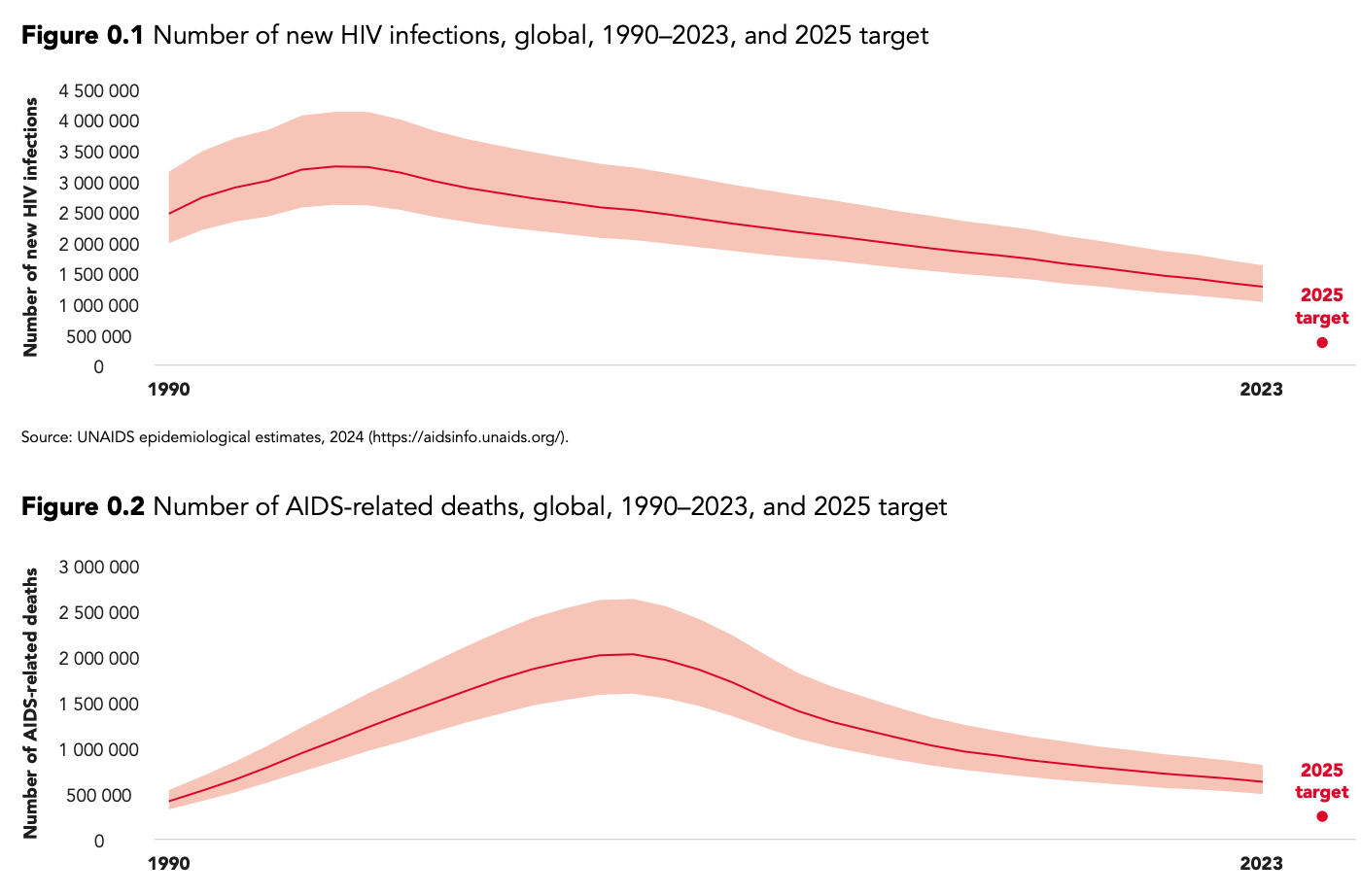
Ecuador will expand successful school meals initiative nationwide
In 2023, the World Food Programme launched a school meals programme for 1,000 children in Ecuador in rural areas with high malnutrition and poverty levels. Almost immediate improvements were recorded, including better academic performance and reduced illness. This year, the program rolls out nationwide, expanding meal provision and diversifying diets for tens of thousands of kids.
2.45 million fewer Filipinos living in poverty since 2021
The Philippine Statistics Authority reports poverty dropped from 18.1% in 2021 to 15.5% in 2023. The Family Income and Expenditure Survey confirmed this trend, recording a 2.3% and 2.6% decrease in poverty among families and the population overall, respectively, in 2023. The declines are attributed to a 22.9% rise in the mean per capita income of families near the poverty threshold since 2021.
Landmark ruling for same-sex couples in South Korea
In 2021, a gay couple filed a lawsuit after the National Health Insurance Service cancelled their spousal benefits. Upholding an earlier decision, the Supreme Court has now ruled that all same-sex couples are eligible to receive the same health insurance benefits as heterosexual couples. LGBTQ+ advocates say the ruling marks the first legal recognition of same-sex unions in South Korea. Reuters

Millions more children are being educated in Zambia
Three years ago the government made education free for all, allowing two million more children to go to state-run schools without having to pay. To tackle overcrowding, the government has pledged to build over 170 new schools and recruit 55,000 new teachers by the end of 2026—of whom 37,000 have already been hired. BBC
New roads in Kazakhstan have dramatically improved quality of life
Since 2009, the World Bank has supported Kazakhstan’s South-West Roads Project, connecting approximately 5.5 million people along the Western Europe–Western China corridor. A new survey shows that 93% of respondents have noticed a higher quality of life post-project due to reduced travel times, lower road user costs, easier access to essential services, and better job and income opportunities.
The Gambia upholds ban on FGM in critical win for women and girls
Lawmakers in The Gambia have rejected a bill that would have overturned a 2015 law against female genital mutilation. The international community has welcomed the decision, which aligns with the country’s commitments to prevent harmful practices against girls and women. The UN has also praised the efforts of grassroots campaigners and activists to prevent the law from being overturned.
Substance abuse among US teenagers drops sharply since 1970s
The National Institute on Drug Abuse has been collecting data on the beliefs, attitudes, and behaviour of young people since 1975 for its Monitoring The Future survey. In 1976, substance use for high school seniors stood at 92% for alcohol, 76% for cigarettes, and 64% for cannabis. By 2021, the figures had dropped by a whopping 39, 59, and 26 percentage points, respectively. Ryan Burge
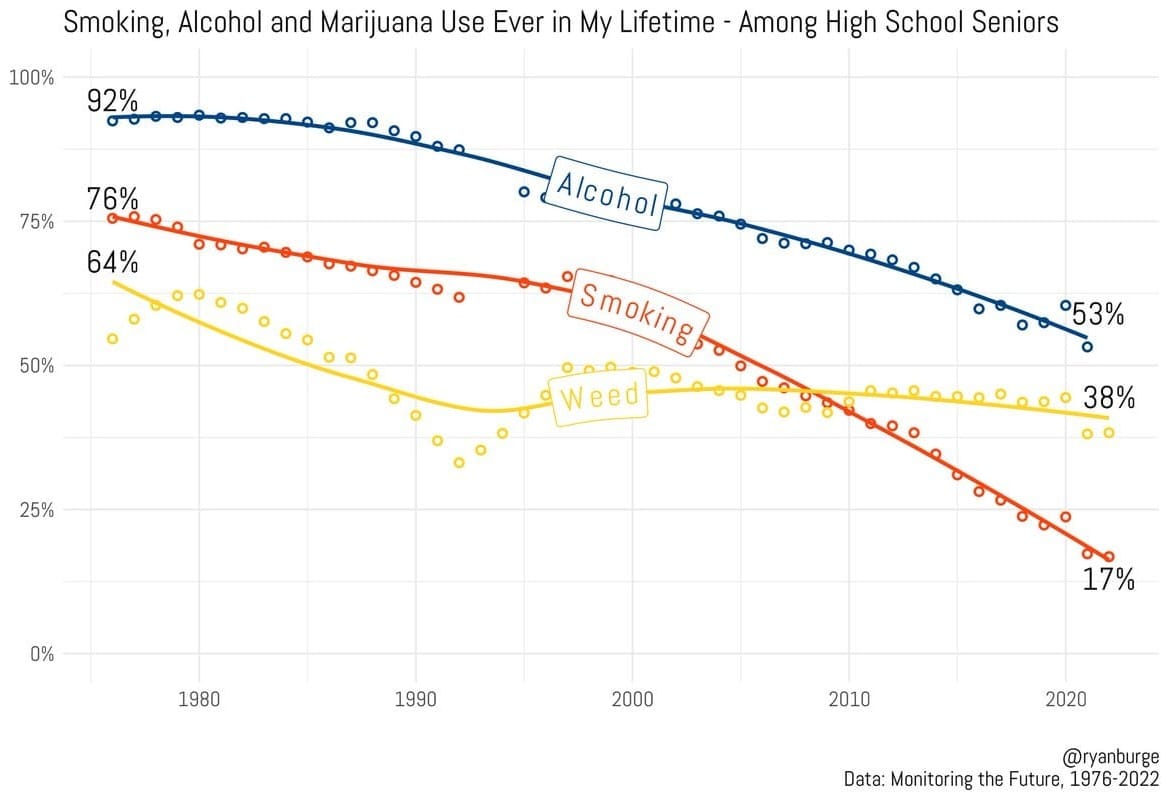
More good news you didn't hear about
The proportion of the world's adults with a net worth of less than $10,000 has plunged from 75% in 2000 to less than 40% in 2023. The percentage of American workers earning under $15 an hour has dropped from 32% to 13% in just two years. The US Internal Revenue Service just collected a record $1 billion in past-due taxes from millionaires. Gavi’s Big Catch-Up begins, allocating 200 million vaccine doses to children missed during COVID-19. Saudi Arabia announces an unprecedented pension reform package, addressing critical issues such as retirement age and maternity leave. Johnson & Johnson agrees not to enforce its patent on critical TB medication in South Africa. The real immigration crisis: not enough immigrants. The Dutch Supreme Court confirms the right to same-sex marriage in the Dutch Caribbean islands of Aruba and Curaçao. In Cabo Verde, poverty levels have fallen from 56.8% in 2001 to 28.1% in 2022. Biden announces another round of student loan forgiveness—in total, his administration has cancelled more than $168 billion in debt for nearly 4.8 million Americans. The US federal government has also approved a series of changes to make flying safer, easier, and more accessible for passengers with disabilities. A project in Uganda is using AI to power ultrasound imaging without the need for specialists, encouraging women to attend health screenings earlier in pregnancy.
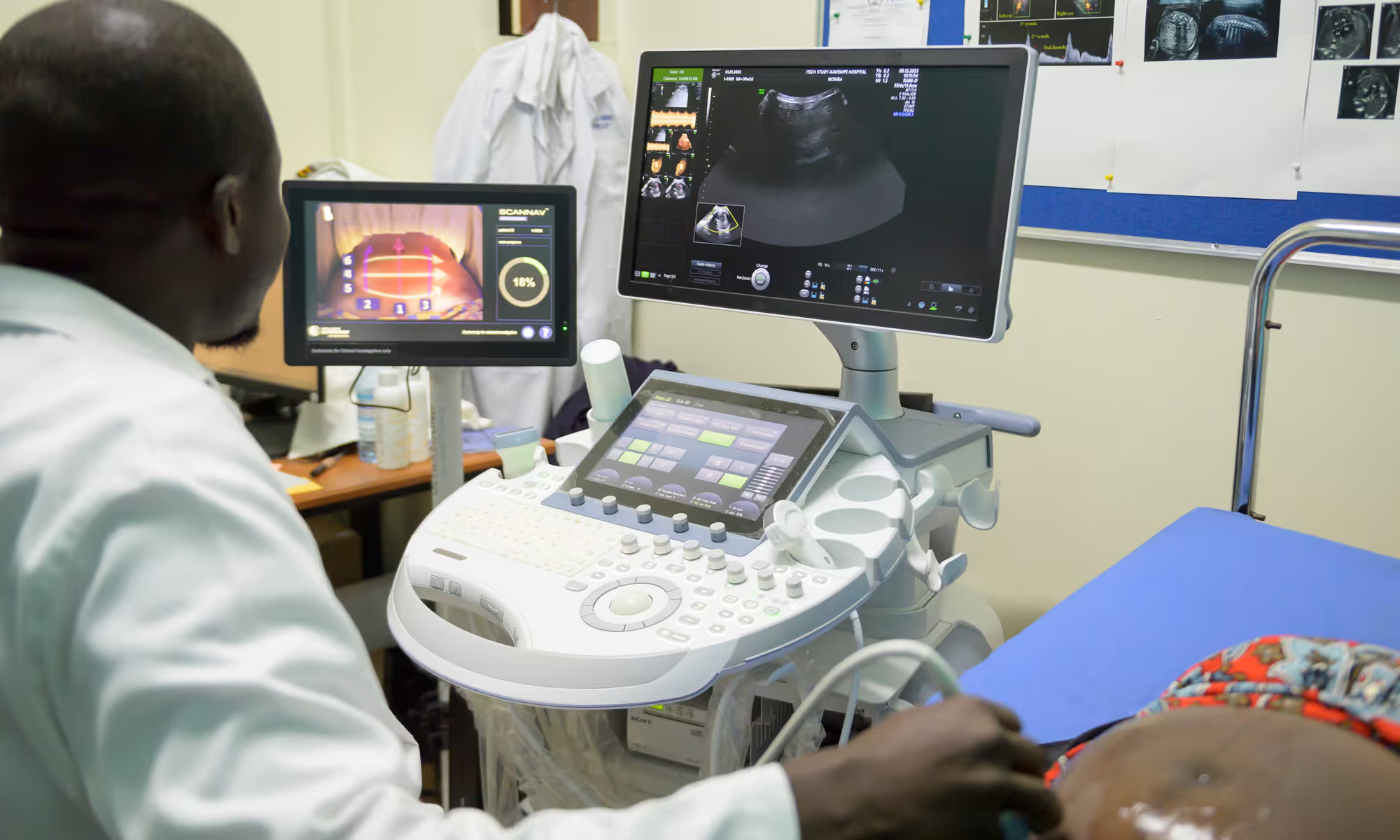
12th July 2024
Three-quarters of countries have now abolished the death penalty
Amnesty International says there was notable progress last year: Malaysia repealed mandatory death penalties, Ghana's parliament passed two bills removing it altogether (and Kenya and Zimbabwe are considering similar proposals), Pakistan abolished it for drug-related offences, and Sri Lanka confirmed it would no longer carry out executions. World Coalition
Billions of dollars for tuberculosis, AIDS, malaria in Ethiopia, Kenya
The Global Fund has approved a grant of over $1 billion to Ethiopia to improve quality treatment and care for the diseases, praising the country’s steadfast commitment to tackling health challenges to date. In Kenya, a $461 million grant will boost health and community systems between 2024 and 2027, focusing on TB, leprosy, and lung diseases.
Rwanda’s remarkable efforts to rebuild mental health after genocide
Since 2005, the government and partners have embraced community-based psychotherapy methods to facilitate healing and peacebuilding, with survivors reporting significant improvements in mental health and suicide deaths dropping substantially. Restorative justice has also helped to normalise Hutu-Tutsi relations, and universal health coverage, implemented in 2006, has increased life expectancy from 56 to 70 years. Think Global Health
22 years after The Wire, Baltimore reports 36% decline in homicides
According to the Baltimore Police Department, these numbers for the first half of 2024 are on top of a 20% reduction in homicides in 2023. The new figures also show that non-fatal shootings declined by approximately 30% in H1 2024. City leaders have attributed this to community outreach and long-term efforts to regain public trust as well as 'the collective efforts of [the] entire public safety apparatus.' Hoodline
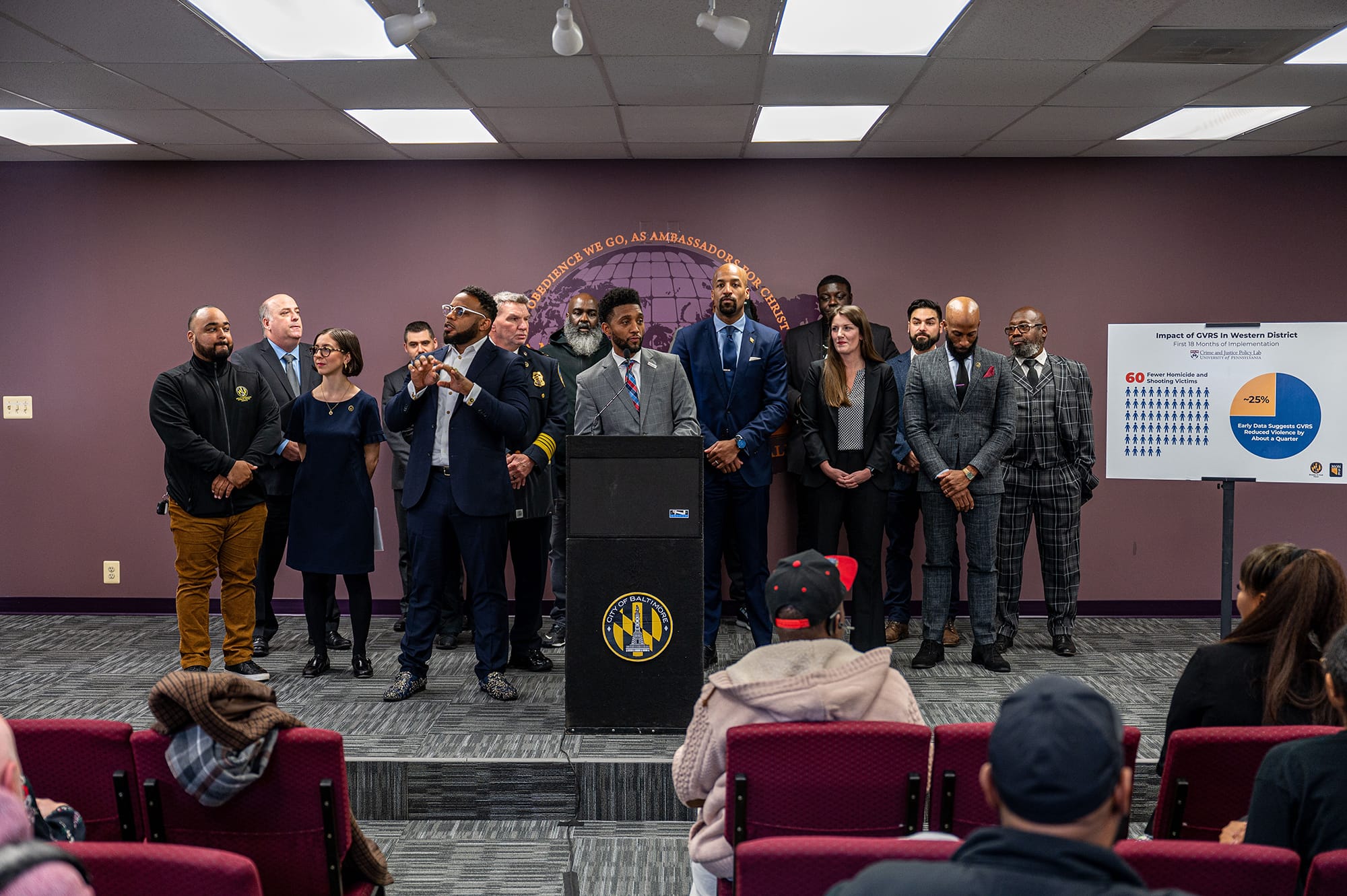
'Left Behind' America stages remarkable comeback
Some of the country's worst-off counties in the Midwest and Southeast have bounced back since COVID-19, thanks to significant growth in employment and the establishment of new businesses in the last three years, marking the fastest economic expansion since the presidency of Bill Clinton: 'This is the kind of thing that we couldn’t have even dreamed about five or six years ago.' NYT
Demining efforts ramp up in Ukraine
Defense Ministry specialists have already cleared 30,000 km2 of mine-infested land since Russia's invasion; Türkiye, Romania, and Bulgaria are working together to ensure safer waters in the Black Sea after Russia mined Ukraine's coastline; and Japan just announced a joint project with Cambodia to share knowledge and technology to provide humanitarian mine action in Ukraine.
Desalination efforts around the globe
Construction of Africa’s largest desalination plant has begun in Morocco, a $650 million project powered entirely by wind that will produce enough water to serve 7.5 million people. In Taiwan, a new plant will provide drinking water for 1.6 million residents in Hsinchu City by 2028, and in Namibia, a second desalination plant is expected to offer a vital lifeline to the drought-prone country by 2027.
Swedish grandparents become eligible for paid parental leave
The groundbreaking new law will allow parents to transfer a portion of their parental leave to grandparents, enabling the latter to receive payment for taking care of their grandchildren for up to three months during the child's first year. The country was also the first in the world to introduce paid parental leave for both parents in 1974. Independent
UK's new cabinet is the most representative ever of wider society
Keir Starmer’s Labour government has already broken several records: the new cabinet has the highest number of state-educated and female ministers in history, and LGBTQ+ MPs make up 11.6% of the governing party, the largest proportion of any parliament worldwide.

More good news you didn't hear about
The 2023 poverty rate for Latin America and the Caribbean fell to its lowest level in the last two decades. In Morocco, multidimensional poverty dropped from 40% in 2001 to 5.7% in 2022. The US has pledged $1.58 billion to Gavi for malaria vaccines. Massachusetts reports a 10% drop in opioid-related overdose deaths, the largest single-year decline in two decades. The US FDA, responding to public pressure, is banning brominated vegetable oil in food products. A trial study suggests ketamine tablets significantly improve depressive symptoms in treatment-resistant depression. The International Labour Organisation revises global unemployment rate down to 4.9% due to ‘macroeconomic stability.' Global fertiliser affordability returns to pre-2019 average. The World Bank is launching a free ID campaign in Mozambique to bridge the identification gap. WHO removes Zimbabwe from list of high-TB-risk places and also reports significant declines in malaria cases and AIDS mortality. Benin residents welcome increased electricity access in 13 cities. A reminder for us all: Harvard researchers find that women who practise gratitude have a lower risk of mortality from all causes. Meet Ronin, your hero of the month.
5th July 2024
Global negative emotions drop for the first time in a decade
This will come as a surprise to anyone with a regular news habit but Gallup's annual global survey of 146,000 people across 142 countries reports that in 2023 positive emotions reached their highest since the beginning of the pandemic, and negative emotions declined for the first time in a decade, with an uptick in people feeling more well-rested, experiencing more enjoyment, and smiling or laughing more. Among all age groups, young people were by far the best off, and Latin American and Southeast Asian countries topped the list of places where people report more daily positive emotions. Vox
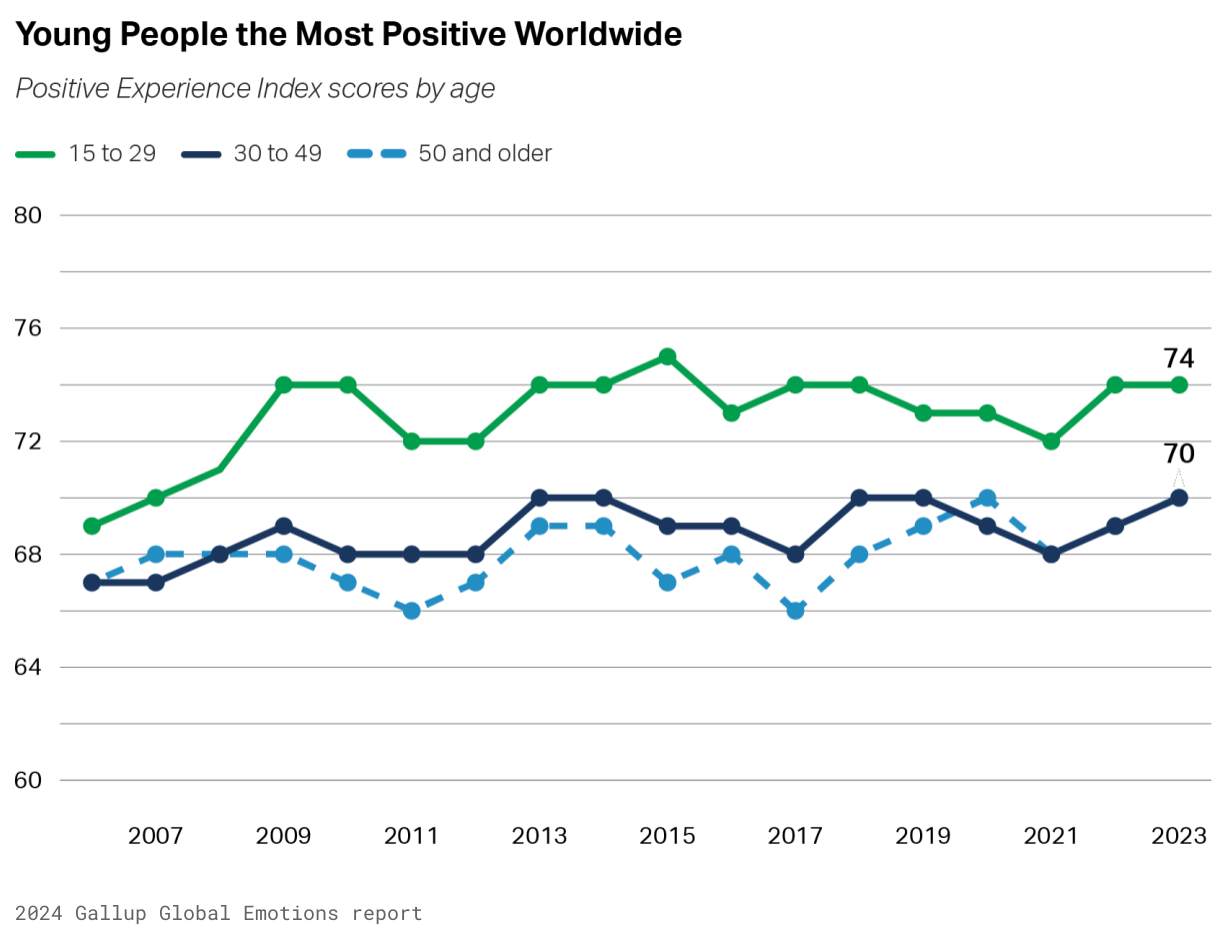
Indonesia has lifted 3 million people out of poverty in a decade
Statistics Indonesia says that between March 2014 and March 2024, the number of people living in poverty decreased from 28.28 million to 25.22 million, representing an average annual reduction of about 300,000 individuals, primarily in rural regions. Poverty status is determined by the poverty line, which is the minimum income needed to meet both food and non-food needs. Antara
World leaders pledge to increase vaccine production in Africa
The $.1.1 billion project will fix COVID-era mistakes that left African countries, which import over 99% of their vaccines, with limited access to life-saving medicines: 'This initiative will support the sustainable growth of Africa’s manufacturing base and contribute to the African Union’s ambition to produce most vaccines required by African countries on the continent.' Al Jazeera
Ivory Coast receives first batch of malaria vaccines
The government announced the arrival of 656,600 doses of the R21/Matrix-M vaccine, which will be used to immunise 250,000 children under two years old. The vaccine will complement national efforts such as mosquito net distribution and insecticide spraying in malaria-prone areas that helped reduce malaria deaths from 3,222 in 2017 to 1,316 in 2020. WE News English
Boston records 78% reduction in homicides in just one year
The city has recorded just four homicides this year. This far surpasses the goal set by city leaders in 2023 to cut homicides by 20% in three years. Experts attribute the drop to a confluence of measures—including micro-targeting of locations and people, an increase in police funding, and community investment and outreach. NYT

Healthcare gets a boost in Mali, Gambia, Armenia
In Mali, $100 million will fund improvements to reproductive, maternal, neonatal, child, adolescent, and nutrition health services; in The Gambia, additional financing will aid in constructing more health facilities as part of a longer-term project to enhance the quality of essential health services; and Armenia is getting a $110 million boost to increase healthcare affordability for all citizens.
Senegal gets $200 million to improve water and sanitation services
A new project funded by the World Bank is expected to benefit more than seven million people nationwide through its reforms, which include expanding collective sanitation services, promoting the use of treated wastewater for irrigation, and building resilience to flood and drought risks. World Bank
Digital transformation for 180 million Eastern and Southern Africans
A new World Bank-funded programme aims to expand affordable, reliable, and high-quality internet access and improve digital knowledge for millions of people across the region. The first phase of the eight-year plan will give over 50 million people in Angola, the DRC, and Malawi access to new and improved broadband internet. World Bank
A Paris court case could mark a turning point in international justice
Since 1990, the total number of armed conflicts worldwide has seldom dropped below a hundred, but the world’s desire to prosecute those who commit war crimes has grown. Last year alone, the number of cases brought before national courts for international crimes rose by 33%. The latest high-profile case involves a French arrest warrant for Syrian President Bashar al-Assad. CS Monitor
US sees lowest COVID-19 hospitalisations since pandemic onset
Remember when these numbers made the news?
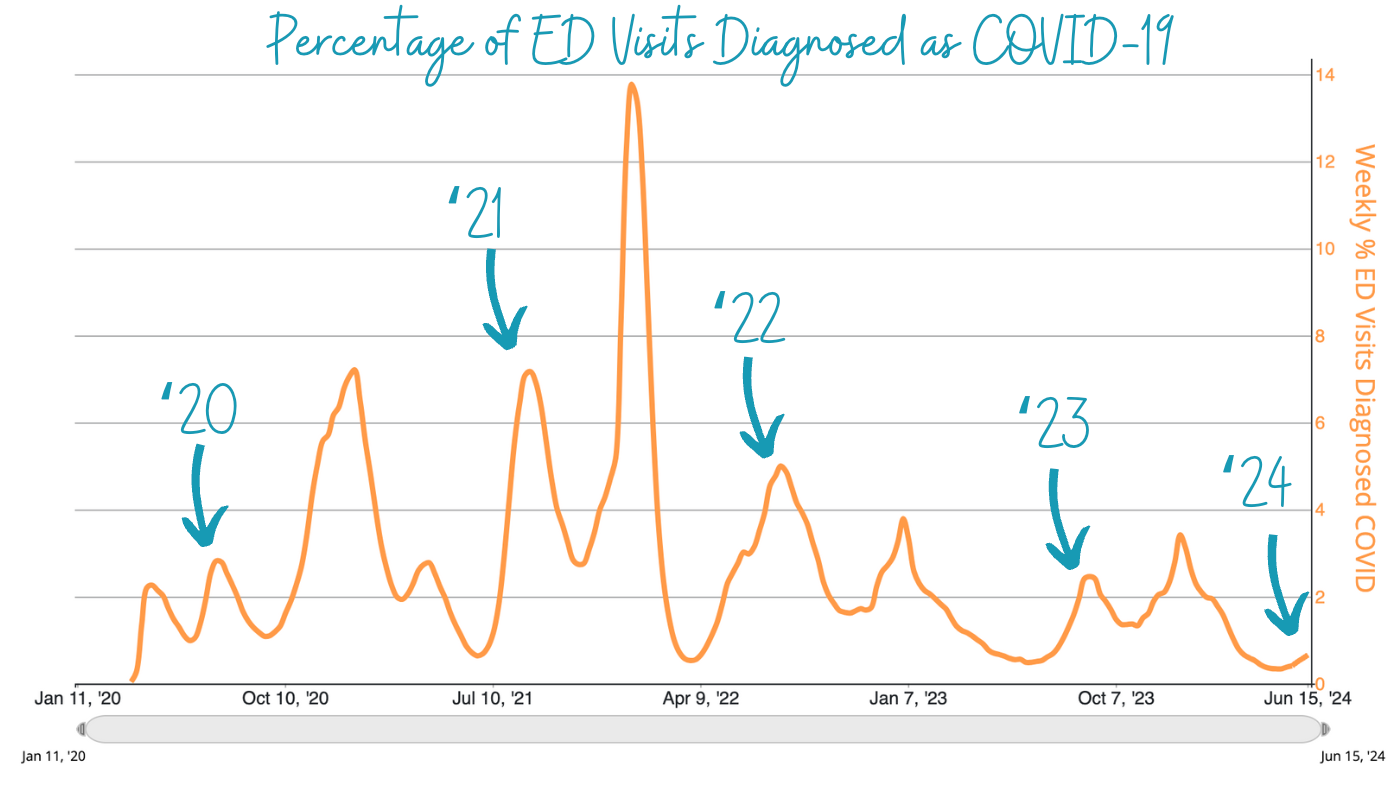
28th June 2024
Sierra Leone outlaws child marriage
In a landmark decision, Sierra Leone’s parliament just passed a historic bill criminalizing child marriage, a major victory for campaigners in a region that has the highest prevalence of the practice in the world. The West African country is home to 800,000 child brides, half of whom were married before the age of 15. The new bill includes a hefty fine or jail terms of up to 15 years for perpetrators.
Chad eliminates its first neglected tropical disease
The WHO just recognised Chad as the 51st country to eliminate human African trypanosomiasis (sleeping sickness) as a public health concern, surpassing the halfway mark towards the global target of 100 countries by 2030. Chad’s health minister said 'this achievement results from years of dedicated efforts by our health workers, communities, and partners.' WHO
Brazil becomes the largest country to decriminalize marijuana
The Supreme Court voted to remove criminal penalties for possession of up to 40 grams—a decision that will take effect within days and stand for the next 18 months. It makes the nation of 203 million the largest to take such a measure and the latest sign of a growing global acceptance of the drug medicine. AP

HIV researchers and activists hail 'the best news ever'
Results from a large clinical trial in Africa showed that a twice-yearly injection of a new drug gave young women total protection from the virus. Gilead has committed to making large quantities available to low-income countries as soon as it receives regulatory approval. 'I got cold shivers. After all our years of sadness, particularly over vaccines, this truly is surreal.' NYT
Gavi outlines plan to save eight million lives between 2026 and 2030
The Vaccine Alliance says it will protect 500 million children during the next five years, reflecting an ambition to vaccinate the next billion children in half the time it took to reach the first billion between 2000 and 2020. The US, France, Spain, the private sector, and philanthropic organisations have already pledged at least $2.4 billion towards this goal. Gavi
Significant global progress in eliminating trans fats
A new progress report has found that WHO-recommended policies for global trans fat elimination have been adopted by 53 countries—covering 46% of the world’s population—a significant increase from 6% in 2018. These policies could prevent 66% of the annual deaths linked to trans fats intake, equating to about 183,000 lives saved each year.
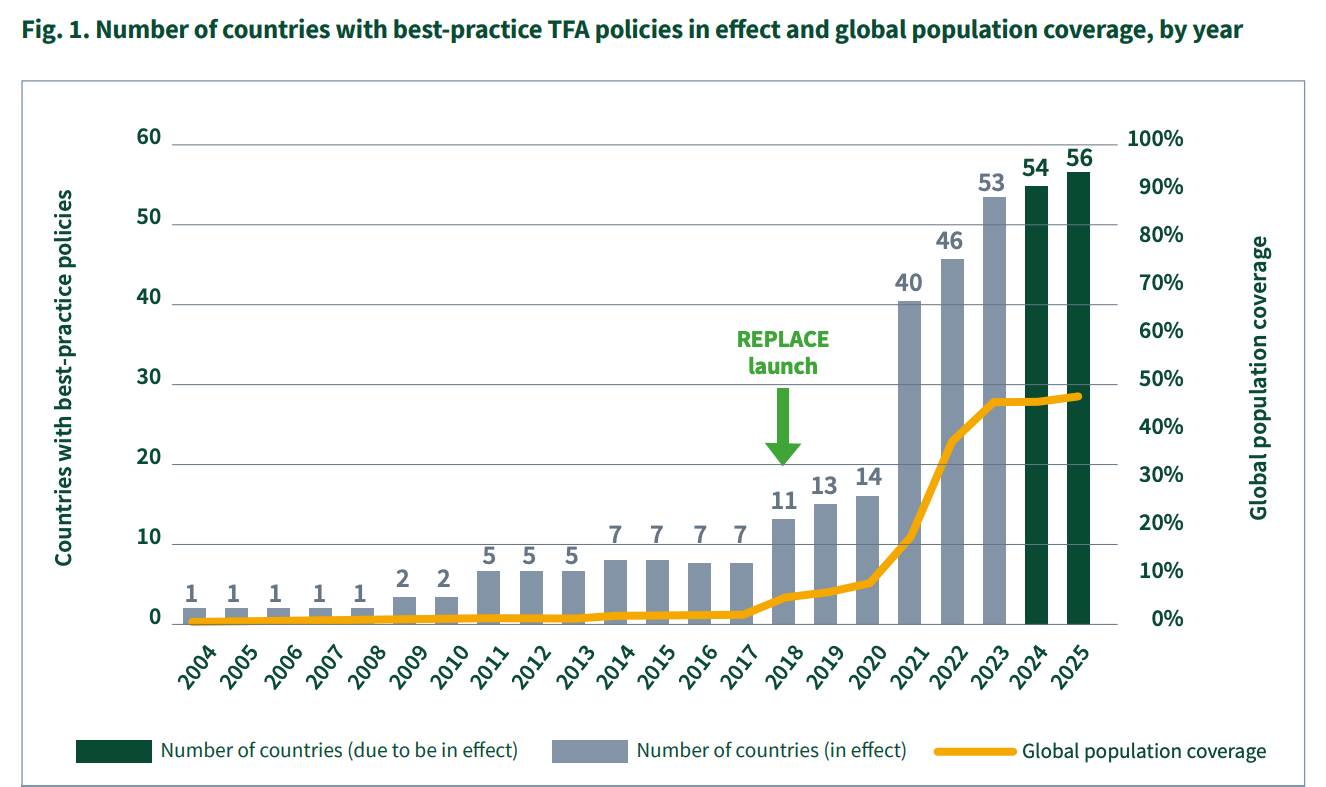
Japan is considering free school lunches nationwide
A recent government survey showed that 43% of municipalities already offer or plan to offer free school lunches in order to reduce financial burdens on households and estimated that it would cost about ¥510 billion ($3.2 billion) annually to extend this initiative countrywide. Japan Times
20 years of progress towards gender equality in research
Elsevier's 2024 Gender Report analysed women's participation in research and innovation across 18 countries and 2 regions, revealing that globally, women constitute 41% of researchers, up from 28% in 2001. Grant funding for women rose from 29% in 2009 to 37% in 2022, and women now comprise the majority of active researchers working on some UN SDG research areas.
Expanding electricity connectivity in East Africa
At least one million poor Ugandan households will get a free electricity connection after the government received a $638 million loan from the World Bank; in Kenya, the government plans to connect 566,000 more households to electricity as part of its goal for universal access by 2030; and in Malawi, solar-powered lighting facilities are making electricity affordable for low-income households.
Namibia strikes down colonial-era laws against same-sex relationships
Windhoek’s high court declared the crimes of 'sodomy' and 'unnatural sexual offences' as 'unconstitutional and invalid' following a case brought by LGBTQ+ activist Friedel Dausab. This is the latest court victory for the Namibian LGBTQ+ community: in June 2023, the court recognised same-sex marriages performed abroad between Namibian citizens and foreign spouses. France 24
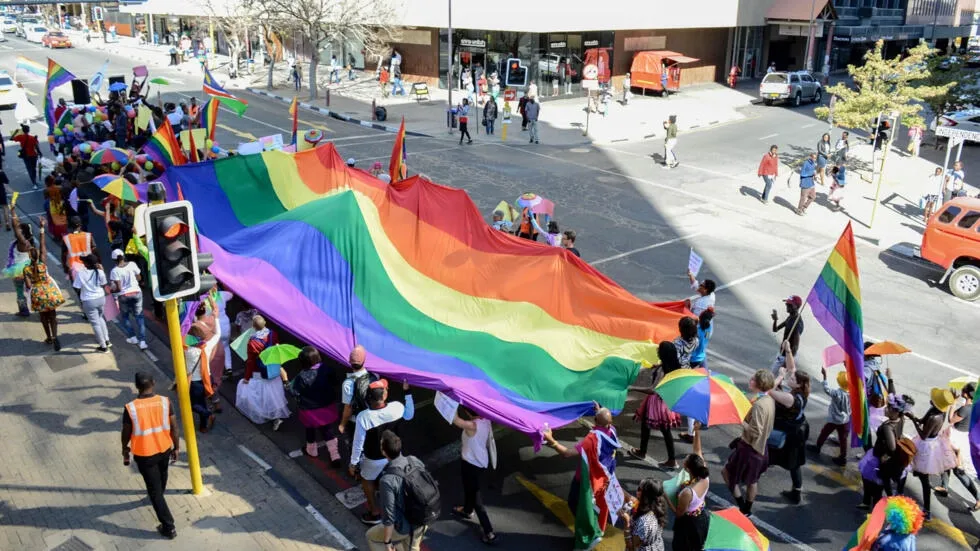
More good news you didn't hear about
The number of active mobile money accounts globally grew from 13 million in 2010 to more than 640 million in 2023. Liberia’s new war crimes court could bring long-overdue justice to civil war victims. Mexico’s president-elect upgrades the national science council and puts a woman at its helm. The Mekong Malaria Elimination programme reports an astonishing 43% decrease in malaria cases in just one year. US traffic deaths are declining, even as people drive more. In Cambodia, the government’s Nutrition Project is enhancing access to quality health and nutrition services, and a new Water Security Project will improve supply and reliability for over 113,000 people. A UNICEF report reveals a 13% drop in children facing severe food poverty in Nigeria. Trans women in Colorado prisons will receive improved care and housing following a historic class action. Massachusetts' millionaire tax has already brought in $1.8 billion for schools and roads. That's billion, with a b.

21st June 2024
UNICEF records 72% drop in child mortality rate in South Asia
It's one of the greatest-ever achievements in international development. A new report attributes the drop in deaths from 5 million a year in 1990 to 1.3 million a year in 2022 to investments in health workers, better newborn care, improved treatment of childhood illnesses, and increased vaccination uptake. UNICEF
Gavi puts its money where its mouth is
After a spate of delays—some pandemic-shaped—Gavi will now begin funding the two preventive Ebola vaccinations in populations most at risk of exposure. This is a huge achievement, given that there was no approved vaccine at all a decade ago. Gavi is also now accepting funding applications from lower-income countries for supplies of human rabies vaccines for post-exposure prophylaxis.
Women's health is starting to get more attention, finally
The Longitude prize has been awarded to a test that detects a UTI within 15 minutes and identifies the appropriate antibiotic within 45 minutes. Between 50% and 60% of women will experience at least one UTI during their lifetimes; current tests take up to three days. Across the pond, the first state-mandated biorepository has launched in Connecticut, aiming to boost visibility, research, and treatment for endometriosis. Science
Thailand legalizes same-sex marriage
The country's Senate voted 130-4 this week to pass a same-sex marriage bill that the lower house had approved in March. This makes Thailand—home to over 70 million people—the first in Southeast Asia, the third in Asia, and the 38th country in the world to recognize same-sex relationships. It's a 'monumental step forward' in the global fight for equality. CNN

Contraception allows African women more reproductive autonomy
The number of women in sub-Saharan Africa using modern contraception has nearly doubled over the past decade, reaching 66 million. Social media has enhanced reproductive knowledge, even in remote areas, and lower-cost (and importantly, discreet) contraceptives like implants and injections are more readily available. NYT
Biden gives legal protection to half a million immigrants
President Biden announced a significant modification to the pathway to citizenship for 'undocumented spouses' of US citizens. Even the hard-to-impress headline writers at The New York Times described Biden’s action as follows: 'The new policy is one of the most significant actions to protect immigrants in years.'
Yesterday's announcement will make it easier for young people educated in this country, including some Dreamers, to access work visas, which would give them more stability, and in some cases, a path to permanent status. We are a better and stronger nation because of these young people — and this is the right thing to do.
Barack Obama
Pakistan's Punjab receives $150 million for primary education
The World Bank-funded project is expected to benefit five million children through its learning environment reforms, which include scaling up public-private partnerships, improving school preparedness, and enhancing the quality and use of teaching and learning materials and assessments. World Bank
Australia formally grants native title to Kabi Kabi people
A federal judge recognised the Kabi Kabi people's non-exclusive rights to over 365,345 hectares on Queensland's Sunshine Coast, bringing an end to 30 years of campaigning. Justice Collier told the court that the Kabi Kabi people 'have and always have had native title rights and interests in this country' and recognised their right to 'take resources from the area for any purpose.' ABC
Sweden lowers its age to legally change gender
Sweden’s parliament recently voted in favour of lowering the age from 18 to 16 years. The new law is expected to take effect in July 2025 and would simplify the current process by eliminating the need for a gender dysphoria diagnosis. It would also separate the process of changing legal gender from gender surgery, which still requires an age of 18 years. BBC
The great majority of Swedes will never notice that the law has changed, but for a number of transgender people the new law makes a large and important difference.
Progress in reducing world's leading infectious cause of blindness
Trachoma was found almost everywhere in the world in the 1950s. Today, 18 countries have eliminated the eye disease as a public health problem, thanks to improvements in clean water, sanitation, waste management systems, insect control programs, and effective antibiotics, and the number of people at risk has dropped from 228.48 million in 2013 to 132.04 million in 2022. Our World in Data
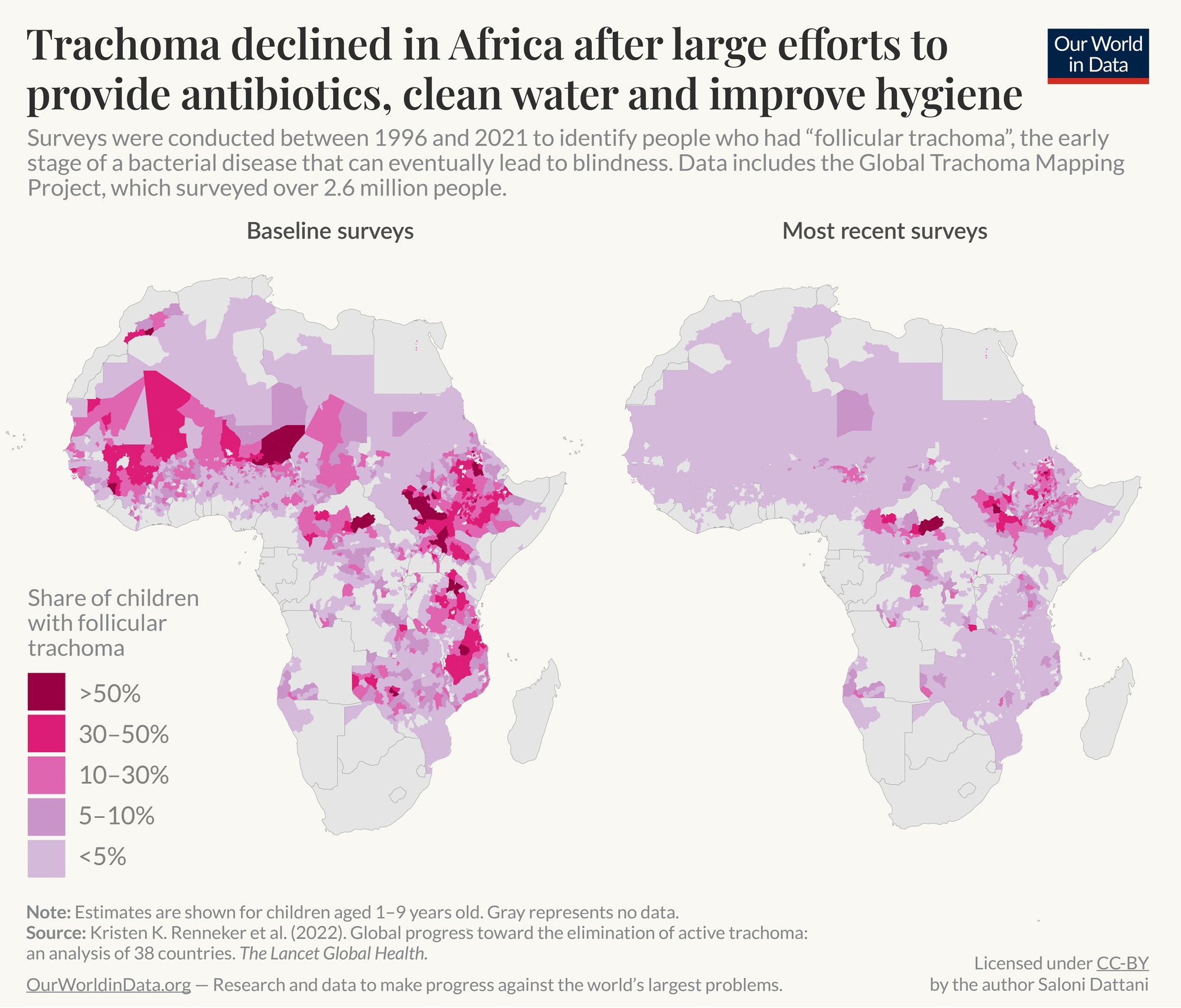
More good news you didn't hear about
The World Bank's new indicator on within-country inequality says that the number of highly unequal countries has dropped from 77 in 2000 to 52 in 2022. The expansion of early childhood development services in Rwanda decreased child stunting from 44% to 33% between 2010 and 2019. The world's real immigration crisis? Not enough immigrants. In the United States, Maryland just pardoned 175,000 people for low-level cannabis possession, New York just passed two laws to protect children from addictive social media content, and a federal judge has blocked Florida from restricting access to healthcare for transgender adults and minors. Europe’s push to lower speed limits has resulted in less noise, lower emissions, and fewer accidents. UNICEF says that global birth registration has risen substantially since 2000. The US Internal Revenue Service’s latest efforts to suppress tax evasion could result in the collection of $50 billion over 10 years. Laos is using digital technology to connect rural women and improve infant and maternal nutrition. USAID has finally put reducing lead poisoning on its agenda. The UN just celebrated its first-ever International Day of Play, and just look at some of those photos.
13th June 2024
Investments in neglected diseases have save eight million lives
Between 1994 and 2022, almost $100 billion has been invested in neglected disease R&D for drugs, diagnostics, vaccines, biologics, microbicides, and vector control. This has resulted in 183 new products—which have saved 8 million lives since 2000 and reduced deaths by more than 30%. With continued scale-up and introduction, more than 32 million more lives could be saved by 2040. Vox
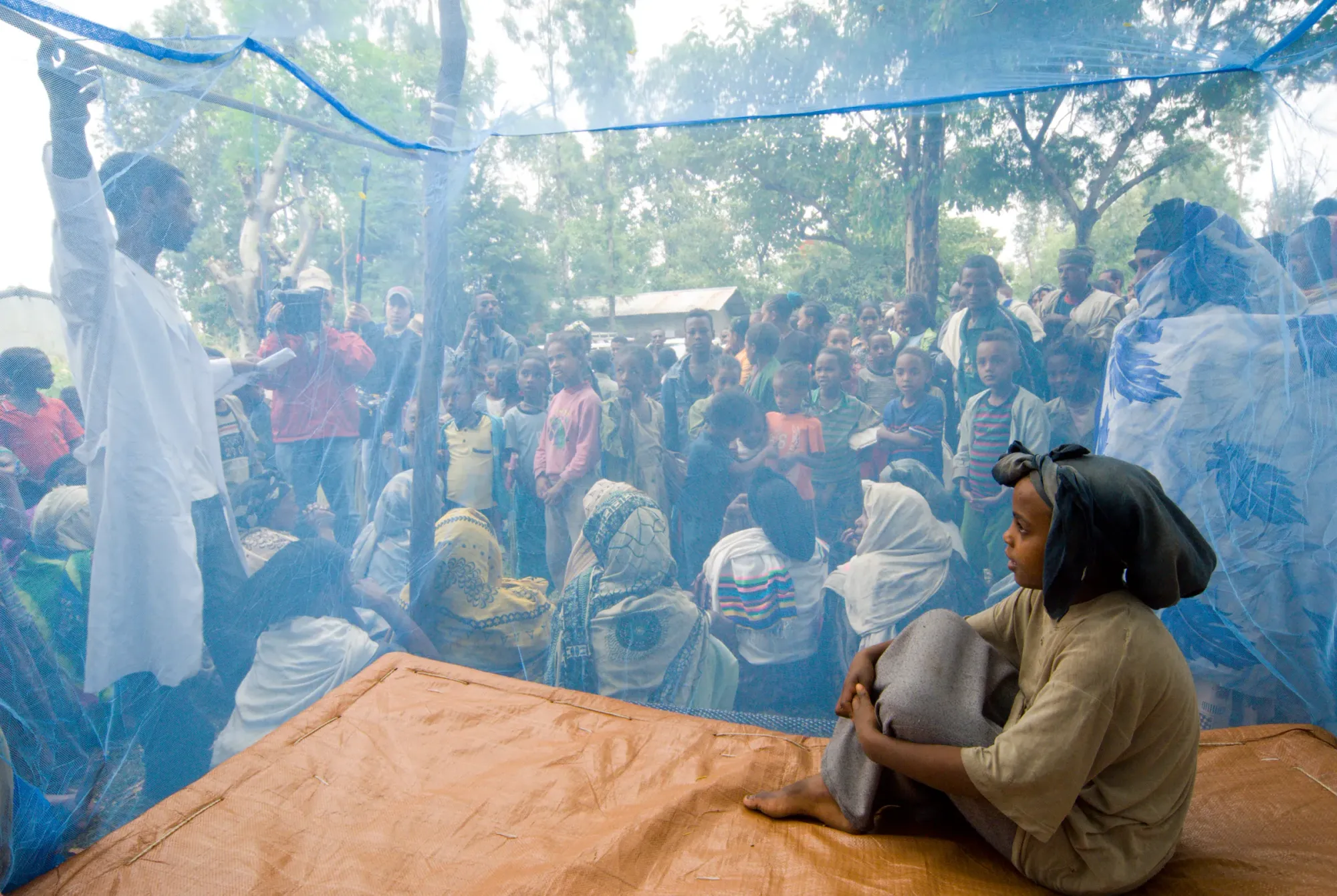
World sees significant decline in tetanus-related fatalities
Tetanus, a bacterial infection that causes paralysis and can be fatal, claimed over 250,000 lives annually in the early 1990s. By 2019, the number of deaths had plummeted to fewer than 35,000 per year—largely thanks to widespread administration of the combined diphtheria, tetanus, and pertussis vaccines. OWD
World's most populous country reverses slide to authoritarianism
'The years ahead will, with any luck, be ones of negotiation and compromise. This will be a return to form for India, a vastly diverse nation whose unruly polity has resisted autocracy at every turn since it shrugged off British colonial rule in 1947. The whole world should breathe a sigh of relief that India’s voters have spoken, loudly, in favor of continuing that glorious, messy tradition.' NYT
Foreign aid helps millions of people in South Asia
The World Bank's International Development Association says that in the past four years, an estimated 84.7 million people in the region benefitted from safety-net programs; 24.5 million people received essential health, nutrition, and population services; 2.6 million gained access to improved water sources; and 1.8 million gained access to improved sanitation services. World Bank
Historic gains in healthcare for minorities in America
Between 2010 and 2022, the proportion of uninsured Black Americans declined from 20.9% to 10.8%; for Latinos from 32.7% to 18%; for Asian Americans, Native Hawaiians, and Pacific Islanders from 16.6% to 6.2%; and for Native Americans from 32.4% to 19.9%. The federal government is now investing an extra $500 million to sign up more people from underserved communities. HHS
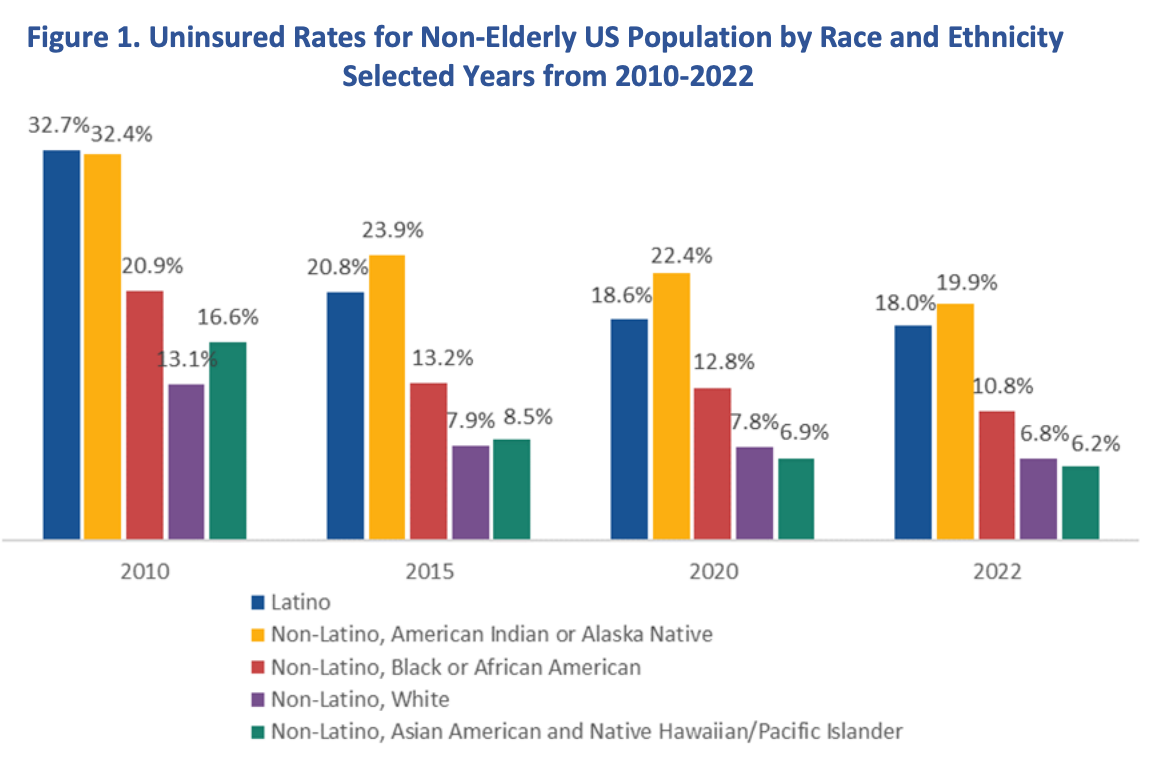
Violent crime is down and the US murder rate is plunging
Finally, a bit of mainstream coverage! According to a new report from the FBI, murders, rapes, assaults, robberies, burglaries, and vehicle thefts all dropped by double-digit percentages during the first three months of 2024, compared to the same months in 2023. As Jeff Asher points out, the data is preliminary, but the trend is clear. CNN
West African border towns regain their coasts and livelihoods
Over the last few years, Benin and Togo have constructed over 42 km of protection for communities on their coastlines, protecting hundreds of thousands of people from the threat of flooding. 'We now sleep peacefully, free from the fear of inundation. It's not merely a project; it’s a beacon of hope, a testament to our resilience and reconciliation with the sea, our lifeblood.' World Bank
Ireland is extending free contraception to more women
From July 1, all women and other people identifying as transgender or non-binary, aged 17-36, will be eligible for free contraception. Almost 2,400 GPs and 2,050 pharmacies are already providing services under the scheme, with more than 189,000 women accessing the service in 2023.
Gender should not be a barrier to healthcare, and I firmly believe that the Free Contraception Scheme is a landmark initiative that empowers women, enabling them to make choices about their reproductive health without any financial burden.
Stephen Donnelly, Minister for Health, Ireland
Free contraception helps Finland reduce teenage abortions by 66%
After rising in the 1990s, the number of teenage abortions in Finland plummeted between 2000 and 2023, thanks to free contraception for adolescents and compulsory sex education in schools. Since September 2023, Finland has also stopped requiring women to give a reason for having an abortion, making it available upon request during the first 12 weeks of pregnancy. Reuters
Humanity is making progress on reproductive rights
As the US Supreme Court prepares to hand down its latest batch of rulings, here is your periodic reminder that America is an outlier. Some 60 countries around the world have made their abortion laws more liberal in the past 30 years; only a small handful, which includes the United States, have made their abortion laws more restrictive. Think Global Health
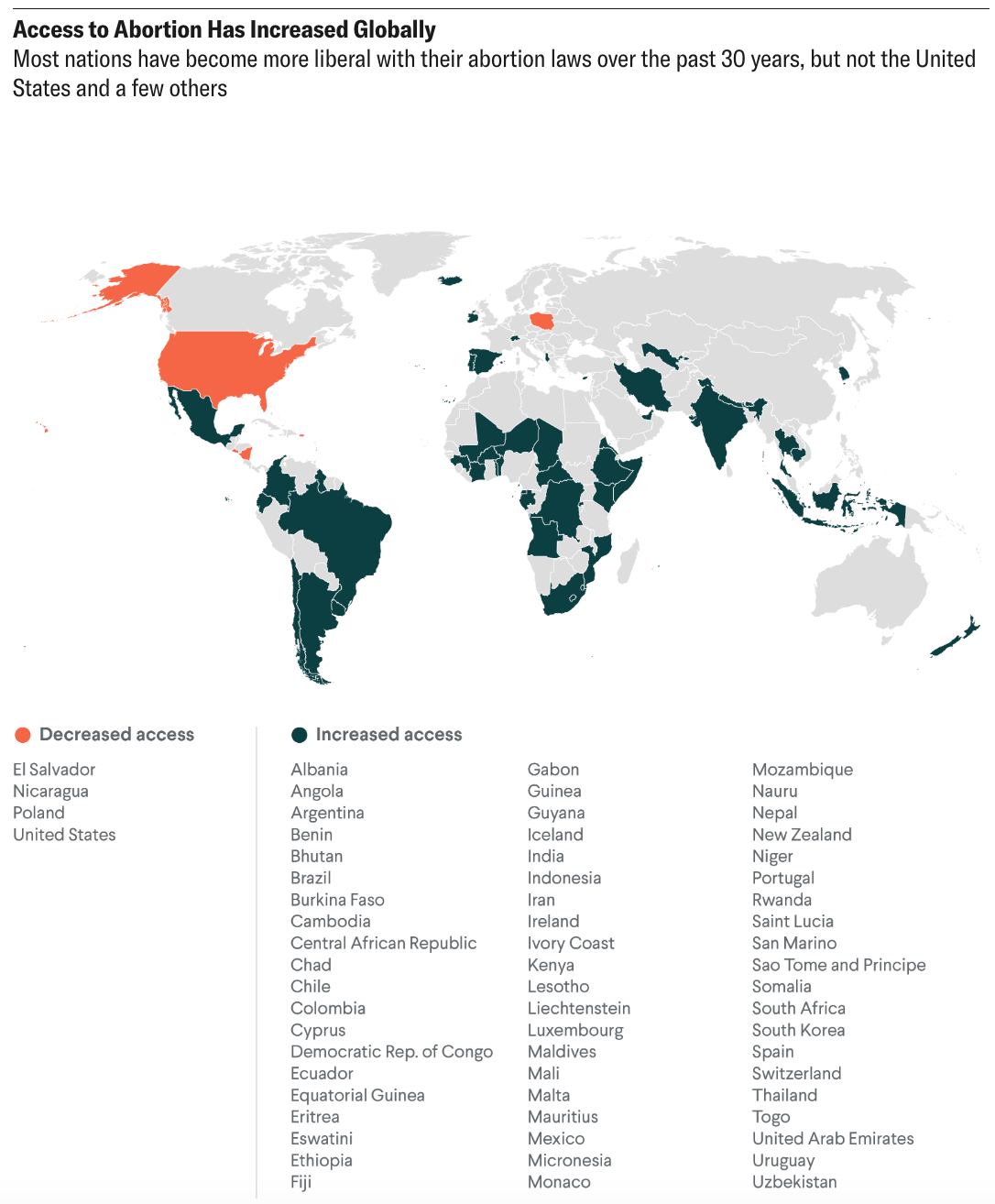
More good news you didn't hear about
With the historic election of Mexico's first female president, here's a look back at the long journey feminists have travelled to get to this moment. A new blood test in the UK can predict if breast cancer will return years before the disease shows up on scans. Mobile health brigades are saving lives in rural Mozambique. Colombia's homicide rate has more than halved since the 1990s (also from Colombia, check out 'Esperanza's tale of hope'). The World Bank says the global economy is in better shape than it was at the start of the year, thanks largely to the United States. The dramatic decline in childhood mortality during the 20th century has added a full year to women's lives. Reducing air pollution in London resulted in elementary school students doing better at tests. Taiwan has cut air pollution by around a third since 2007, and lung cancer deaths have declined too. How Ecuador got hospitalisations to drop by hundreds of thousands. Social safety nets in Latin America and the Caribbean reached 73 million beneficiaries between 2019 and 2023. New fronts are opening in the war against malaria. Real superheroes don't wear capes: meet the eight champions just recognised by the WHO for outstanding contributions to public health.
6th June 2024
Incredible global progress on water, sanitation, and hygiene
Last week the WHO and UNICEF released a new report on global access to drinking water, sanitation, and hygiene in schools. You need to dig a little - but around halfway through they reveal that between 2015 and 2023, global access to clean drinking water in schools increased from 66% to 77%, basic sanitation increased from 68% to 78%, and basic hygiene rose from 58% to 67%.
This is a staggering achievement. In actual numbers, it means that well over 200 million schoolchildren have gained access to improved water, sanitation, or hygiene services in the last eight years, a period of time which includes the severe disruptions of the pandemic. If you can find a single story about this from any other news organisation in the world, let us know. We tried and failed.
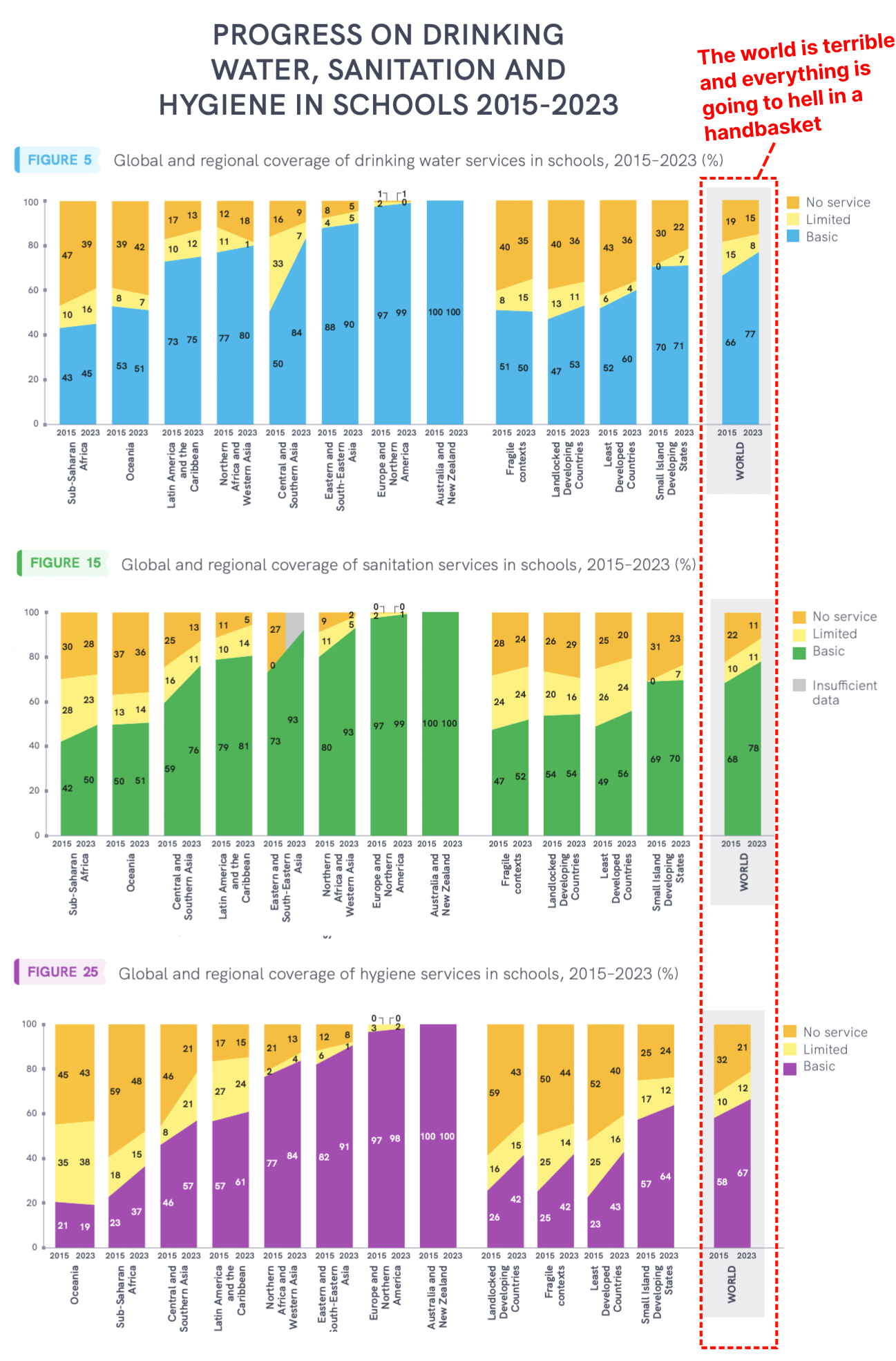
Millions of people gain access to oxygen thanks to COVID-19
A pandemic silver lining: in 2021, UNICEF launched a project aiming to install 130 oxygen plants in over 40 countries by 2025. As of May 2024, 57 plants have been set up in 21 countries. Once all 130 become fully operational, they will provide essential oxygen therapy to an estimated 400,000 sick children with hypoxemia each year and access to oxygen for millions. UNICEF
How free school meals in the United States went mainstream
Eight states have passed free meal legislation since 2022. Dozens more have introduced similar bills. Roughly 4 in 10 public schools are now enrolled in a federal program, and more than 21 million American children now attend schools that offer free meals to all—a tenfold increase from 2010. 'Introducing universal free meals is probably the best thing we ever did.' NYT
Europe’s crackdown on air pollution cuts heart disease deaths
Europe recorded the largest annual decline in PM2.5—the air pollution most closely linked to harmful health effects—of any region of the world between 2010 and 2019. As a result, deaths in the region from heart disease attributed to pollution fell by 19.2% and from strokes by 25.3%. This amounts to 88,880 fewer heart disease deaths and 34,317 fewer stroke deaths. FT
Cambodia lifts 2.8 million out of poverty in seven years
In a remarkable achievement, Cambodia has lifted around half of the country’s total poor out of poverty in the last seven and half years, according to the UNDP. This comes despite the setbacks caused by the pandemic, which pushed half a million back into poverty. During the same time period, 148,000 people (46% of them women) have gained access to mine-free land.
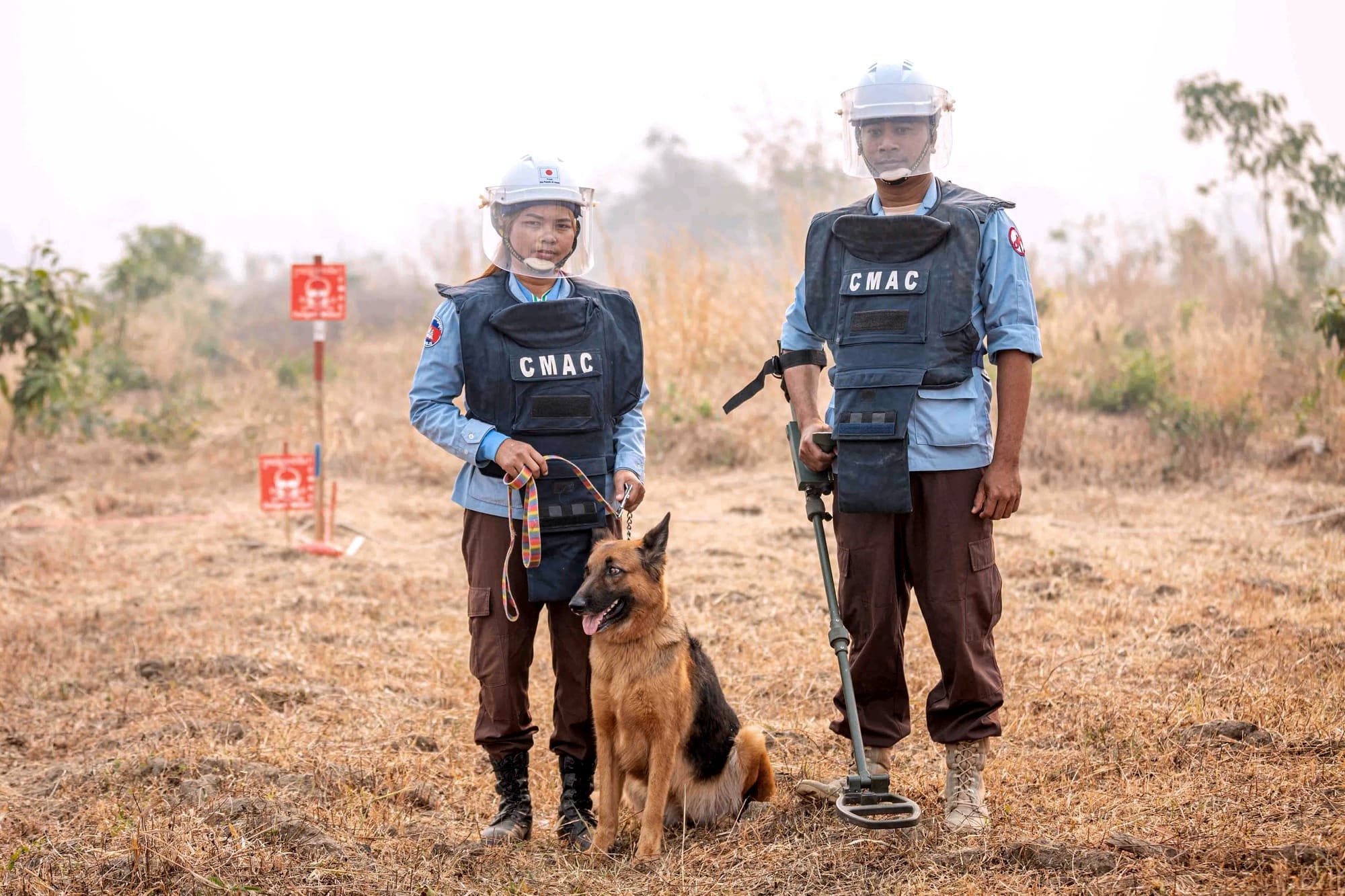
Tobacco use falls dramatically in Africa
Tobacco use among teenagers in Africa declined by nearly 18% between 2020 and 2022—and by 46% among adults during the same period—thanks to stronger measures. In Africa, 37 countries now have bans on public smoking, and 14 of those have 100% smoke-free laws in all public places. This puts the region on track to achieve a 30% reduction in tobacco use by 2025 compared with 2010. WHO
Bereaved father wins change to parental leave law in 3 UK countries
A father who was left without the right to parental leave after his wife died in childbirth has won a change to the law in England, Wales, and Scotland on the last day of the current parliament. After a two-year campaign, the law was pushed through at the last minute after the surprise announcement of a 4 July general election. Guardian
Japan inches closer to same-sex marriage
Three cities in Japan will begin registering same-sex couples the same way that they register heterosexual couples in common-law marriages, the latest advancement in an ongoing struggle for legal recognition of same-sex couples in the East Asian nation. Meanwhile, hundreds of municipalities and 26 of Japan’s 47 prefectures have created partnership oath registries for same-sex couples. Asahi
Murder rates and gun violence in America are plummeting
Murder is down around 18.5% in more than 260 cities with available data for 2024 compared to the same time frame in 2023. It’s late enough in the year, with a large enough sample, to say that the country is on track for another historic annual decline. Gun violence is falling fast, too, with the overall number of shooting victims down around 12% relative to 2023. Jeff Asher

More good news you didn't hear about
Suicide rates in China have declined dramatically since the 1980s, down 66% in cities and 81% in rural areas. A program to improve education is coming to another 500 secondary schools and 1,000 primary schools in Cambodia. Zimbabwe turns the tide on both HIV and cholera. In the next five years, A$715 million will be spent to roll out preschool for three-year-olds in South Australia. A $350 million project will HELP provide water, sanitation, renewable energy, and disaster shelters for at least 645,000 Rohingya in Bangladesh. FIFA expands access to maternity leave for coaches and players. California is about to tax guns more like alcohol and tobacco. The first pill for postpartum depression is finally getting to patients (and it's working). Azerbaijan has made remarkable progress in enhancing immunisation services in the last three years. Relief might be coming: global wheat and maize prices have hit three-year lows during the first four months of 2024.
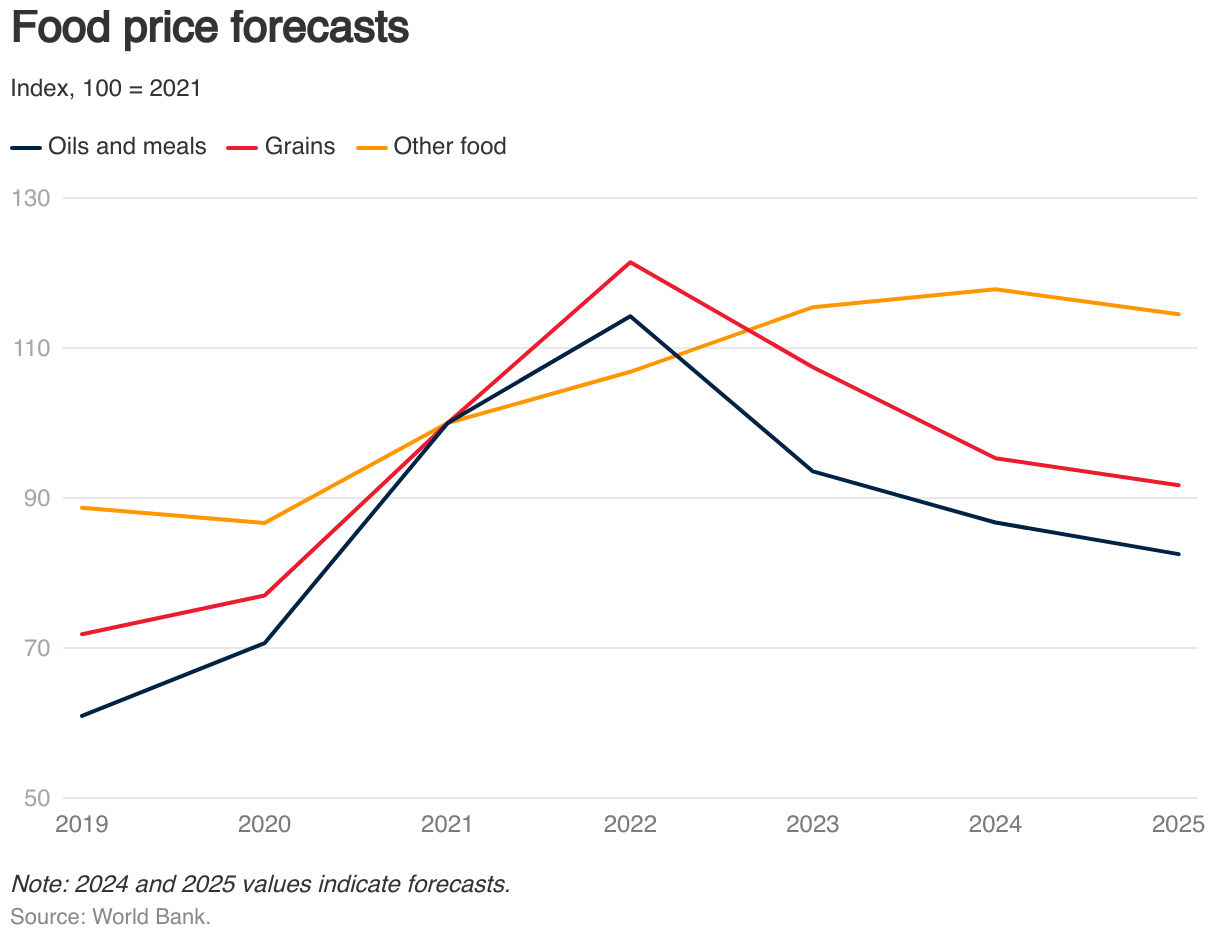
30th May 2024
Global life expectancy to increase by nearly five years by 2050
Will the future be better? The Global Burden of Disease Study, just published in The Lancet, forecasts that global life expectancy will increase by 4.9 years for males and 4.2 years for females between 2022 and 2050, largely driven by improved survival from cardiovascular diseases as well as from a range of communicable, maternal, neonatal, and nutritional diseases. IHME
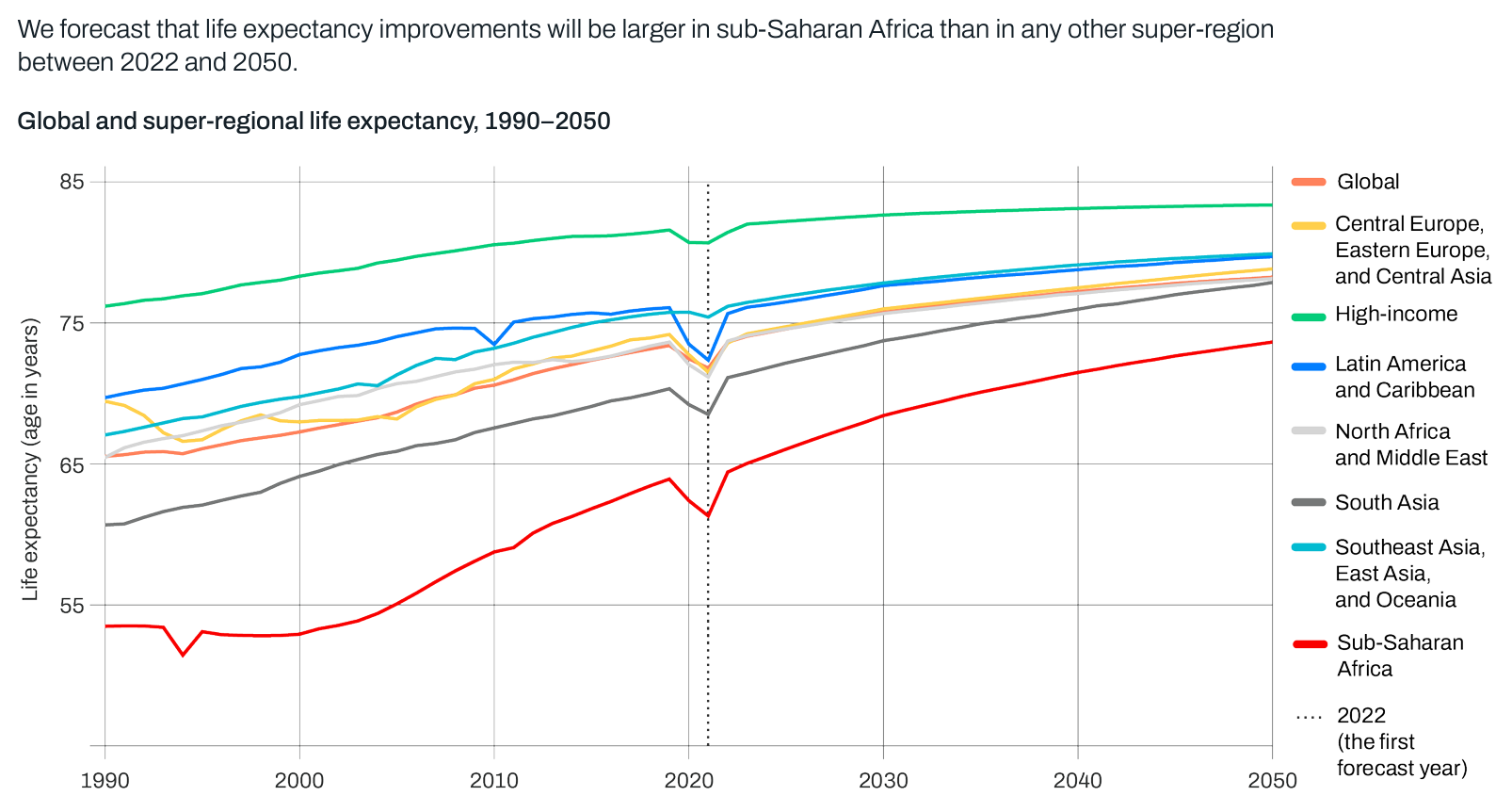
Central African Republic rolls out R21 malaria vaccine
UNICEF has delivered 43,000 doses via air transport, marking the start of the WHO’s highly anticipated vaccination campaign. It's the first country to start using the R21 malaria vaccine in routine childhood immunisation. An additional 120,000 doses are slated to arrive in the next few days, a big moment for one of the most malaria-affected countries in the world. Gavi
India has made significant progress on tuberculosis
India’s efforts to ensure early detection and treatment, along with a host of community engagement efforts, have resulted in a decline of 16% in TB incidence (new cases emerging each year) and a 18% reduction in mortality since 2015. The Health Ministry has now set 2025 as the target for eliminating the disease altogether. The Hindu
There's new hope for an HIV vaccine
An experimental vaccine developed at Duke University has been shown to generate low levels of antibodies needed to target HIV in a small group of people enrolled in a clinical trial. It’s a first but much-needed step towards preventing infection. 'This is one of the most pivotal studies in the HIV vaccine field to date.' Wired
Some education success stories in Africa
In the DRC, the elimination of primary school fees in public schools has resulted in 3.7 million more children gaining access to education; Tanzania's results-based education financing program has led to an additional 1.8 million students enrolling in primary schools; and in Kenya, the Tusome program has improved the reading of Grade 1 and 2 students by the equivalent of 3-5 years of schooling.
New hope for Pakistan's mistreated workers
Germany is Europe’s largest economy and clothing importer, and its Supply Chain Act now requires companies with over 1,000 employees to minimize human rights violations across their supply chains. In Pakistan, the law is already compelling factories to comply with minimum wage laws, provide workers with written contracts, and give bonuses—and it looks like it's just the start. Fuller Project
Melinda French Gates is committing $1 billion to women's rights
The cavalry has arrived. 'Over the past few weeks, as part of the $1 billion in new funding I’m committing to these efforts, I have begun directing new grants through my organization, Pivotal, to groups working in the United States to protect the rights of women and advance their power and influence.' NYT
Marijuana moves closer to declassification in the United States
The US Drug Enforcement Administration is moving towards reclassifying marijuana as a less dangerous drug, recognising its medical uses and lower potential for abuse. This would move marijuana from Schedule I to Schedule III, but it would not be legalised for recreational use. AP
Domestic violence rates in Australia fall by two-thirds since the 90s
The rate of women killed by their partners has fallen by two-thirds over the past 34 years, part of a long-term trend of domestic and acquaintance homicide rates falling by more than half since 1989. Factors cited include better victim safety, stronger home security, improved policing, economic affluence, an ageing population, higher imprisonment rates, and higher immigration. AFR
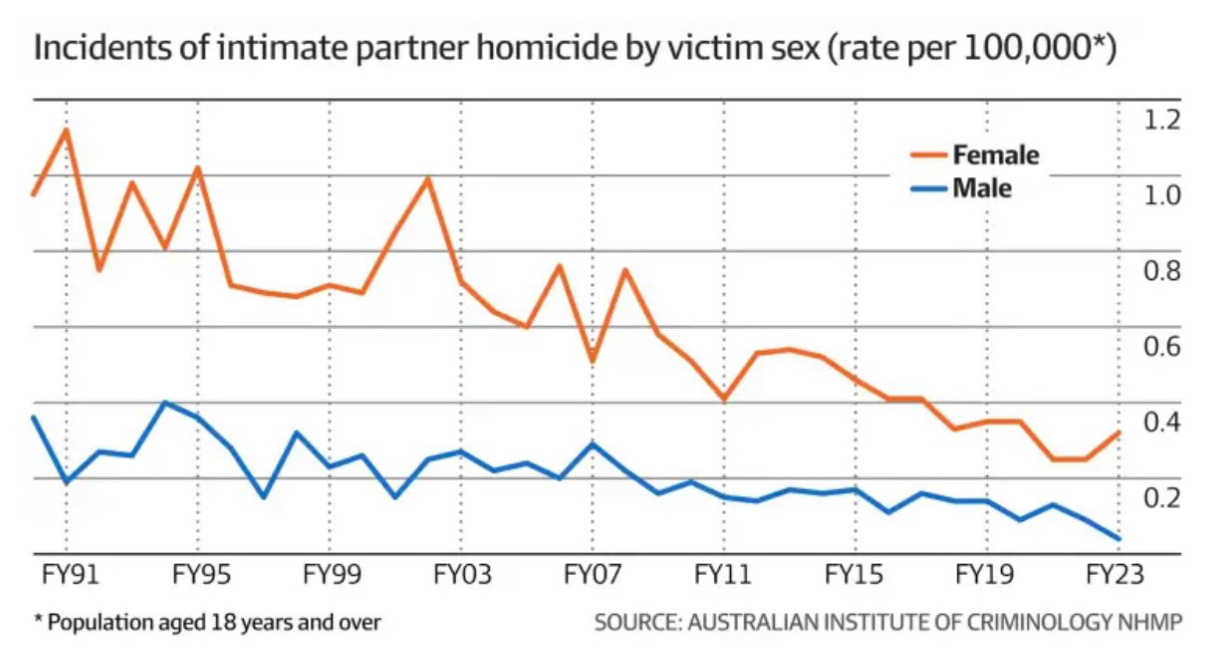
More good news you didn't hear about
A push to provide clean cooking options for over a billion people in Africa has raised $2.2 billion in pledges from governments and the private sector. The United States is slowly turning the tide on mass incarceration, expanding freedom and opportunity for millions. The real immigration crisis? Not enough immigrants. Crime in Seoul is declining, even as anxiety about the issue is rising. One man's determination has reduced traffic deaths on some roads in India by 40%, and his solution has been rolled out to the 15 most dangerous highways in the country. The Takaful and Karama (Solidarity and Dignity) Programme in Egypt now reaches 4.67 million vulnerable households. In Massachusetts, a 'millionaire's tax' has earned the state more than $1.8 billion for education and transportation. Won't somebody think about the kids? The coastal city of Beira, Mozambique, is using faster weather data and community mobilisation to better prepare for cyclones.
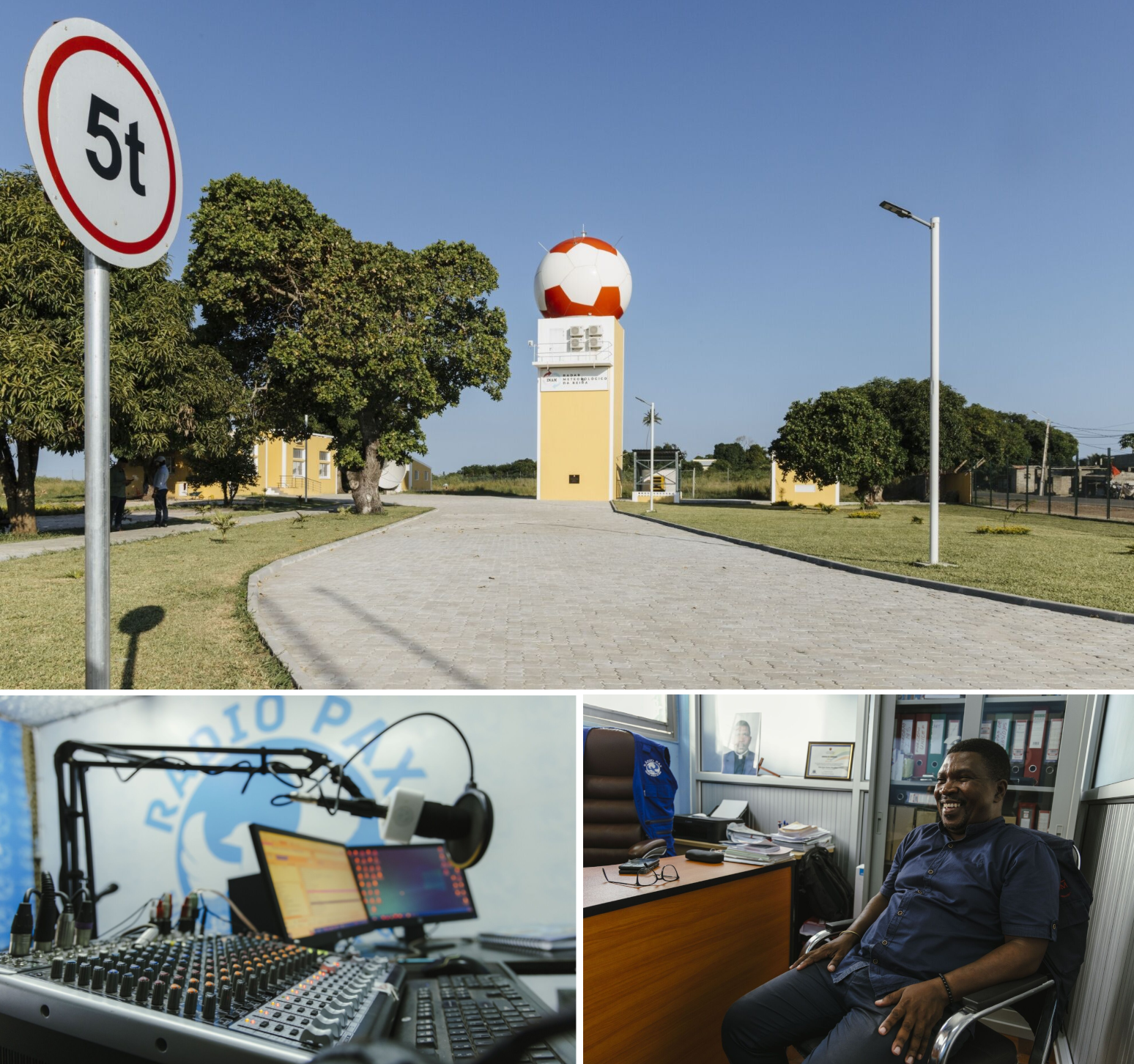
23rd May 2024
Global maternal mortality drops by 50% over the past 35 years
Although about 300,000 women still lose their lives to pregnancy-related causes every year, the global community has made significant strides in reducing this number. According to recently published WHO data, maternal mortality has decreased by half since 1985, thanks to improvements in access to care. OWD
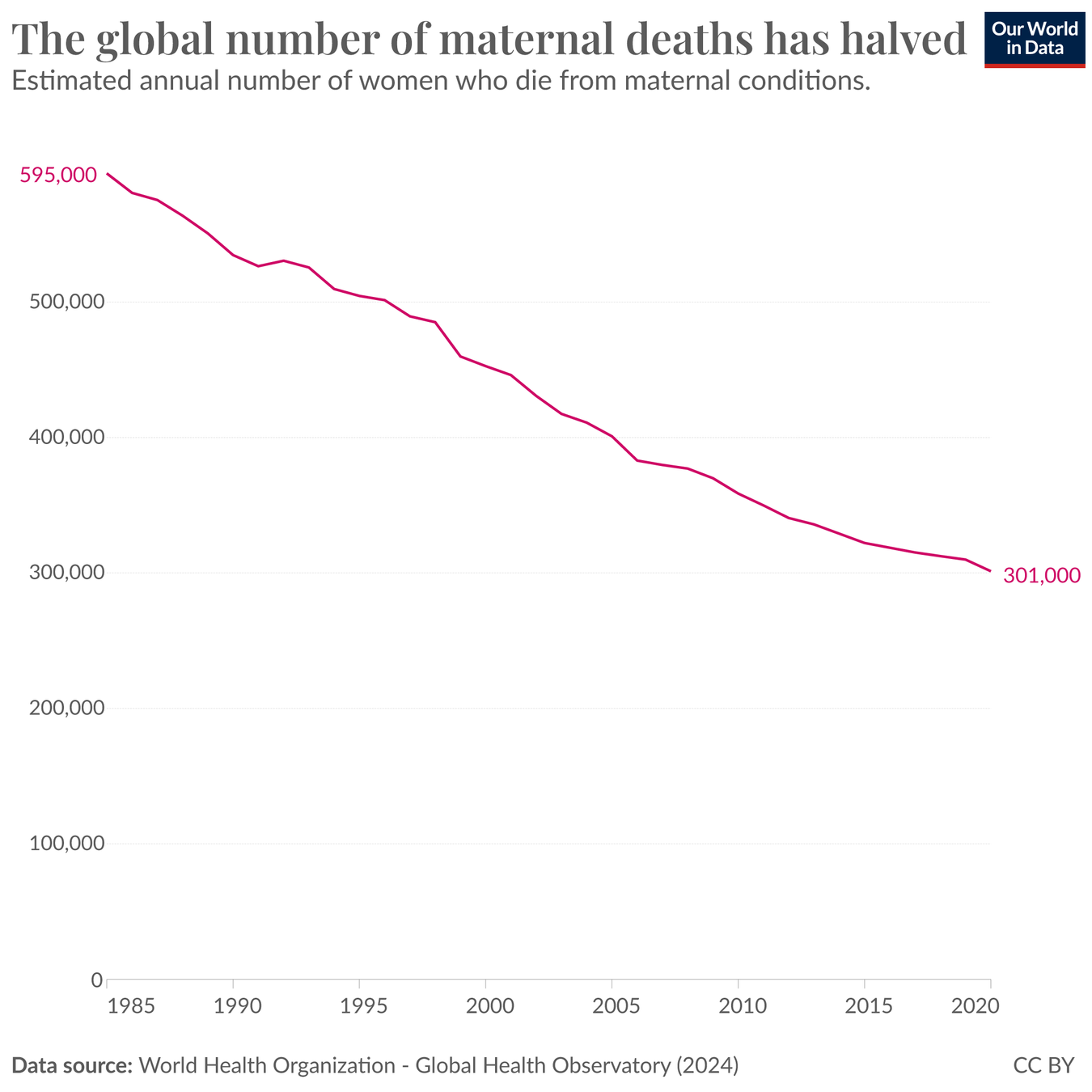
Kenya sees biggest upgrade to its vaccine cold chain in years
Kenya's immunization system just received an upgrade—over 2,000 pieces of new cold chain equipment. This will increase vaccine equity across the country. The new equipment includes solar-powered refrigerators, which are being installed by trained technicians to ensure effective vaccine storage and distribution. Gavi
Cancer survival rates continue to increase in Canada
The age-standardized mortality rate has fallen from 200 per 100,000 people in 2014 to an estimated 177 per 100,000 people in 2024, a decline of around 12% in a decade. This decline likely stems from continued efforts across the cancer control spectrum and improvements in prevention, screening, and treatment. CMJ
Deadliest form of heart attack falls by over half in United States
A recent study found that the rate of STEMI heart attacks, caused by a near-total blockage of a coronary artery, has decreased by nearly 50% over the past 15 years. However, there are still disparities in care based on income, with low-income individuals experiencing higher rates of STEMI heart attacks and being more likely to die from them. UPI
Myanmar reaches more children with vaccinations
Despite the pandemic and civil war, Myanmar significantly reduced the number of zero-dose children between 2021 and 2022 with the help of the WHO. Coverage of the pentavalent vaccine, which protects against five serious diseases, increased from 37% to 71% nationwide, reaching an additional 170,000 children. WHO
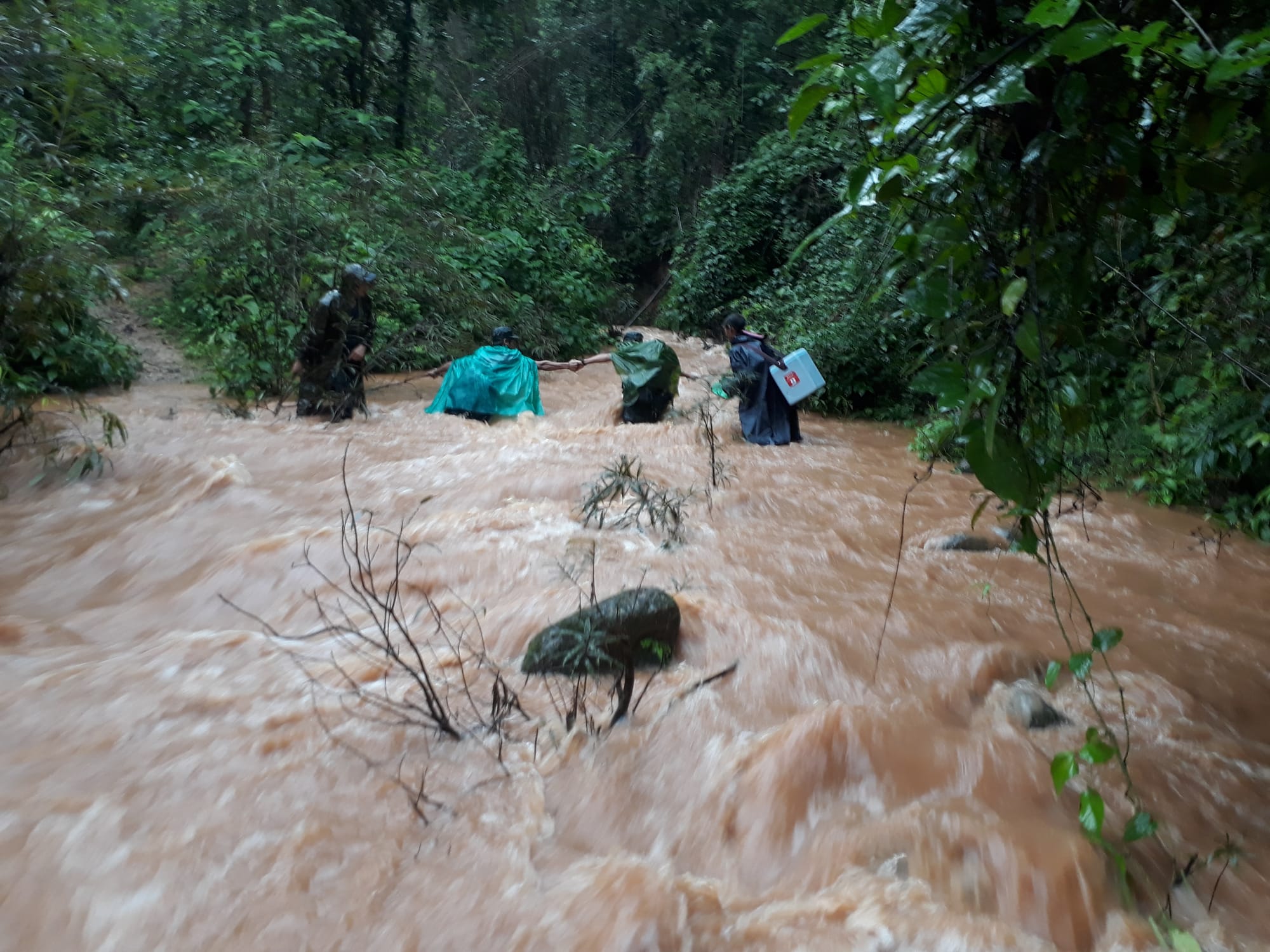
Air pollution is falling again in China
After progress faltered in 2023, the reintroduction of a pollution action plan has resulted in a decrease of 3.6% in national PM2.5 levels in the first three months of 2024. Independent satellite analysis has also shown a consistent decline in China's nitrogen oxide emissions since 2020, despite increased fossil fuel consumption. Bloomberg
Ten years ago, President Xi Jinping predicted that Beijing would enjoy lasting blue skies. Today, the temporary 'APEC blue' has transformed into the enduring 'Beijing blue' and 'China blue.' China now boasts the fastest air quality improvement worldwide.
Xie Feng, Chinese Ambassador to the United States
Lichtenstein legalizes same-sex marriage
Last week, the Alpine microstate Liechtenstein saw its parliament give final approval to same-sex marriage in a near-unanimous vote of 24-1. The bill will amend marriage law to allow same-sex couples to marry in the country of about 30,000 people nestled between Switzerland and Austria. Politico
Qatar improves access to education for 7 million children across Asia
The Qatar Fund For Development reports that it has achieved this milestone by building new schools, upgrading infrastructure, and supporting out-of-school children in 21 countries, with a particular focus on Nepal, the Philippines, and Bangladesh. The Peninsula
Kazakhstan criminalizes domestic violence
Kazakhstan just passed a law amending penalties for violence against women and children. The law addresses a spectrum of new issues, including domestic violence, sexual violence, bullying, and harassment, applying criminal liability to any intentional infliction of harm on another person, marking a 'victory for human dignity in the region and a monumental advance in human rights.' TCA
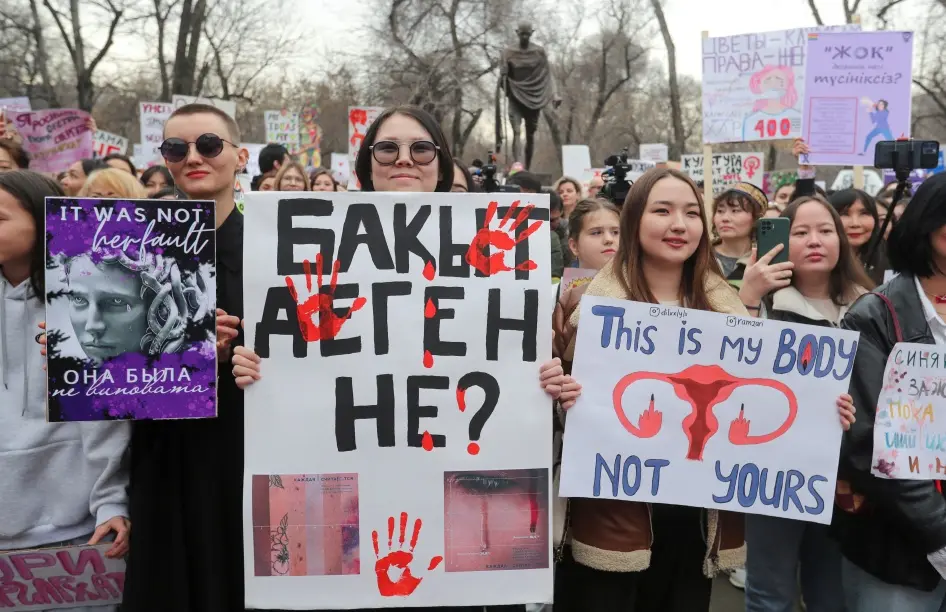
Even more good news you didn't hear about
New York just became the first US state to mandate paid time off for people receiving prenatal care, and its rate of gun violence has reached historic lows (crime-ridden hellhole, anyone?). Polio outbreak in Africa officially contained. The WHO just pre-qualified a new dengue vaccine, and it can't arrive soon enough. Malaysia is closing in on universal access to clean water and sanitation. Pope Francis continues to soften his tone on the Catholic Church's stance towards LGBTQ people. Vaccination efforts are making headway in La0 PDR, Afghanistan, Tanzania, Nepal, and Ethiopia. The US Department of Veterans Affairs just set an all-time record for benefits delivered to women veterans. Anaemia among pregnant and lactating women in Mumbai's slums has fallen from 52% to 38%. The real immigration crisis? Not enough immigrants. In the Philippines, around 800,000 fewer families consider themselves poor or hungry compared to a few months ago. Over a million people in rural Brazil are set to gain access to water and sanitation. Multiple countries around the world have hit on the same low-cost, simple solution for poor mental health: human connection.
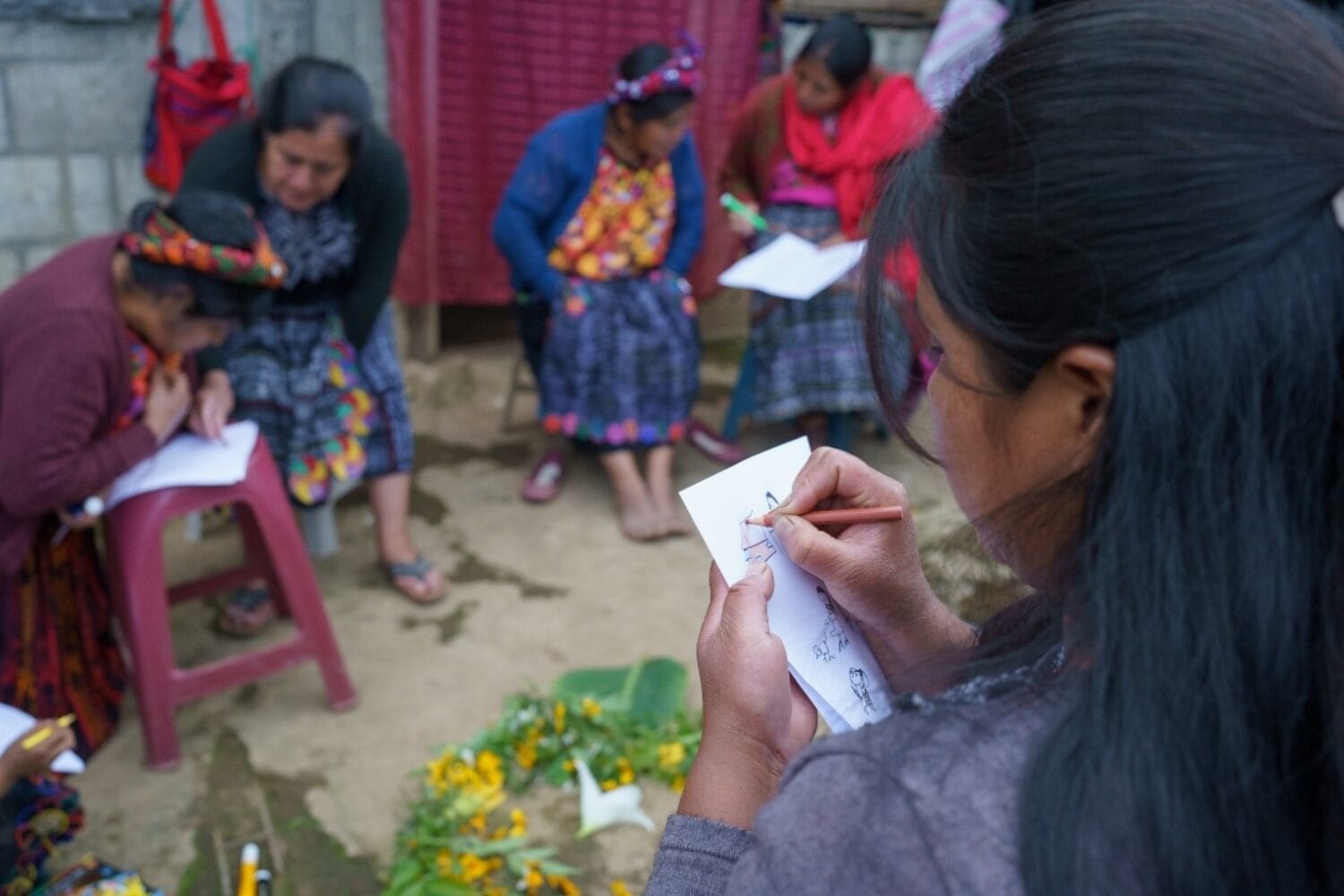
16th May 2024
Millions of deaths from malaria prevented in the 21st century
An estimated 2.1 billion cases of malaria—and 11.7 million malaria deaths—have been averted globally between 2000 and 2022 as a result of scaling up malaria control interventions—an astonishing public health achievement. The rollout of the new malaria vaccines provides fresh hope that progress can be maintained. WHO
Ebola tamed by vaccines
Remember Ebola? If you're wondering why you don't really hear about it anymore, it's because scientists came up with a vaccine, and there are now over half a million doses in the global stockpile. As outbreaks become smaller and containment happens more quickly, most of the doses are now being repurposed for preventive vaccination. WHO
EU adopts first law tackling violence against women
Lawmakers just gave the green light to the bloc's first law devoted to combatting violence against women. It requires countries to criminalise female genital mutilation, forced marriage, and online harassment and aims to protect women from gender-based violence, make reporting crimes easier, and impose jail sentences for offenders. DW
Over half a billion people freed from neglected tropical diseases
The WHO says that the number of people requiring intervention against NTDs has fallen from 2.19 billion in 2010 to 1.62 billion in 2022, a decline of 26%. This means that in just over a decade, 570 million of the world's most vulnerable people have been spared from the immense suffering caused by these diseases.
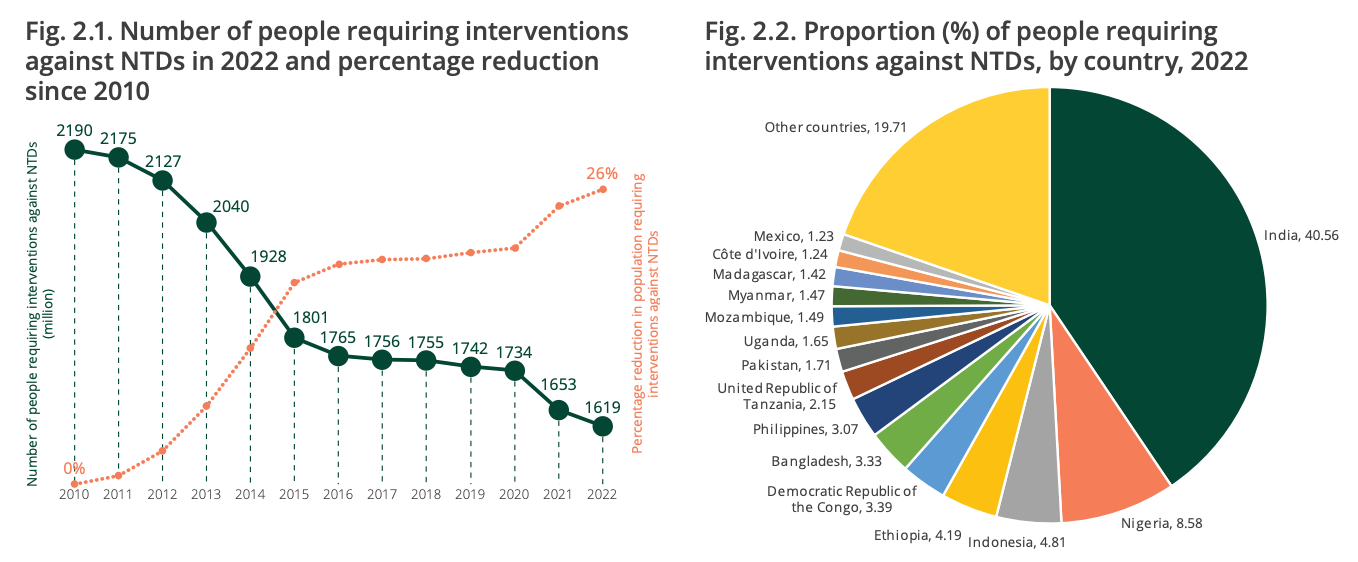
Belgian parliament approves labour law for sex workers
Following the decriminalisation of sex work in March 2022, the country's lawmakers have now passed a law that makes it possible for sex workers to work under an employment contract, giving them access to social security, pension and unemployment benefits, health insurance, family benefits, annual vacation, and maternity leave. Utsopi
Brazil murder rate falls to 14-year low
Brazil ended last year with its lowest record of intentional homicides since 2010, vehicle and goods theft down by around 10%, and financial crime down by 40%. Cases of robbery resulting in death fell by almost a quarter, and police launched 227 anti-corruption operations and 182 operations to combat illegal activities in the Amazon. Gov.br
Milestones for elimination of mother-to-child transmission of HIV
Belize, Jamaica, and Saint Vincent and the Grenadines have been certified by the WHO as having eliminated the mother-to-child transmission of HIV and syphilis, and Namibia has become the first high-burden country in the world to reach a significant milestone on the path towards eliminating mother-to-child transmission of both HIV and viral hepatitis B.
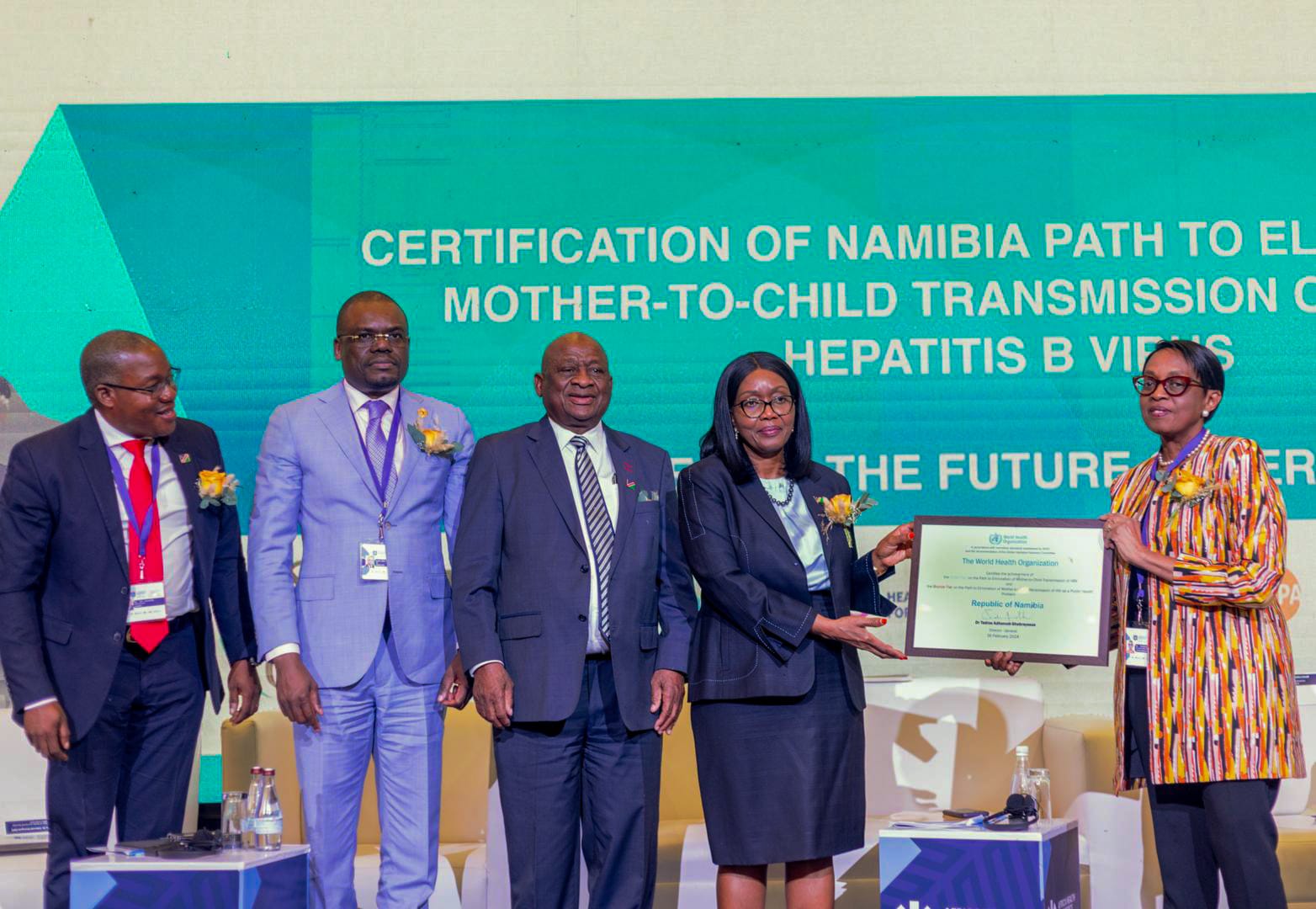
More girls are attending school in India
School enrolment in India has seen a steady increase over the last decade, from 96.7% in 2014 to 97.2% in 2018 and 98.4% in 2022. Female enrolment in particular has risen. The percentage of girl students between the ages of 11 and 14 not enrolled in school has dropped from 10% in 2006 to 2% in 2022. Scroll
Hate speech criminalised in South Africa
South African President Cyril Ramaphosa has signed a new law combating hate crimes and hate speech. The new law targets discrimination based on various characteristics. LGBTQ+ organisations have praised the law, which criminalises hate speech and hate crimes with penalties of fines or up to eight years in prison. Washington Blade
Crime is plummeting in England and Wales
Four in five people in England and Wales think that crime is getting worse. The data show the opposite: between 1995 and 2023, violence, burglary, and car crime have declined by more than 80%. The drop in violence includes domestic violence and other violence against women. Anti-social behaviour has similarly declined. The Conversation
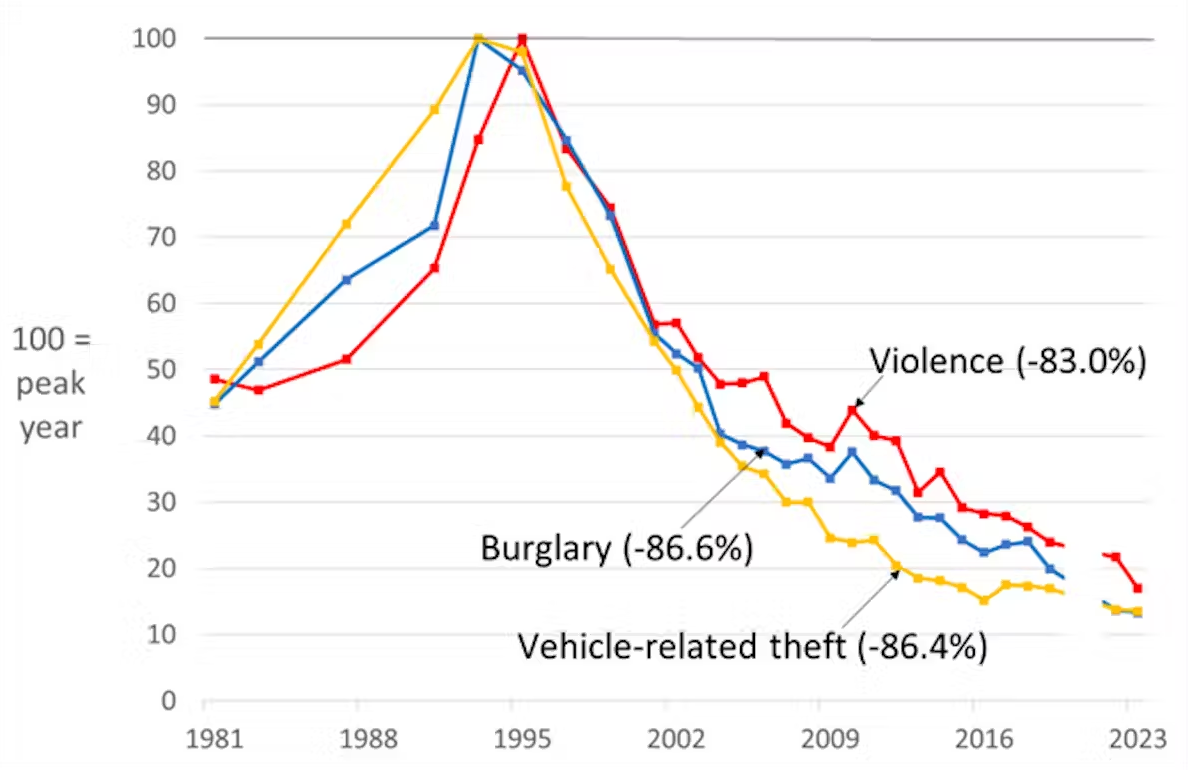
More good news you didn't hear about
Ghana’s fight against malaria has seen a major breakthrough, with a 90% reduction in malaria mortality since 2012. Mass shootings in the United States are down 29% from last year. The Kingdom of Saudi Arabia just pledged $500 million to end polio for good. World Central Kitchen has resumed its operations in Gaza. Real solutions to homelessness in the United States exist; Houston and New Orleans show the way. Student debts will be lowered for more than three million Australians. Schools in Rio de Janeiro have banned ultra-processed food and put Brazilian fruits and vegetables firmly back on the menu. One of America's largest Protestant churches just lifted its ban on LGBTQ clergy and same-sex weddings. 'We can expect to be more cognitively able than our grandparents were when we reach their age.' The real immigration crisis? Not enough immigrants.
28th April 2024
50 years of global immunisation
A new report estimates that since the 1970s, global immunisation efforts have saved an estimated 154 million lives—the equivalent of six lives every minute of every year. Vaccination against 14 diseases, including diphtheria, measles, polio, rubella, and tuberculosis, has helped reduced infant deaths by 40% globally and by more than 50% in Africa. Vox, WHO
Vaccines are among the most powerful inventions in history, making once-feared diseases preventable. Thanks to vaccines, smallpox has been eradicated, polio is on the brink, and with the more recent development of vaccines against diseases like malaria and cervical cancer, we are pushing back the frontiers of disease.
WHO Director-General, Dr Tedros Adhanom Ghebreyesus
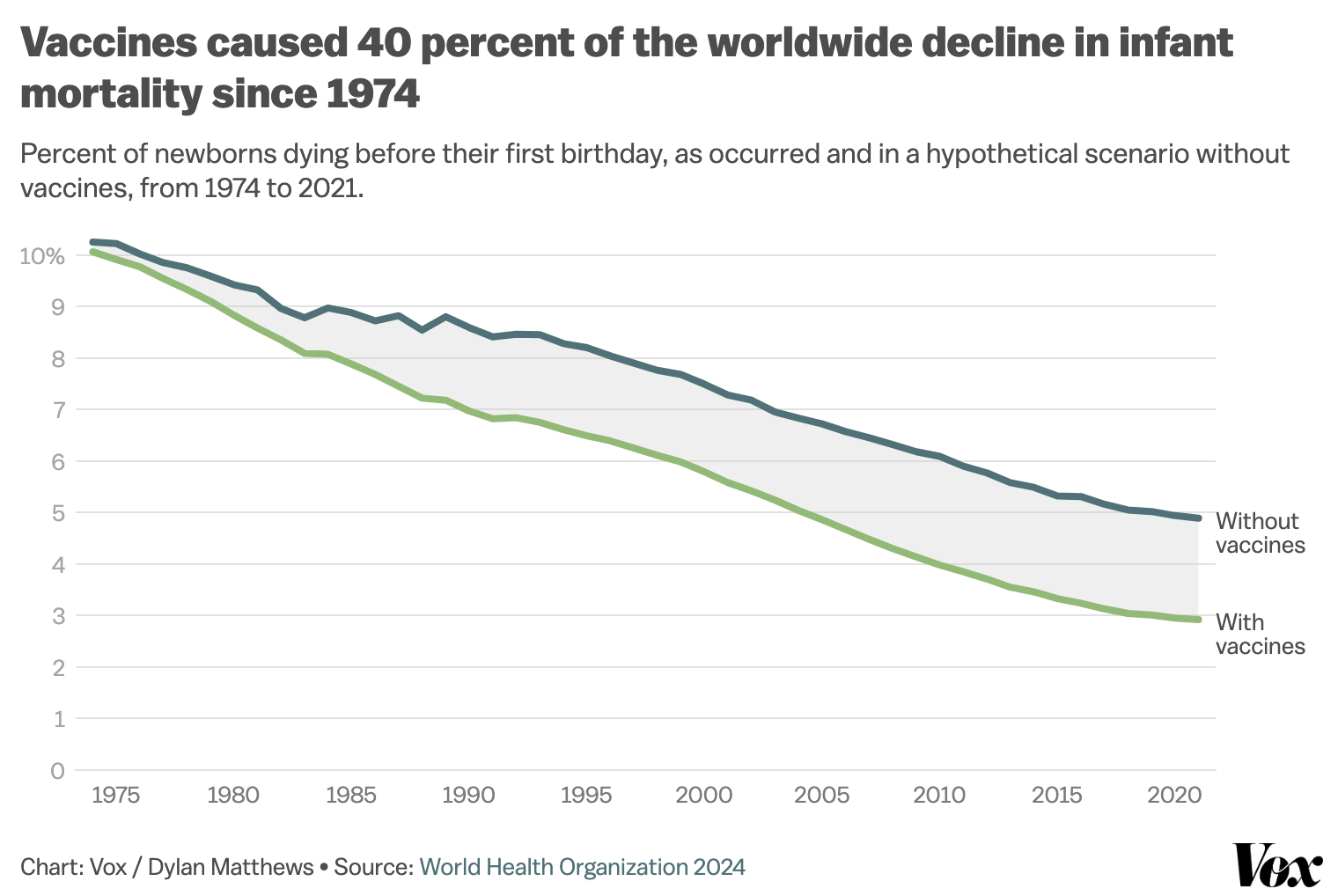
300 million people in Africa to get electricity by 2030
The World Bank and the African Development Bank have teamed up on an project that aims to halve the number of people without electricity through renewable energy systems and new distribution grids. Currently, 600 million Africans lack access to electricity, creating significant barriers to health care, education, jobs, and digital inclusivity. World Bank
Major step forward in rollout of malaria vaccines
Benin, Liberia, and Sierra Leone have launched their large-scale rollout of malaria vaccines, targeting millions of children across the three West African nations. The two vaccines—RTS,S and R21—will benefit around 200,000 children in Benin and 45,000 children in Liberia, and 550,000 doses will be delivered across Sierra Leone. WHO
Mosquito nets prevent 13 million malaria cases
Pilot studies have found an initiative that distributed 56 million second-generation bed nets across Burkina Faso, Benin, and Côte d’Ivoir potentially saved around 25,000 lives between 2019 and 2022. The nets were up to 50% more effective than traditional ones, reducing the risk of infection by up to 55%. Stat
Historic nursing home reform in the US sets staffing standards
The US is introducing a federal rule establishing minimum staffing levels in nursing homes, marking the most significant sector reform in decades and aiming to significantly improve care conditions. 'This is about dignity. This is about the dignity we, as a society, owe to those who care for the least of these.' The 19th
Significant milestone for LGBTQ rights in Dominica
Dominica's High Court has overturned a ban on consensual same-sex relations in the Caribbean island nation after a court ruled that the parts of the law that criminalised same-sex activity went against the country's constitution. 'The repeal of these discriminatory laws is a testament to the tireless efforts of activists, advocates, and allies who have long fought for justice and equality.' BBC

Maine signs transgender, abortion sanctuary bill
Maine has become the 16th state in America to explicitly protect trans and abortion care from prosecution. The bill, which faced a rocky road to passage, provides extensive protections against out-of-state investigations and adverse actions against medical providers. Washington Blade
US school meals to limit sugar
For the first time, the USDA has put a cap on added sugars in school meals. Starting in 2025, sugar will be limited in breakfast meals for 15 million students and lunch meals for almost 30 million students daily. Medical Daily
EU approves ruling to combat violence against women
The directive calls for stronger laws against cyberviolence, better assistance for victims, and steps to prevent rape. Under the new rules, female genital mutilation and forced marriage are prohibited, and they also establish guidelines for online offences like the disclosure of private information and cyberflashing. EU Parliament
EU to ban products made with forced labour
The European Parliament approved rules to ban the sale, import, and export of goods made using forced labour. If a product is deemed to have been made using forced labour, it will no longer be possible to sell it in the EU market and shipments will be intercepted at the EU's borders. Reuters
Gen Z are not doomed
While the popular view is that they will live grimmer, poorer lives than their elders, Gen Z are actually doing better than you think. Four-fifths of the world’s 12-to 27-year-olds live in emerging economies, and thanks to growth and technology, youngsters in places like Jakarta, Mumbai, and Nairobi are richer, healthier, and more educated than their parents. The Economist
12th April 2024
Global life expectancy has increased, especially in Africa
Over the past three decades, global life expectancy has increased by 6.2 years, due to reductions in leading killers like chronic respiratory diseases, stroke, and cancer. Eastern sub-Saharan Africa had the largest net increase, gaining 10.7 years, followed by South Asia, with 7.8 years, thanks to steep declines in deaths from diarrhoeal diseases. IHME
A landmark moment for intersex rights
In a historic vote, the UN Human Rights Council has passed a resolution to combat discrimination, violence, and harmful practices against intersex people. It’s estimated that 1.7% of the world’s population is born with intersex traits, and activists are now focused on using the resolution to lobby for legislation and improve medical and mental health services. UN
America to close gun show loophole
Under a new ruling, dealers who sell weapons at gun shows or online will face the same requirements as gun stores, including federal licenses and background checks on would-be buyers. With an estimated 23,000 individuals engaged in unlicensed gun dealing in the US, the new measures will impact tens of thousands of gun sales per year. Reuters
Ghana’s free high school policy is working
In 2017, Ghana made high school free for all students following an election campaign, and over the next four years the country spent $392 million on implementing the policy. It worked. For both girls and boys, the policy increased the completion of senior high school by 14.9%. The Conversation
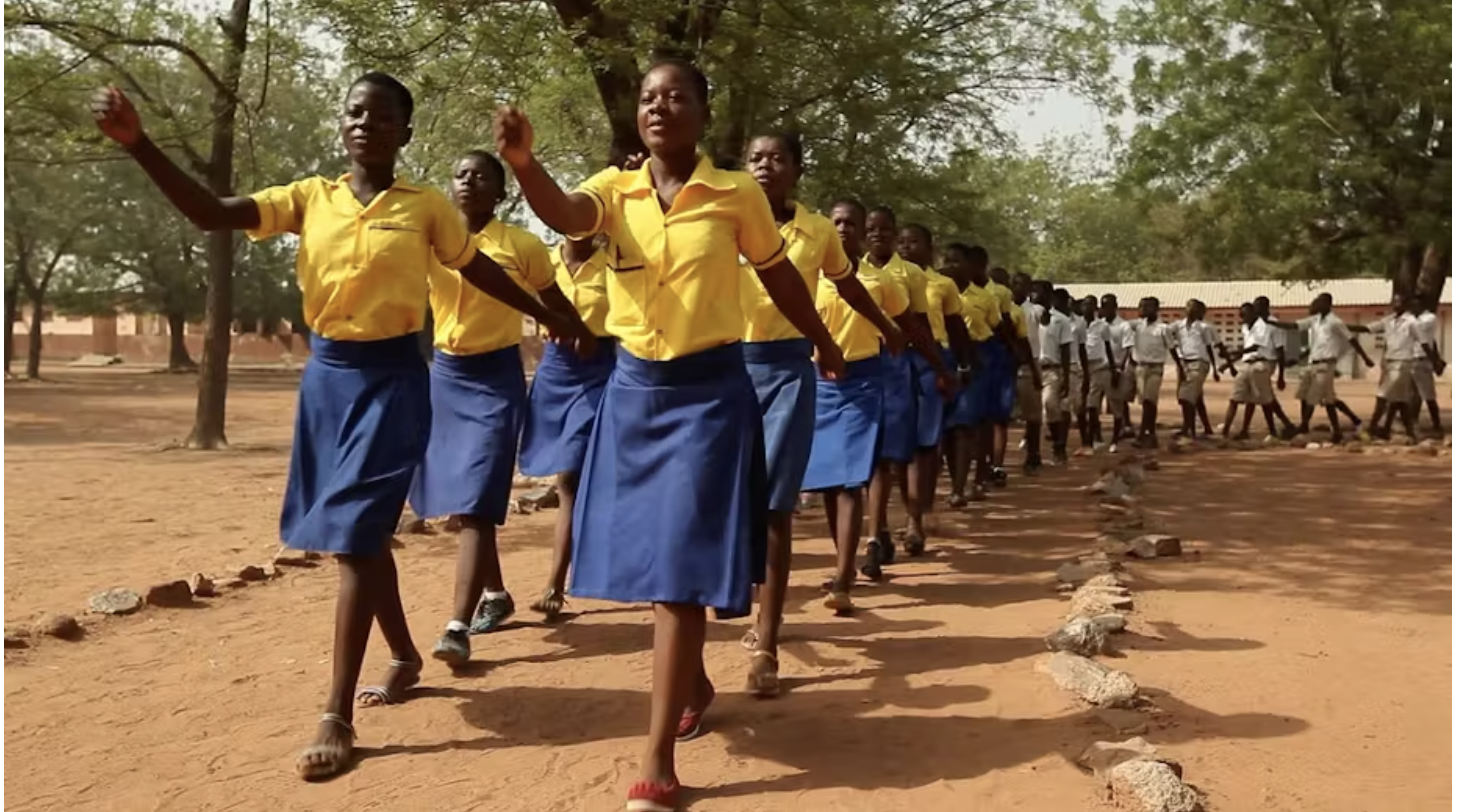
Democracy wins in Senegal
More on what might be the best world politics story of 2024 so far. Despite attempted delays and imprisonments by the former president, Senegal pulled off a free and fair election and a peaceful transfer of power to Bassirou Diomaye Faye. The victory was secured by young voters, indicating the rise of a new political class that will play a key role in democratic trends. Vox
“2024 is the biggest global election year in history and the future of democracy is on every ballot.”
EU votes for abortion as a fundamental right
The EU parliament has approved a proposal to include access to abortion in its Charter of Fundamental Rights, with 336 votes in favour and 163 against. While the resolution is a significant first step, it requires the green light from all 27 member states in order to take effect. Euro News
Nepal achieves unprecedented decline in poverty
National household survey data from the Nepal Living Standard Survey 2022/23 shows a large decline in poverty, from 25% to just 3.6% between 2011 and 2023 (using the 2011 National Poverty Line). The prosperity gap and inequality also decreased over the same period. World Bank
Rwanda is on track to light up every household
Over the past 15 years, Rwanda has significantly increased its electricity access from 6% in 2009 to 75% as of March 2024. It’s one of the fastest expansions in the world and is thanks in part to investment in renewables and off-grid solutions like solar home systems. The country has also connected 100% of healthcare centres and 84% of schools and small businesses. World Bank
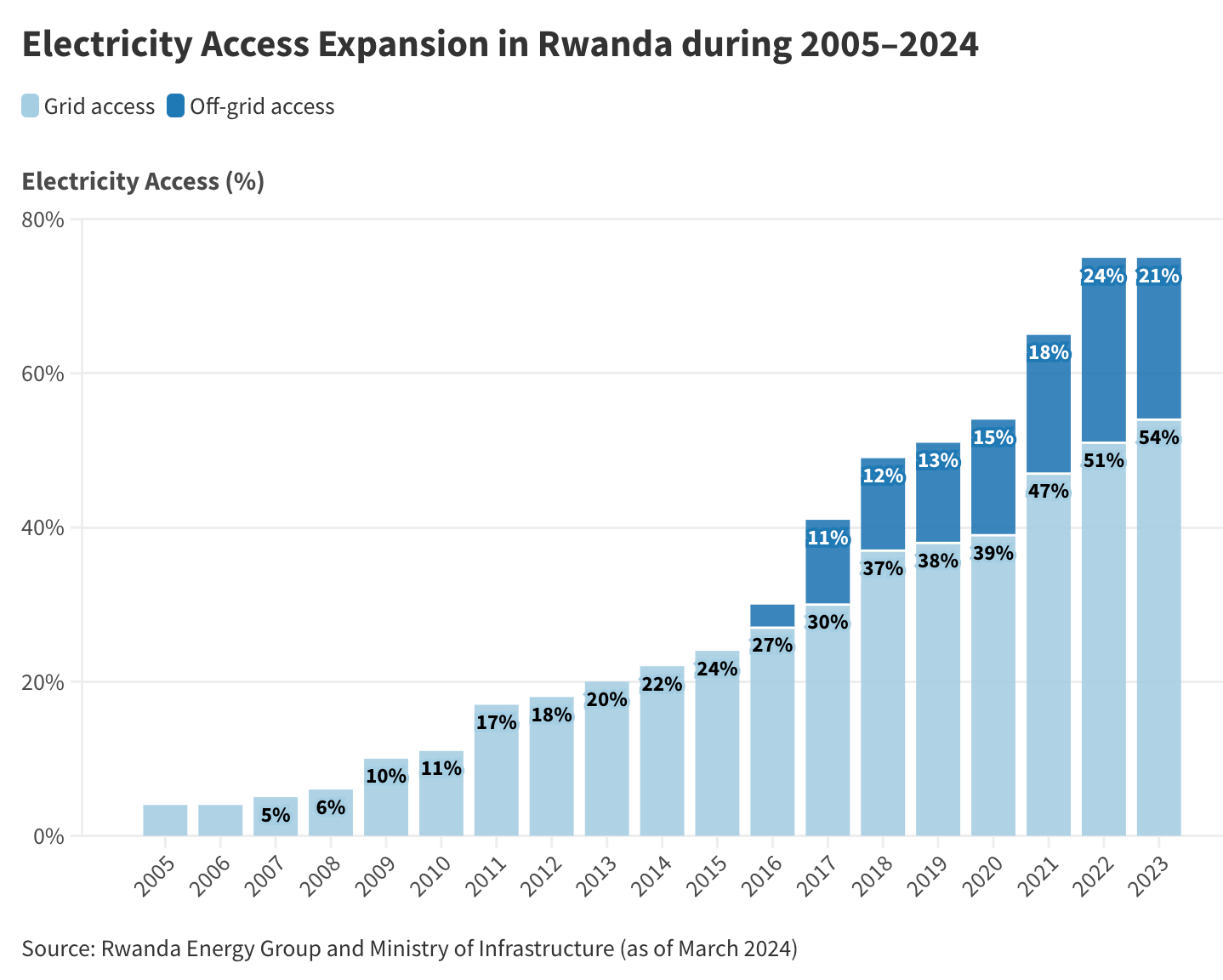
A roundup of global health news
Between 2011 and 2021, the number of new HIV infections and AIDS-related deaths across Africa decreased by 44% and 55%, respectively, and the number of TB deaths decreased by 26%. Nigeria is the first country in the world to roll out the 'revolutionary' new Men5CV vaccine for meningitis. A portable X-ray machine is helping the Philippines combat tuberculosis. Morocco has also reduced its under-five mortality rates from 81 deaths per 1,000 live births in 1990 to 17 in 2022. Clinics are starting to offer AI model-supported mammograms to help detect cancer earlier than standard methods. The Gambia has completely transformed its health system by registering more than half its population and issuing national health insurance cards.
More good news you didn't hear about
India plans to transition from a minimum wage to a living wage by 2025 to ensure all basic needs are met. How Jamaica halved its debt in just 10 years. The Netherlands has upgraded prison healthcare to address mental health disorders. Kenya has increased access to electricity from 5% to 71% in the past 25 years. An historic victory for the protection of civil rights activists in Colombia. Kosovo rolls out the HPV vaccine. The incredible story of how Egypt won its battle against Hepatitis C. A new rapid diagnostic test to ramp up the fight against cholera. Early childhood interventions have benefited 14 million mothers and children in Senegal through education and nutrition services. Western Australia has extended its provision of free period products to public primary schools. Find out more about the legislative reforms that made Spain a pioneer in combating gender violence.
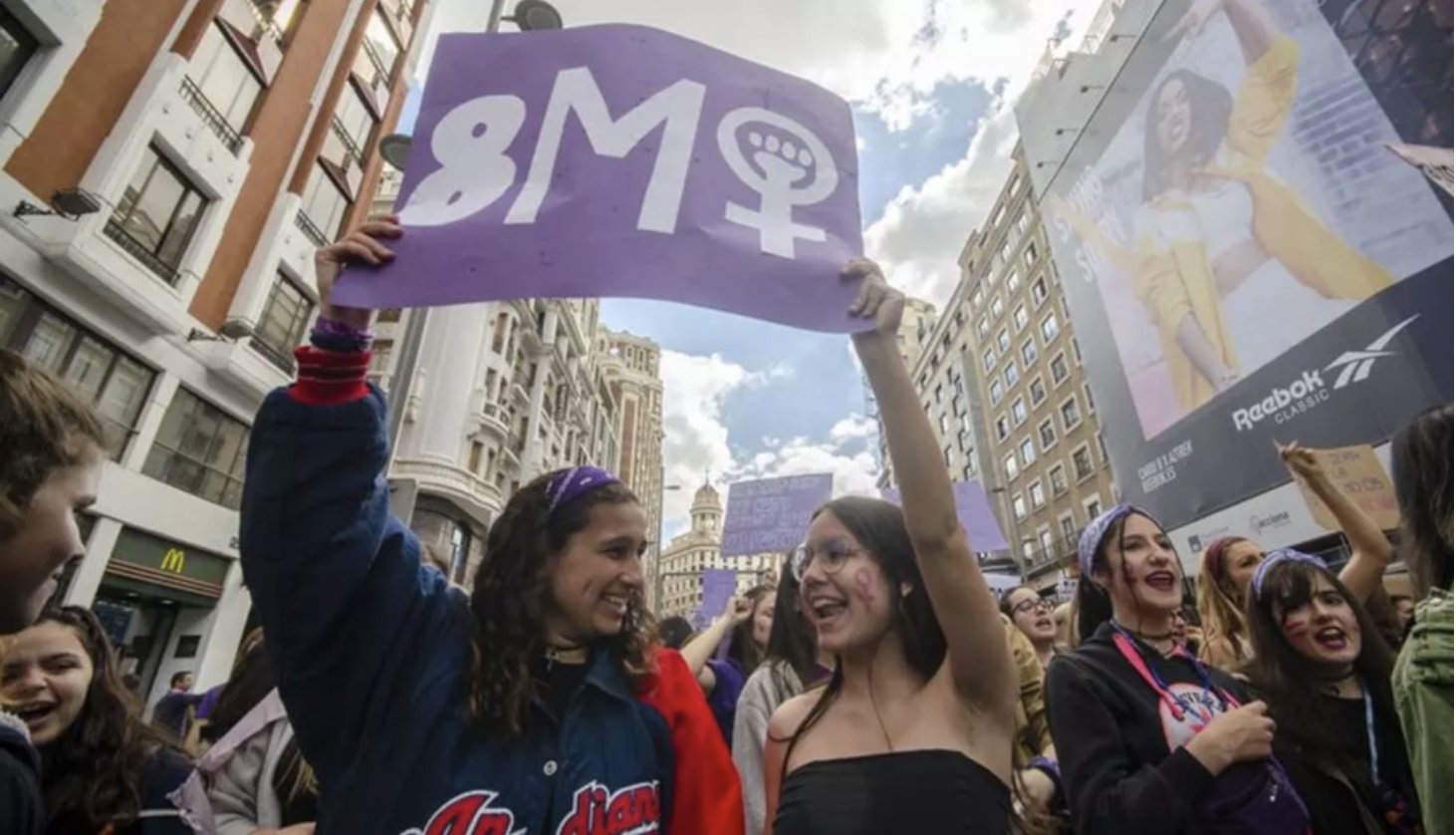
5th April 2024
World population to start falling decades earlier than thought
Most people assume that population growth will continue at ever-increasing rates into the foreseeable future, and that it will necessarily have detrimental impacts to people and the planet. However, the global total fertility rate has more than halved over the past 70 years, from around five children for each woman in 1950 to 2.2 children in 2021. A new study published last month in The Lancet now estimates that we could fall below the replacement level of 2.1 as soon as 2030.
Thailand takes a major step towards marriage equality
Last week 400 of the country's 415 members of lower parliament approved a draft bill to legalize same-sex marriage and allow same-sex couples to adopt. If passed, Thailand would become the first country in Southeast Asia to recognize the right of all people to marry. BBC
Global efforts to combat tuberculosis ramps up
The WHO and Doctors Without Borders just launched a major initiative in a dozen countries aiming to improve diagnosis and treatment among children; Phase 3 trials of the first TB vaccine in 100 years have kicked off in South Africa; and in the UK, scientists say they've developed a powerful new TB blood test.
Cancer mortality has declined in many countries
Check out this striking graph from the team at Our World in Data, showing age-standardised death rates from cancer in different countries since 1950. The main driver is the decline in smoking—but it's also down to advances in cancer medicine and public health, as well as improvements in screening, diagnosis, and monitoring.
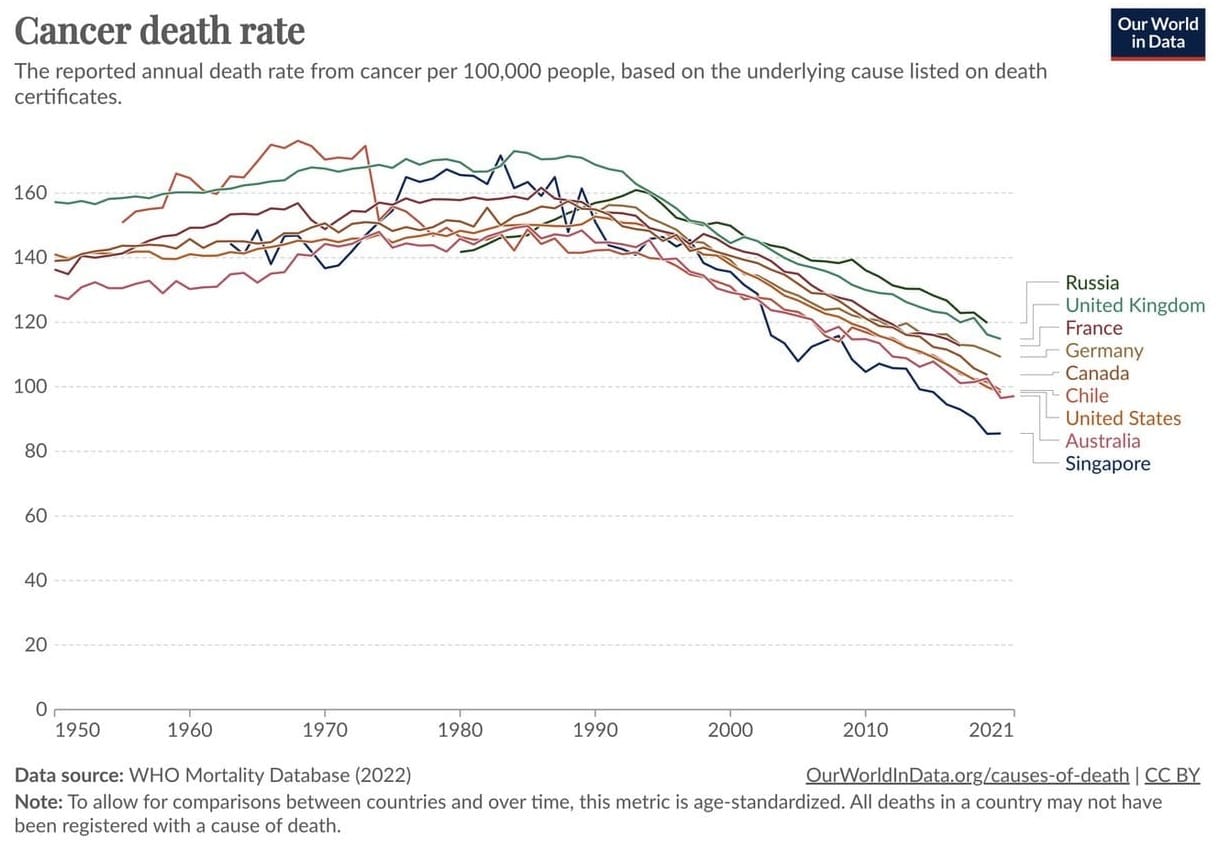
Three countries making uncelebrated progress on poverty
Uzbekistan has witnessed a sharp decline in child poverty, falling from 21.5% in 2021 to 13.7% in 2023; in the Philippines, a new report estimates the poverty rate could soon fall to single digits; and in Cambodia, average incomes have grown fourfold since 1990 and average schooling has increased from 2.4 to 5.1 years.
Murder rates in the United States have plummeted in 2024
It's still early days, and not all the data are in, but in more than 180 cities with available data, murder is down about 20% this year compared to a similar time frame last year. A decline of even half that magnitude would place the US murder rate back on par with its pre-COVID lows. Jeff Asher
Access to voting in the United States is becoming more democratic
A new report shows that since 2000, it has become a lot easier to vote in America, with a majority of states offering early in-person and mail voting options to voters. Despite some efforts to restrict access, nearly 97% of voting-age American citizens now live in states that provide the option to vote before Election Day. NPR
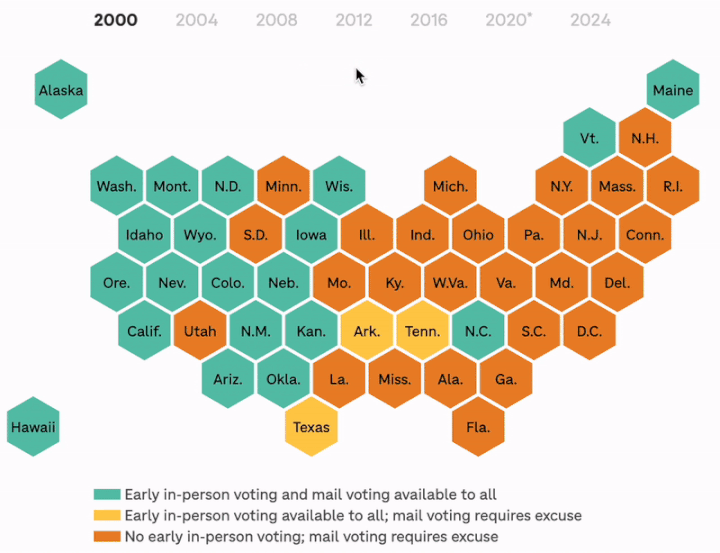
Australia pioneers a national strategy for autistic people
Australia is the first country to create an Office for Autism and the first to release a draft national autism strategy. 'That’s when we realised we needed someone solely focused on these autism policies. We didn’t realise no one had a position like this in the world.' SMH
Canada to offer free contraception to millions of women
The federal government has announced plans to cover the cost of popular contraceptive methods, including hormonal IUDs, birth control pills, and emergency contraceptives. The initiative aims to reduce financial barriers and empower women to make choices about their reproductive health. Women's Agenda
How a small city in Brazil managed to get every child reading
In 2001, 40% of Grade 3 students in Sobral could not read a single word. To improve literacy, authorities initiated a series of reforms, and within 12 years, Sobral went from being ranked 1,366th to first among Brazil’s municipalities for education quality, for both primary and lower secondary education. CRPE
More good news you didn't hear about
Iraq pulls off a world-first by achieving polio transition status. India is ahead of its target in its quest to eliminate the transmission of elephantiasis by 2027. More than half a million people in Northern Brazil will benefit from a new initiative for social services, food security, and education. Despite disruptions, global trade is proving resilient, with indicators looking their best since the end of 2022. Malawi legalises the cultivation of cannabis for industrial and medicinal use. US traffic deaths fell 3.6% in 2023, the second straight yearly drop. North Macedonia has passed a law protecting child rights. In Timor-Leste, a deworming drive to combat soil-transmitted helminthiasis has reached over 300,000 children. Access to electricity in West Africa increased from 45% in 2019 to 52% in 2023. Africa's largest wastewater treatment plant is about to get even bigger. Finland looks like it might become the first country in Europe to eliminate homelessness.

28th March 2024
India makes significant progress on malaria
Since 2016, India has made remarkable progress in combatting one of the country’s biggest public health challenges. In 2022, there was an 85.1% decline in malaria cases and 83.3% fewer deaths compared to 2015. The country is now focused on managing the disease in hard-to-reach areas. WHO
Cambodia reaches TB targets four years ahead of schedule
Over the last two decades, Cambodia has achieved a 45% decrease in both tuberculosis deaths and new cases, thanks to free-of-charge treatment and high treatment rates (over 90%). Since 2000, the country’s TB control efforts have saved an estimated 400,000 lives. The Star
Everything in America is awful
Apart from the fact that marriage rates are up and divorce rates are down, the percentage of Americans without health insurance has fallen by almost half since 2010, employment for people in their prime working years is at its highest level in more than two decades, manufacturing construction spending has climbed to $225 billion per month, cholesterol levels are gradually improving across the country, and life expectancy has increased for the first time in two years thanks to a levelling off of overdose deaths.
Netherlands adopts consent-based definition of rape
In a historic victory for survivors of sexual assault, the Netherlands has become the 17th EU state to legally recognise that sex without consent is rape. The reform comes after years of activism and is 'an important move towards preventing and combatting sexual violence and improving access to justice for survivors.' Amnesty
Senegal reverses constitutional crisis and conducts free elections
Our friends at the Progress Network have a great story on how Senegal managed to avert a potential fight over executive versus judicial legitimacy in the lead-up to its recent elections. Instead, the country saw a high voter turnout and the first election of a progressive party since 2000.

How Mauritius became a development success story
In the 1960s, Mauritius was a sugarcane-based, low-income country with a per capita income of $260. Today it's a politically stable, upper-middle-income country with a per capita income exceeding $10,000. This development ‘fairytale’ resulted from strategic efforts to boost and diversify growth across agriculture, tourism, financial services, and information technology. World Bank
Mauritius improves healthcare for 260,000 seniors
The island is also stepping up its healthcare to provide for a rapidly ageing population. The integrated approach includes early screening for physical and mental impairments for older people, four new dementia clinics, targeted training for healthcare workers, and national awareness campaigns. WHO
Abortion decriminalised in every state and territory in Australia
Western Australia was the last state to include abortion care access in its criminal code. New changes to the code mean that patients in Australia can no longer be criminalised for abortion care access, a hard-won milestone for the country. Woman's Agenda
A victory for migrants and refugees in Canada
All ten provinces in Canada have now confirmed they will no longer allow the federal government to detain migrants and asylum seekers in local jails. The victory is thanks to the #WelcomeToCanada campaign that launched in 2021 to end the practice. HRW
We commend the provinces for their decisions to stop locking up refugee claimants and migrants in jails solely on immigration grounds. There is now clear pressure for the federal government to stop this rights-violating system across the country.
Ketty Nivyabandi, Secretary General, Amnesty International Canada
Africa's 'deep-rooted' culture of religious tolerance
Africa is one of the most religious places on earth, and it also has one of the highest rates of religious tolerance. On average, almost 9 out of 10 people say they would live next door to people of a different religion. Of the 47 Muslim-majority countries in the world, only 11 protect the right to religious freedom—eight of which are found in Africa. DW
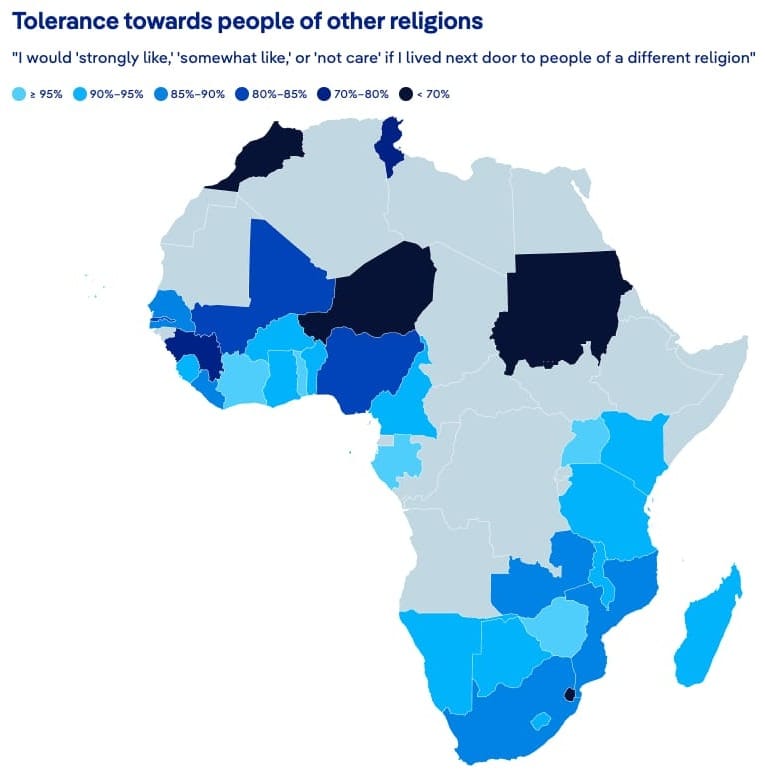
More good news you didn't hear about
Africa has achieved its highest detection rate for TB, with around 70% of cases now being diagnosed and treated. Colombia has extended a ceasefire with ELN rebels for another six months. A new project will improve health services for 7.5 million people in Lao PDR. Irrigation systems in the Sahel are changing the lives of 390,000 small farmers, 49% of whom are women. Jamaica’s social protection system is being bolstered to benefit 290,000 vulnerable people. India is getting serious about eliminating measles. Brazil is releasing millions of anti-dengue mosquitoes to combat an outbreak of the disease. A new study says we’re getting closer to a universal anti-venom for snake bites. South Africa has restored almost 25% of farmland to original owners since the end of apartheid. Innovative measures are being used to solve water scarcity in the Gulf. A biodegradable contraceptive implant could improve access to contraception globally. Cutting-edge cancer therapy is now being produced in India for one-tenth of the cost. North Macedonia has halved its poverty rate since the global financial crisis.
21st March 2024
Global child deaths fall to their lowest level ever
The number of children who died before the age of five hit a historic low of 4.9 million in 2022, less than half the number who died in 2000. Some countries such as Malawi, Rwanda, Cambodia, Mongolia, and Uzbekistan have reduced child deaths by more than 75% since 2000. NPR
Type B influenza may be on track for elimination
One of the silver linings of the pandemic was that the restrictions eliminated the Yamagata lineage of type B influenza—a viral source of death and disease, especially among children. Scientists now say it might be possible to eliminate the second strain, known as the Victoria lineage, leading to the end of influenza B worldwide. Bloomberg
FBI confirms huge decline in crime in the United States
New data from over 13,000 agencies, covering all of 2023, have shown that there was a 13% decline in murder last year (the largest one-year decline ever recorded); a 6% decline in violent crime, likely the lowest rate since the late 1960s; and a 4% decline in property crime. Fox News has been strangely silent. Jeff Asher
Billions gain access to clean cooking
A new report from the Clean Cooking Alliance says that more than 1.5 billion people have gained access to clean cooking (i.e. not using biomass, kerosene, or coal) since 2010, and that last year saw significant accomplishments, with new commitments from national governments and record levels of investment.
School feeding programs take off in Africa
School feeding policies are now in place in 48 out of 54 countries in Africa, supporting 15% of all students in low-income countries and more than half of students in upper-middle-income countries. Meals are also becoming healthier and more diverse, including legumes, vegetables, fruits, meat and dairy. WFP
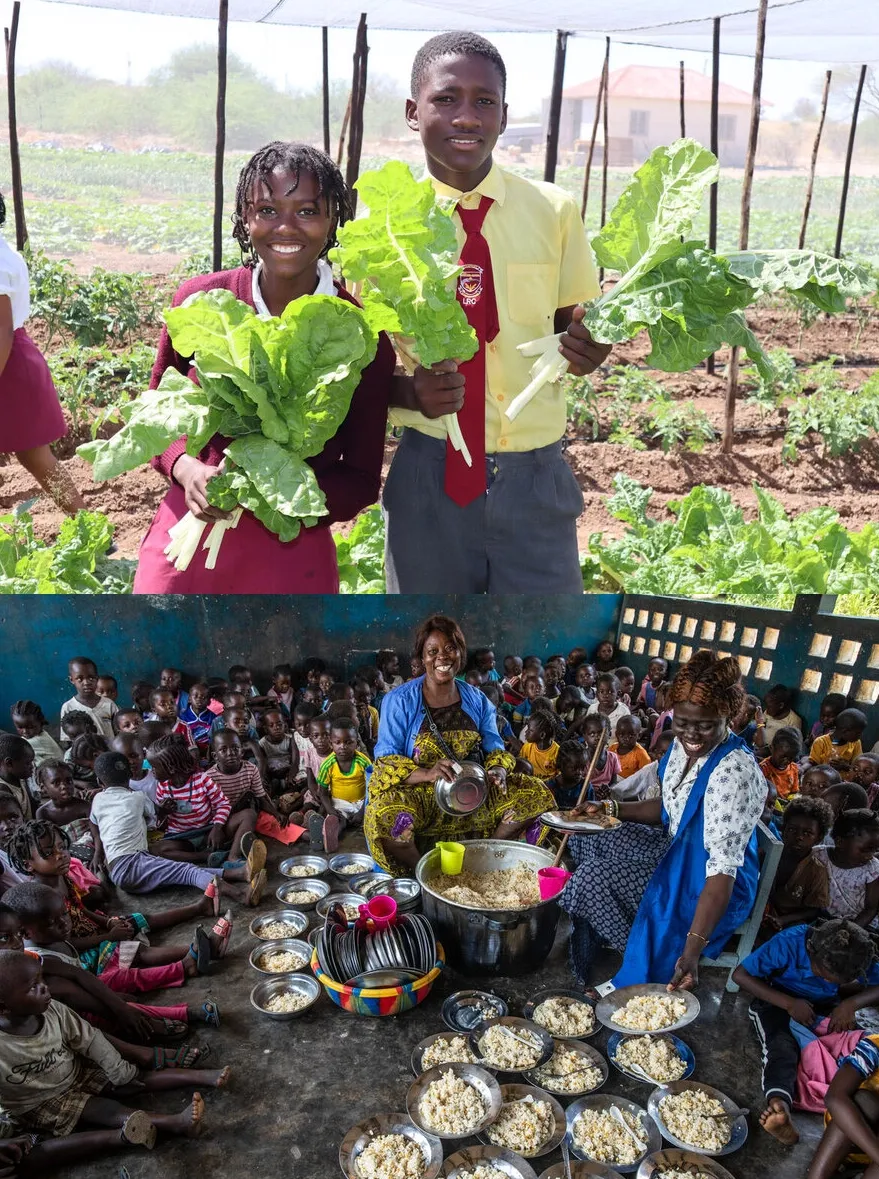
EU backs new law to protect human rights in supply chains
The proposed law would enforce stricter checks on forced labour and environmental damage outside the EU and would apply to companies with over 1,000 employees and annual revenues of over €450 million. It will now proceed to a final vote in the European Parliament. DW
Croatia passes law making femicide a specific crime
Croatia's parliament has approved changes to the criminal code making the killing of women because of their gender a distinct crime. Anyone found guilty of femicide faces between 10 and 40 years in jail, the toughest punishment provided for under Croatian law. RTE
Japanese courts make historic rulings on same-sex marriage
The LGBTQ community in Japan is hoping the country is one step closer to legalising same-sex marriage, after two separate courts last week ruled that the country's ban was unconstitutional. Support for same-sex marriage is now at 70% nationally. ABC
Thailand takes a big step towards same-sex marriage
A bill to legalise same-sex marriage cleared its first legislative test last week after a committee set up by the House of Representatives approved it, setting it up for a final vote in the House on 27th March. After that it will need to be approved by the Senate, after which it's expected to pass into law by the end of the year. The Diplomat
The world's largest economy is getting more equal
Wages are growing faster than inflation (and most strongly for the most vulnerable), households are more financially stable than they've been in decades, and the number of startups is higher than before the Great Recession, but tacos are still expensive, so who can say whether anyone is better off than they were four years ago?
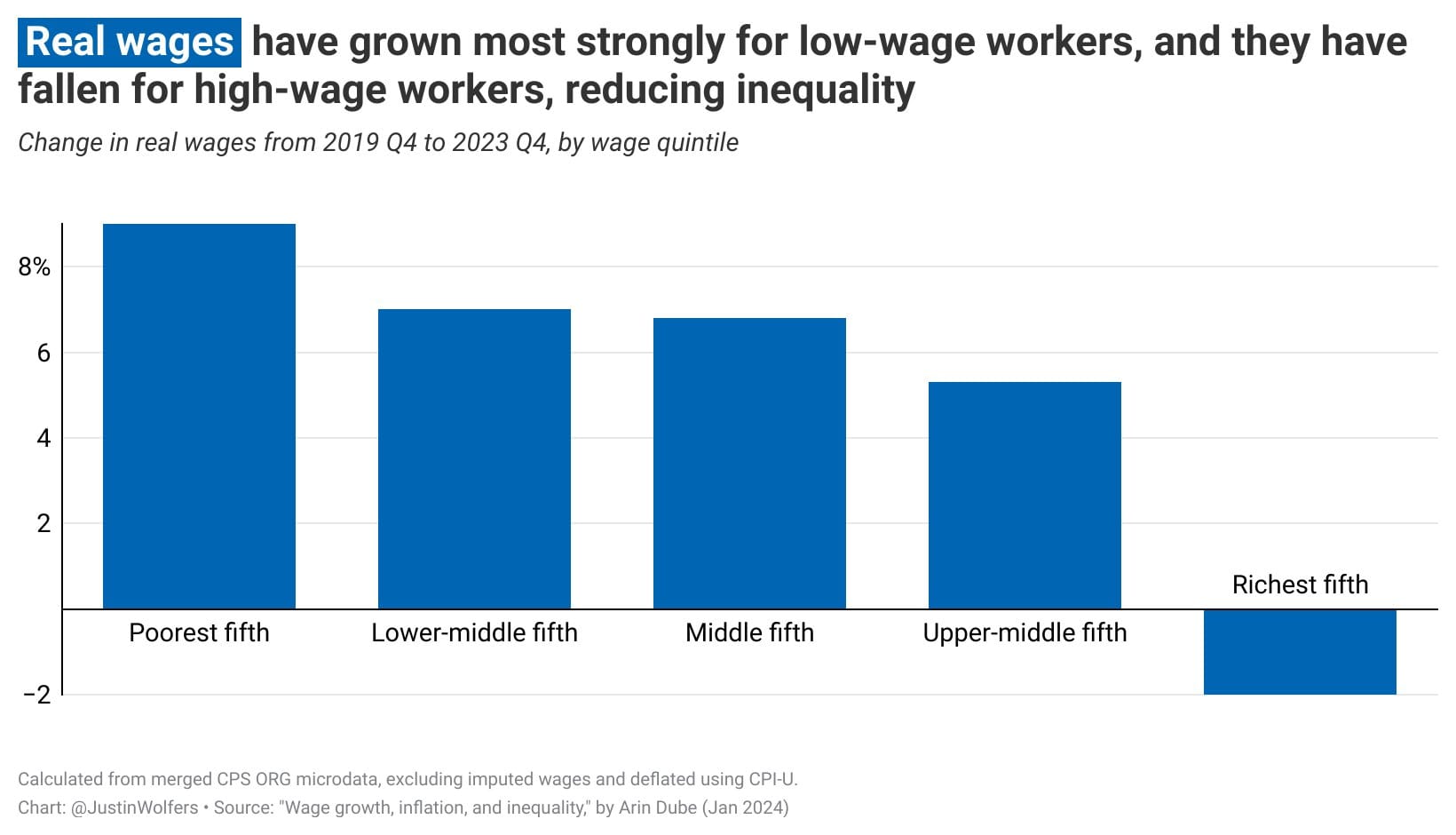
More good news you didn't hear about
A huge sigh of relief as the US Congress re-authorises PEPFAR, arguably the most successful public health initiative of the 21st century. Lichtenstein's parliament just voted 24-1 to legalise same-sex marriage. The African Development Bank says Africa will have 11 of the 20 fastest-growing economies in the world this year. McKenzie Scott has now given away $16.5 billion from the fortune she came into after divorcing Amazon founder Jeff Bezos. Over 200 tons of aid and food has now reached Gaza by sea. Fewer middle-aged people are dying from cancer in the UK than at any other point in the last 25 years. Gene editing for sickle cell disease is expensive, but it's going to get a lot more accessible. Since its launch in 2016, 1.8 million Sri Lankan citizens have used the country's free ambulance service, which has one of the fastest response rates in the world. Ethiopia’s social safety net is helping more than 9 million poor and vulnerable people, mostly through digital payments. Mexico is investing about €5 billion in clean water. Crime in the Philippines has dropped by at least 21% this year. The Yakuza crime groups are on the verge of disappearing:
14th March 2024
The global effort to eliminate cervical cancer got a huge boost last week after donors pledged nearly $600 million towards fighting the disease. In a joint statement, the World Bank, the Gates Foundation, and UNICEF said that the funding will go towards expanding access to vaccination, screening, and treatment worldwide. Reuters
In one of the first initiatives of its kind in the world, pharmacies in Catalonia, Spain, have begun to provide free products for the region's roughly 2.5 million women, girls, and transgender and nonbinary people who menstruate. They will receive one menstrual cup, one pair of underwear for periods, and two packages of cloth pads at local pharmacies free of charge. AP
Cystic fibrosis once guaranteed an early death: a child born in the early 2000s could expect to live until age 35. Then in 2019, Trikafta—a new drug combination that corrects the misshapen protein that causes cystic fibrosis—came along. Today, those who begin treatment in early adolescence can expect to survive to 82—an essentially normal life span. Atlantic
The world has made incredible progress on rubella elimination in the last decade. Between 2012 and 2022, the number of countries including rubella vaccinations in their immunisation schedule increased from 132 to 175, and the percentage of the world’s infants vaccinated increased from 40% to 68%. By 2022, 98 countries had eliminated the disease altogether, up from 84 in 2019. WHO
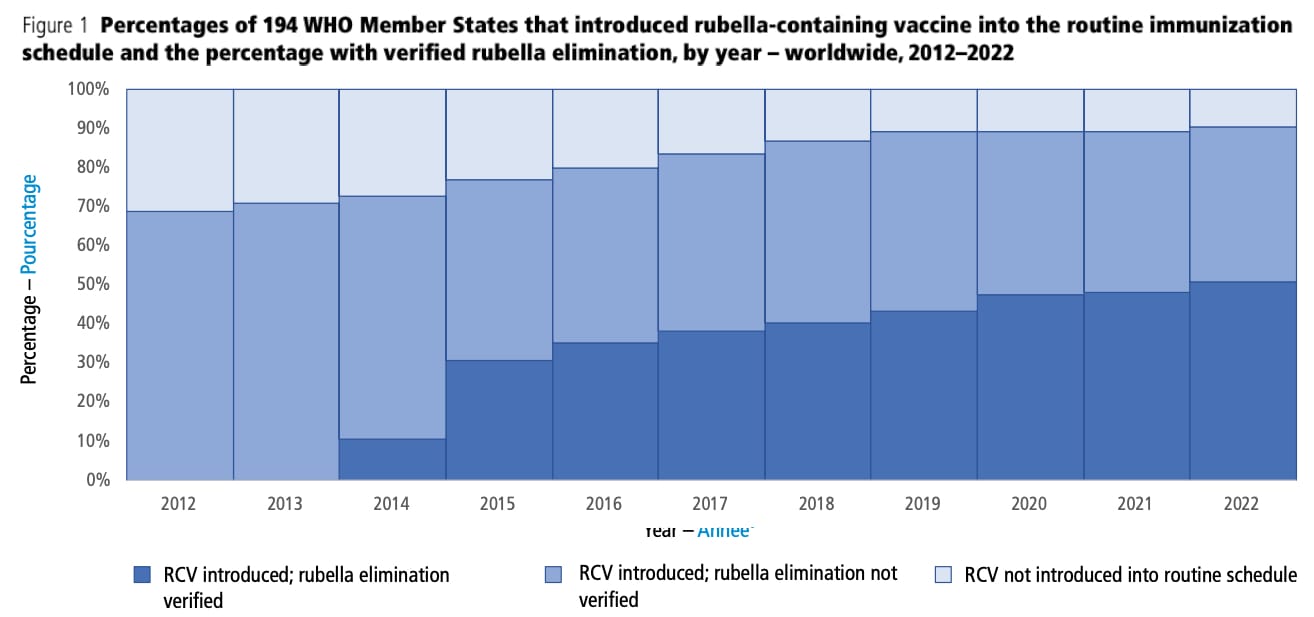
Nepal has made amazing progress in maternal and neonatal healthcare, thanks to its pioneering Safe Motherhoood Programme. Maternal mortality has declined from 536 per 100,000 live births in 1996 to 151 per 100,000 live births by 2021, and 70% of women now receive postpartum care within the first two days after giving birth. Nepali Times
The US Environmental Protection Agency just announced $2.6 billion for wastewater and stormwater infrastructure improvements and $3.2 billion for improving drinking water systems across the United States, part of a massive federal effort to ensure safer, more reliable water access and quality. #MAGA. Bloomberg
Launched in 2015, the Takaful and Karama Programme ('Solidarity & Dignity' in Arabic) is Egypt’s national social safety net, providing cash transfers to poor households with children under 18, as well as to the elderly poor, orphans, widows, and persons living with disabilities. As of December 2023, the programme had reached around 17 million citizens, 74% of whom are women. World Bank
Xavier Sala-i-Martin, one of the world's most respected economists on the topic of economic growth, has just co-authored a paper showing that not only have global poverty and inequality been falling since the 1990s, but so has within-country inequality. The paper was released about two weeks ago and still hasn't received a single mention by a news organisation. NBER
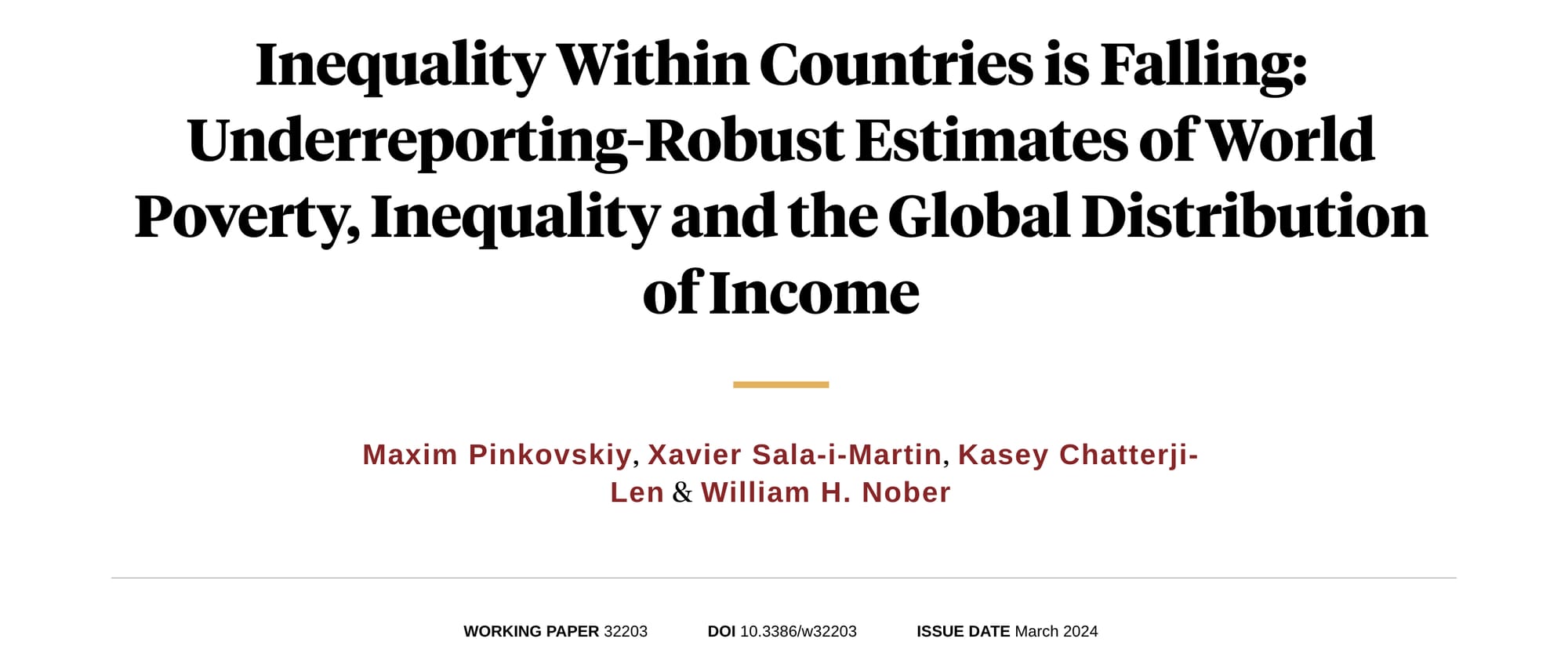
Uzbekistan has witnessed substantial economic growth over the past two decades, accompanied by a remarkable decline in poverty rates, from 28% in 2000 to 14% in 2022, lifting millions of people out of poverty. The pandemic caused some big setbacks, but now poverty reduction efforts are back on track. UNDP
The share of women in sub-Saharan Africa who own a financial account has more than doubled in the last decade, driven almost entirely by the adoption of mobile money accounts. Financial access gives women greater personal safety and less exposure to theft, more say over how household resources are spent, and greater ability to receive money from friends and family in the event of an emergency.
The EU Council and the European Parliament have reached a provisional agreement to ban the entry of products made with forced labour into the European single market. The bans would be enforced on goods made outside the EU by forced labour and on products manufactured in the EU with parts made abroad by forced labour. Reuters
America's shoplifting crisis was completely made up. In 17 of the 24 major cities which report data, shoplifting decreased in the last five years, including San Francisco—which saw a 5% decline in shoplifting between mid-2019 and mid-2023. This is the exact opposite of what all major US media outlets (including The New York Times and The Washington Post) have reported. Brookings
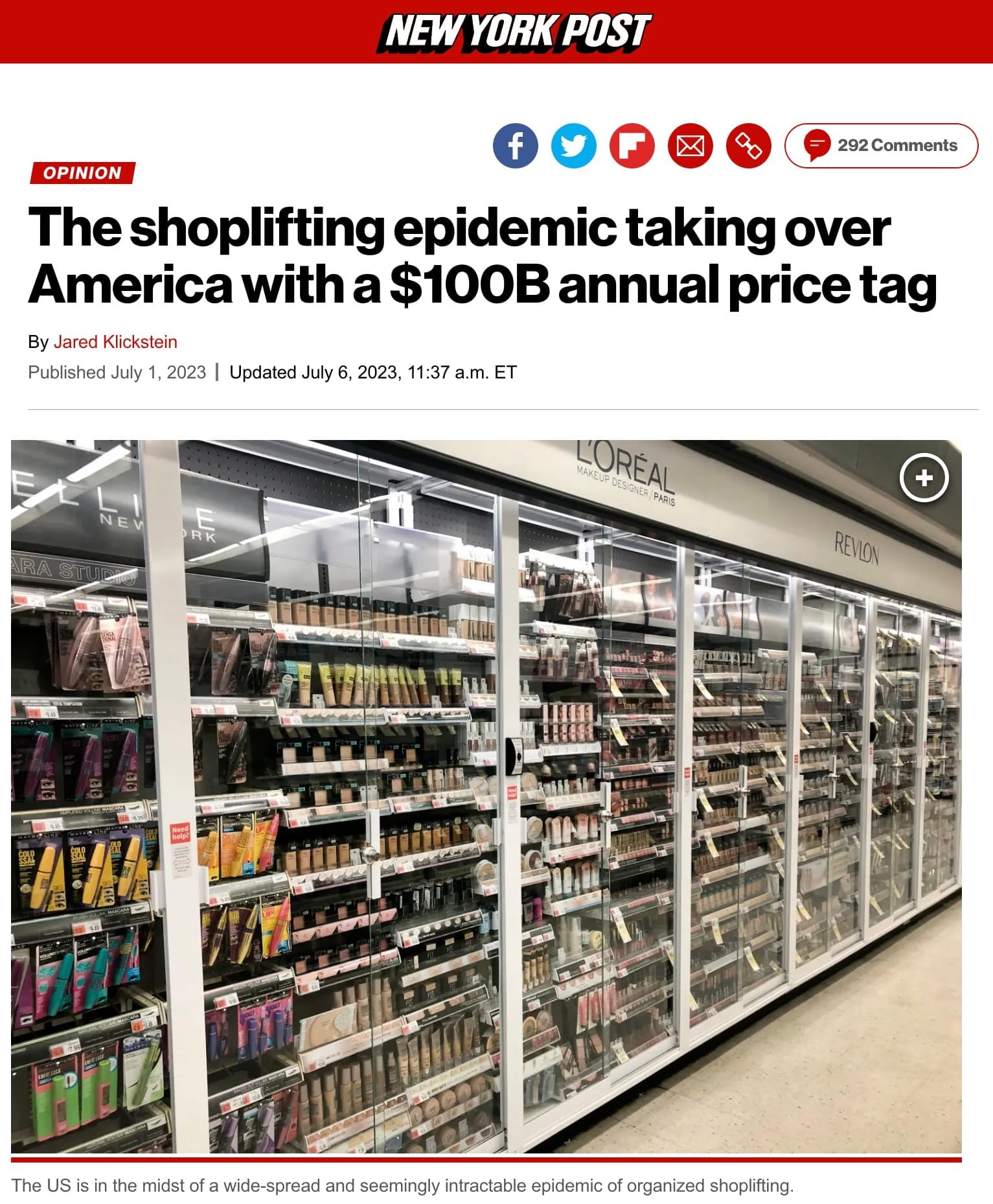
One of the world's most effective charities, Evidence Action, just kicked off a programme to provide iron and folic acid supplements to millions of anaemic children in Malawi. More than 250,000 people in Senegal recently gained access to clean drinking water and sanitation. Since the end of its civil war in 2003, Liberia has provided new or improved access to sanitation for 800,000 people in its capital city, Monrovia. It looks like China's dramatic decrease in air pollution in the last decade contributed to reduced suicide rates. This is one of the most impressive lists of results for women's and children's health we've ever seen. The ALS Association recently received $58 million, its largest-ever donation, which will go towards finding improved treatments for Lou Gehrig's disease. World food prices declined for a seventh straight month in February 2024 and are now down to their lowest levels in three years. 'Today, I am so proud to announce that we are taking steps to retire medical debt for up to an estimated 1 million Arizonans. That’s a fresh start, a new chapter and a huge weight taken off the shoulders for every single one of them.'
7th March 2024
France has become the first country to make abortion a constitutional right, after an overwhelming 780-72 vote. The measure has broad support from 80% of the French public and fulfils a promise made by President Macron following the rollback of reproductive rights in America. AP
We're sending a message to all women: your body belongs to you, and no one can decide for you. Today the present must respond to history. To enshrine this right in our constitution is to close the door on the tragedy of the past and its trail of suffering and pain.
Gabriel Attal, Prime Minister, France
Over-the-counter medication is the next battleground for reproductive rights in America. From this month, pharmacies will be allowed to sell mifepristone in a handful of states where abortion is legal, in addition to availability at clinics and hospitals. With more women facing increasing obstacles, the move will facilitate access and make the right to choose easier for more women. BBC
A new paper in Brookings claims that India has eliminated extreme poverty. Based on official consumption expenditure data for 2022-23, the authors say the last decade has seen an unprecedented decline in both urban and rural inequality, and that between 2011-12 and 2022-23, the proportion of people living in extreme poverty fell from 12.2% to 2% in 2022-23
The Indian state of Maharashtra, home to 128 million people, has decreased child mortality rates by 11% in the past four years and infant deaths by 15%. Public health measures, including early pre-natal registration and the establishment of 53 Special Newborn Care Units, have played a significant part in achieving this progress. Times of India
Nigeria has stepped up its cervical cancer prevention. Between October 2023 and January 2024, 44 million girls in 16 states, aged 9 to 14, received their first dose of the HPV vaccine. In five states, 21,851 women underwent visual inspections with acetic acid, a safe and cost-effective alternative to a pap smear. WHO
We commend the government's efforts to introduce the HPV vaccine and set in motion plans to roll out the second phase of immunization to the remaining 21 states.
Dr Walter Kazadi Mulombo, WHO
The Biden administration just announced a $1.7 billion package to fund 141 projects aimed at ending hunger across the United States by 2030. Private and non-profit organisations and local governments have also made pledges, including a $60 million commitment by tech company About Fresh, to develop data for food prescription research. Newsweek
Also, just gonna go and leave this one here.
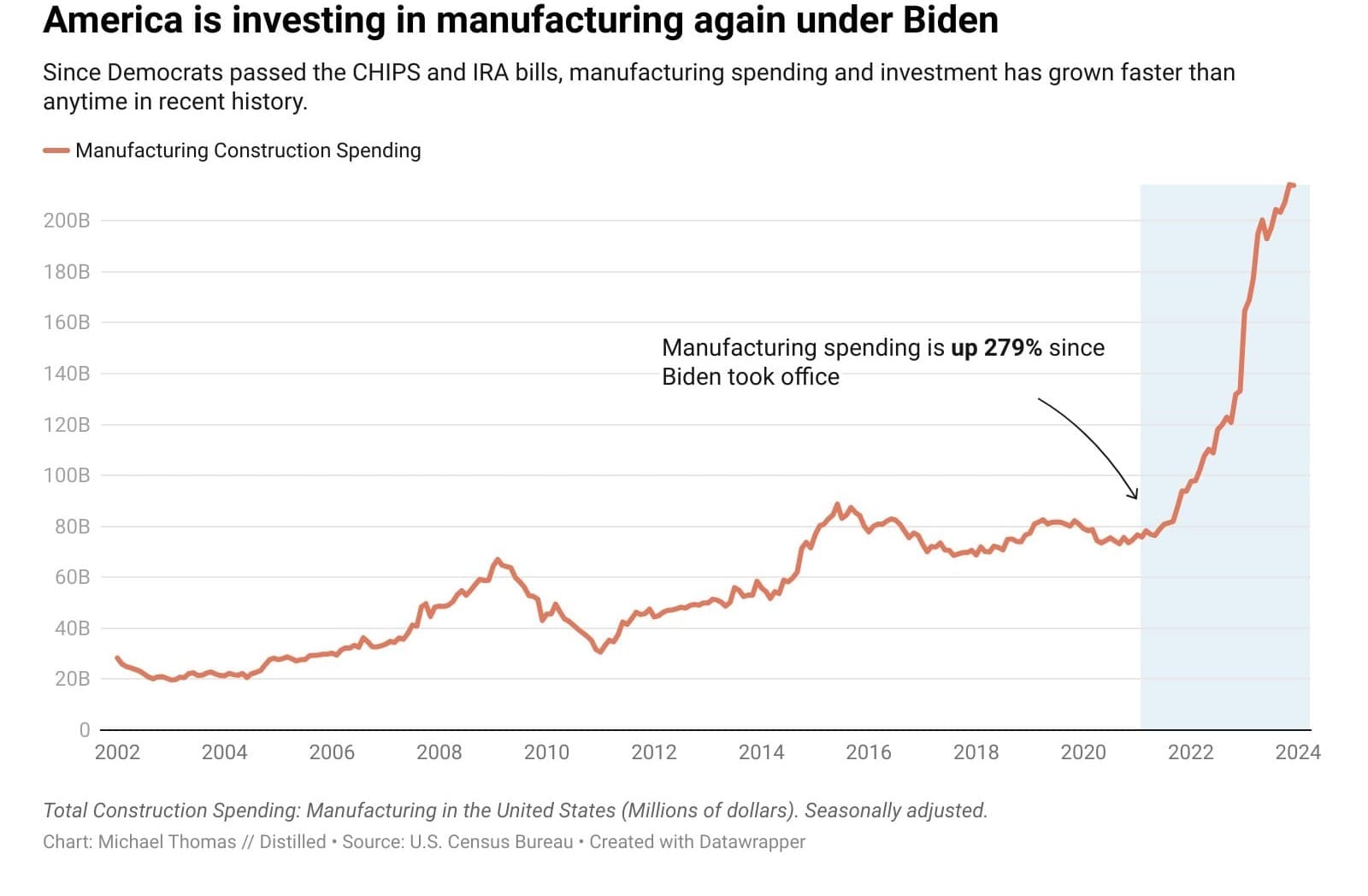
In 2022, 80.3 million children across Latin America and the Caribbean received school meals. Most of these children were in South America (63.2 million), followed by Central America (13.3 million) and the Caribbean (3.8 million). At least 19 countries in the region have committed to school meals through policy or law. WFP
A new $115 million program will improve healthcare for about 4.6 million people in 63 districts in Mozambique, especially women, children, and adolescent girls. The program will focus on the upgrade of local health centres and nutrition for young children and tackle both infectious and non-communicable diseases, including cervical cancer. World Bank
After a disappointing high court ruling in India, a consolation victory for LGBTQ+ activists with a new policy that will prohibit the disclosure of a trans person’s gender without their consent. It’s hoped the measure will encourage fair treatment and reduce discrimination in workplaces. Washington Blade
Over the past 44 years, breast cancer deaths in the US have dropped by 58%. Nearly half of the reduction is thanks to earlier detection and more effective treatment. Despite the progress, there is still so much work to be done in making sure these reductions are equally distributed. WaPo

Tobacco use has decreased in Southeast Asia by 24.7% since 2000. Over the past thirty years, social safety nets have become more prevalent in our world, providing a lifeline to hundreds of millions of people. New York City is finally sorting out its trash problem. How Finland halved its suicide rates to become one of the ‘happiest countries in the world.’ One million doses of life-saving vaccines have been administered to children living across Ethiopia, Somalia, Sudan, and South Sudan. Cancer deaths in Wales have declined 16% in the last two decades. A South Korean gay couple wins a breakthrough case for healthcare rights. Another landmark case in Kenya affirms the right to respectful maternal healthcare. A $452 million project in India will upgrade roads and bridges to connect 1.8 million people living in rural areas of Assam. The FDA just approved two new drugs: one to treat severe food allergies, including milk, eggs, and nuts; and another to target aggressive skin cancer that cannot be surgically removed. Brazil’s food banks are embracing ugly produce to feed millions of kids.

29th February 2024
The WHO's South-East Asia region, home to two billion people, has a new report out, highlighting an extraordinary list of accomplishments from the last decade. Between 2014 and 2023, the region eliminated neonatal tetanus and saw the highest reduction in maternal mortality in the world, as well as the fastest decline in tobacco use. Two countries eliminated malaria, two eliminated trachoma, three eliminated rubella and measles, four eliminated lymphatic filariasis, four achieved hepatitis B control, and the Maldives and Bangladesh became the first countries in the world to eliminate leprosy and visceral leishmaniasis, respectively.
Greece has become the first Christian Orthodox-majority country to legalise same-sex marriage. Same-sex couples will now also be legally allowed to adopt children, after Parliament voted 176-76 in favour on the 15th of February. 'The reform makes the lives of our fellow citizens better, without taking away anything from the lives of the many.' BBC
In 2005, Burundi embarked on a mission to ensure that all children, especially girls, had access to quality education. The results have been remarkable: primary school enrolment has increased by 58%, high school enrolment has surged from 32% in 2010 to 40.6% today, and the average number of years of schooling has increased from 6.4 to 7.6 years. World Bank
Mozambique's 2023 Demographic and Health Survey report contains some good news: child mortality is down from 97 to 60 per 1,000 live births since 2011, neonatal mortality has decreased from 30 to 24 per 1,000 live births in the same period, and maternal mortality has improved from 532 deaths per 100,000 live births in 2000 to 127 in 2020. WHO
The Biden Administration just announced $5.8 billion in funding that will go out to every state and territory to help fix water infrastructure. The funding will be used to clean drinking water, improve wastewater and sanitation, remove contaminants like forever chemicals, and replace lead pipes. CNN
In a vast wasteland in Inner Mongolia, Chinese scientists have found a way to turn huge swathes of saline-alkaline land into fertile fields. Their simple technique reduces soil salt content by 36% and increases crop yields by 30.5%. Farmers in the Netherlands are also taking on soil salinity, with some amazing results.
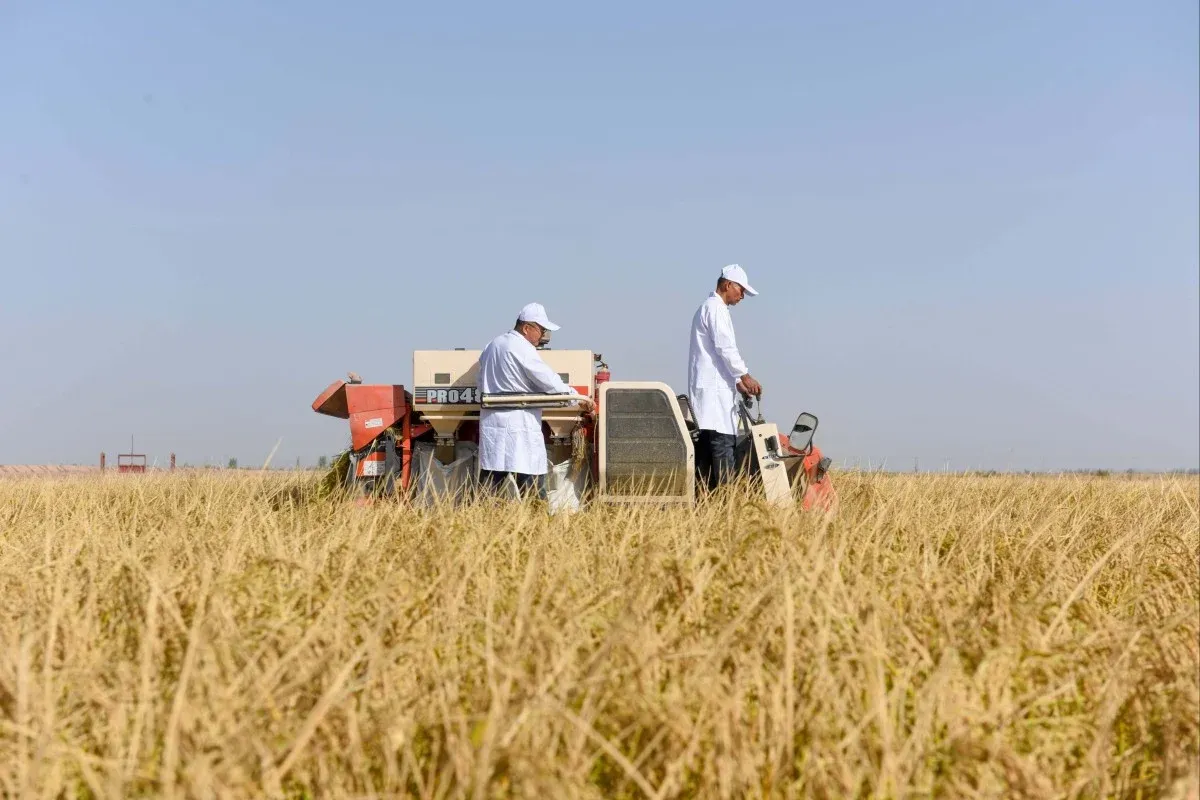
Germany has become the ninth country to legalise recreational use of cannabis. Many more countries allow its medical use as a painkiller. The law in Germany now allows for the cultivating of up to three plants for private consumption and owning up to 25 grams of cannabis. It remains illegal for minors, as does consuming it near schools and playgrounds. Reuters
Maybe the reason everyone is confused about the US economy is that very few people alive have experienced one that reverses inequality. Real wages are growing, women's wages are growing faster than men's, young people's wages are growing faster than old people's, and low-income wages are growing faster than high-income wages. Derek Thompson
Remember how US national media provided wall-to-wall coverage of San Francisco's 'doom loop'? Amazingly, none of those same outlets is reporting that property crime is down 31%, and violent crime is down 11%, from January last year. Compared to January 2018-2020, property crime and violent crime are now down by 40% and 24%, respectively. SF.gov
Numerous cities around the world, from the US and Canada to China, France, Belgium, and Australia, are removing unnecessary stretches of concrete and asphalt, allowing nature to take hold in their place. The idea of depaving (also known as desealing) is a simple one—replace as much concrete, asphalt, and other forms of hard landscaping as possible with plants and soil. BBC

What you're actually supposed to do with a billion dollars. It looks like Dublin is going to be the next place to ban cars from its city centre. Italy, home of the mafia, is now one of Europe's safest countries. Nepal just passed a law restricting trans fats, following the leads of Thailand, India, Sri Lanka and Bangladesh. The Biden administration has now cancelled student debt for nearly 3.9 million people. Connecticut will cancel medical debt for 250,000 residents this year, the first state to provide this type of relief. How Mexico's feminists won their fight for reproductive rights. In a major step forward for the labour movement, Michigan just repealed its anti-union 'right to work' law, the first US state to overturn the law in nearly 60 years. Slovenia has seen cases of cervical cancer drop by almost half over the last 20 years. The hottest trend in American cities? Changing zoning rules to allow more housing. Notre Dame’s new spire unveiled, complete with golden rooster.

15th February 2024
Heart disease is the top cause of death in the United States, but progress is being made, and millions of lives are being saved. The American Heart Association just released its new report showing that the country has cut heart disease death rates by 70% since 1950 and stroke death rates by nearly a third since 1998.
A ton of good news on malaria this week. Cameroon and Burkina Faso have begun their rollouts of the RTS vaccine (nearly 10,000 children have already been vaccinated), Benin just took delivery of 215,900 doses, Cambodia has announced that it's on track for malaria elimination by 2025, and another trial of the R21 vaccine in four African countries has shown that it's safe and extremely effective.
After several months of intense negotiations, the EU has reached a historic agreement on a new law that addresses gender-based violence, female genital mutilation, forced marriages, and online harassment across all member states. 'Today, we take the first step towards making Europe the first continent in the world to eradicate violence against women.' Nadja
On Monday, for the first time on Polish TV, and after eight years of a far-right government, LGBT+ activists appeared on a live broadcast in which the interviewer began by apologising after years of bigotry. Please watch this. In the 1980s, Poland led the world out of its totalitarian Soviet nightmare, and in the 2020s, it might just show us the way again.
France’s lower house of parliament has overwhelmingly approved a measure to enshrine abortion as a 'guaranteed freedom' in the constitution. 'Tonight, the assembly didn’t miss its rendezvous with the history of women and with history in general.' Guardian
Cambodia has spent $1.4 billion to help more than 1.43 million families and 360,000 pregnant women since 2019. It's made a big difference—the UNDP says the poverty rate declined to 16.6% in 2022 from 36.7% in 2014, and the number of poor people was halved from 5.6 million to 2.8 million. Khmer Times
The next time someone uses 'globalists' as a slur, you might want to show them this list of WHO projects: malaria elimination in Cabo Verde, community health in Panama, dengue control in Paraguay, Guinea worm eradication in Angola, HIV care in Cameroon, success against hepatitis B in Maldives and Sri Lanka, and fighting back against cholera outbreaks in Zambia and Zimbabwe.
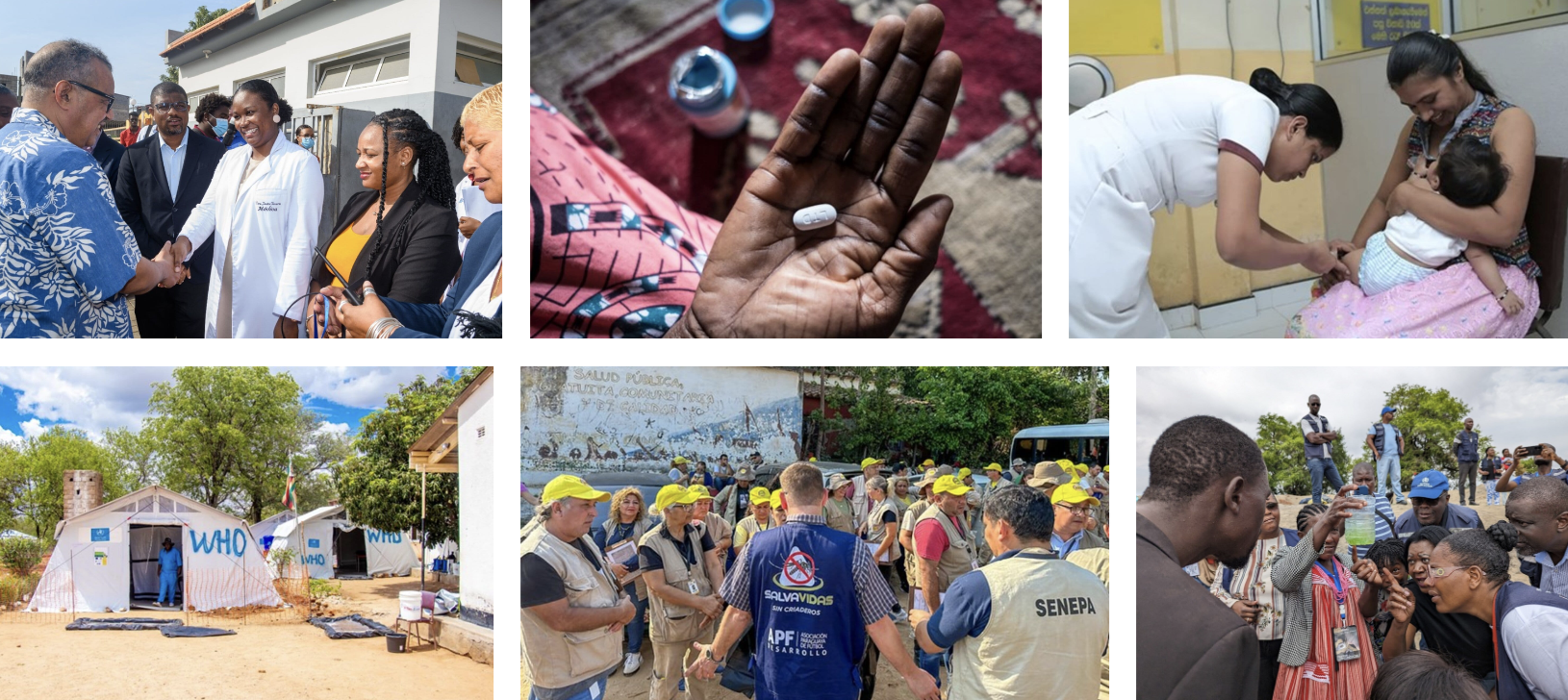
The Asian Development Bank has approved a $419.6 million loan to expand access to sanitation in the cities of Mataram, Pontianak, and Semarang. The project will strengthen sanitation systems for approximately 2.5 million people, based on an inclusive sanitation principle which aims to ensure access citywide.
Last year, Ghana doubled cash benefits for its poorest households and is set to do so again in 2024, increasing coverage to 12% of household consumption. The recent budget also includes a big boost for school meal programs, as well as a 40% increase for the National Health Insurance Authority to cover medical claims, essential medicines, and vaccines for the most vulnerable. IMF
In 2019, India launched a national program to combat air pollution in 131 cities. Since then around half of the cities for which data are available have seen improvements. This includes Delhi, which saw a 5.9% decline in PM2.5 levels from 2019 to 2023, Bengaluru (2%), Hyderabad (7%), Kolkata (16.9%), Patna (25.2%), Chennai (33.4%), and Lucknow (41.2%). New India Express
Be nice to Boomers, people, they've got it tough. At age 36-40, Millennials had a real median household income that was 18% higher than that of the previous generation at the same age... holding work hours constant, they experienced a greater intergenerational increase in real market income than Baby Boomers. US Federal Reserve
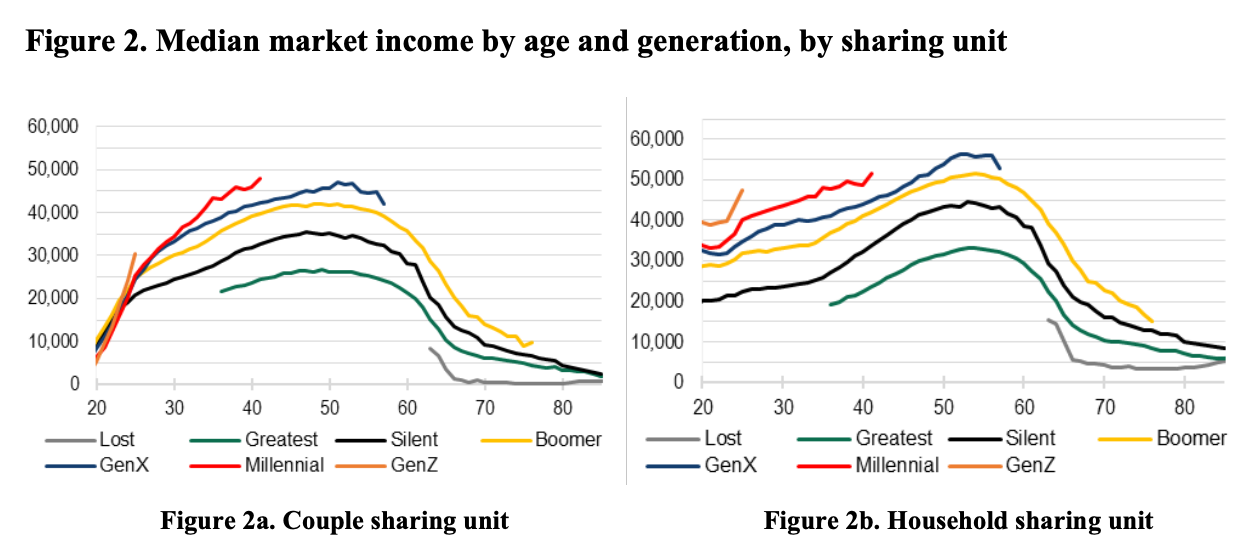
The first endometriosis drug in four decades is now on the horizon. It looks like a safe and effective dengue vaccine is imminent too. Despite a national spike in homelessness, some regions in the United States are finding solutions. By the time this newsletter goes to press, there's a good chance Greece might have legalized same-sex marriage. Zimbabwe has abolished the death penalty, a practice introduced by British colonial administrators. A sex education bus has reached over 5,000 teens in Honduras, and it's just getting started. 95,000 people just got access to clean drinking water in Mauritania. The adult literacy rate in Tanzania has risen to 83% from 78.1% in the past decade. Poverty is plummeting in Bangladesh, thanks to a much better social safety net. Ecuador's highest court has decriminalised euthanasia. The United States reduced its backlog of immigration cases last year, after processing an unprecedented 10 million cases. Last year the FDA approved 55 novel therapeutics, the second-highest total in 30 years. Young people in the United Kingdom are drinking way less. In the 1980s, the average lifespan of a person with Down syndrome was 25 years. Today it's over 60. For people with disabilities in Kansas, a big win.
8th February 2024
Europe is slowly winning the war on cancer. New research shows a decline in cancer mortality rates of 6.5% among men and 4.3% among women between 2018 and 2024 (estimated). An estimated 6.2 million cancer deaths have now been avoided in the EU and 1.3 million in the United Kingdom since 1988. Annals of Oncology

Zambia’s parliament has passed landmark legislation setting the marriageable age at 18, without exception, for all marriages, including customary marriages, representing a significant step in the nation’s commitment to eradicating child marriage. This is a big deal for a country that is home to a staggering 1.7 million child brides, 400,000 of whom were married before age 15. Equality Now
Zimbabwe has raised the age of consent from 16 to 18 years, with violators now liable to spend up to ten years in jail. Data suggest that over a third of girls experience sexual violence before the age of 18.'This will contribute to a reduction of sexual abuse of children, which continues to be a concern in Zimbabwe.' Herald
Senegal just installed a new water pipeline that will bring clean drinking water to 100,000 households on the outskirts of Mbacké, the country's most populous city, and in Mozambique, aid agencies just provided funding for an expansion of water and sanitation services to at least 325,000 people, as well as 90 schools and clinics.
Mexico is getting a handle on crime after some of the most violent years in its history. Homicides dropped by 4.18% in 2023, marking the third consecutive year of decline; rates of femicide have dropped by 38.6% under the current government; and the last 12 months have also seen declines in human trafficking (39.3%), financial crimes (25.9%), and organized crime (16.8%). La Prensa Latina
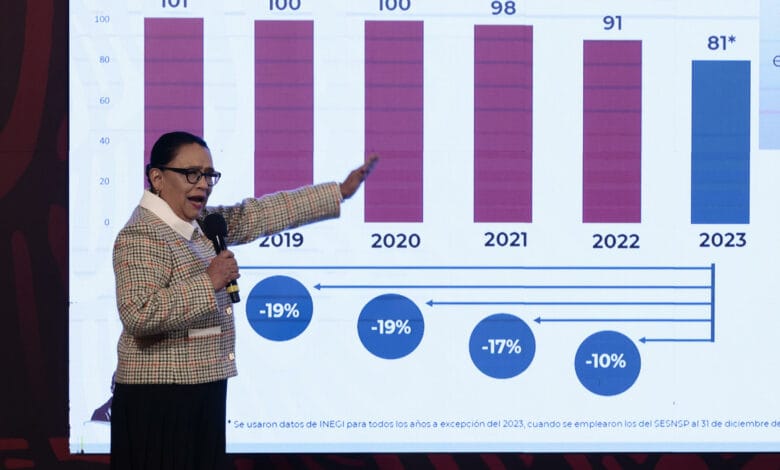
In India, the number of women enrolling in higher education increased by 32% between 2015 and 2022, from 15.7 million to over 20 million. There has also been a notable increase in enrolment across all levels of education for female students from scheduled castes, increasing from 21 million in 2015 to 31 million in 2022. Economic Times
Parisians voted in a referendum last Sunday in favour of subjecting large SUVs to a threefold increase in parking charges as the French capital presses on with long-term plans to become a fully bikeable city. The new measure will triple parking fees for cars of 1.6 tonnes and more to 18 euros an hour in order to discourage 'bulky, polluting' cars. Reuters
Parking reform is only partly about parking. Over the past decade, US cities like Minneapolis, San Francisco, and Austin have eliminated parking space mandates in order to reduce car dependency, create public and green spaces, and lower housing costs. Reducing cars delivers big benefits for cities—parking occupies a double-digit share of land in most metro areas. Yale360
Older Americans are now significantly less lonely than they were three years ago; a recent peer-reviewed study reports that middle-aged Americans describe themselves as less lonely than 20 years ago, and while loneliness is more pervasive among younger Americans, there too, the rates have also plummeted since 2020.
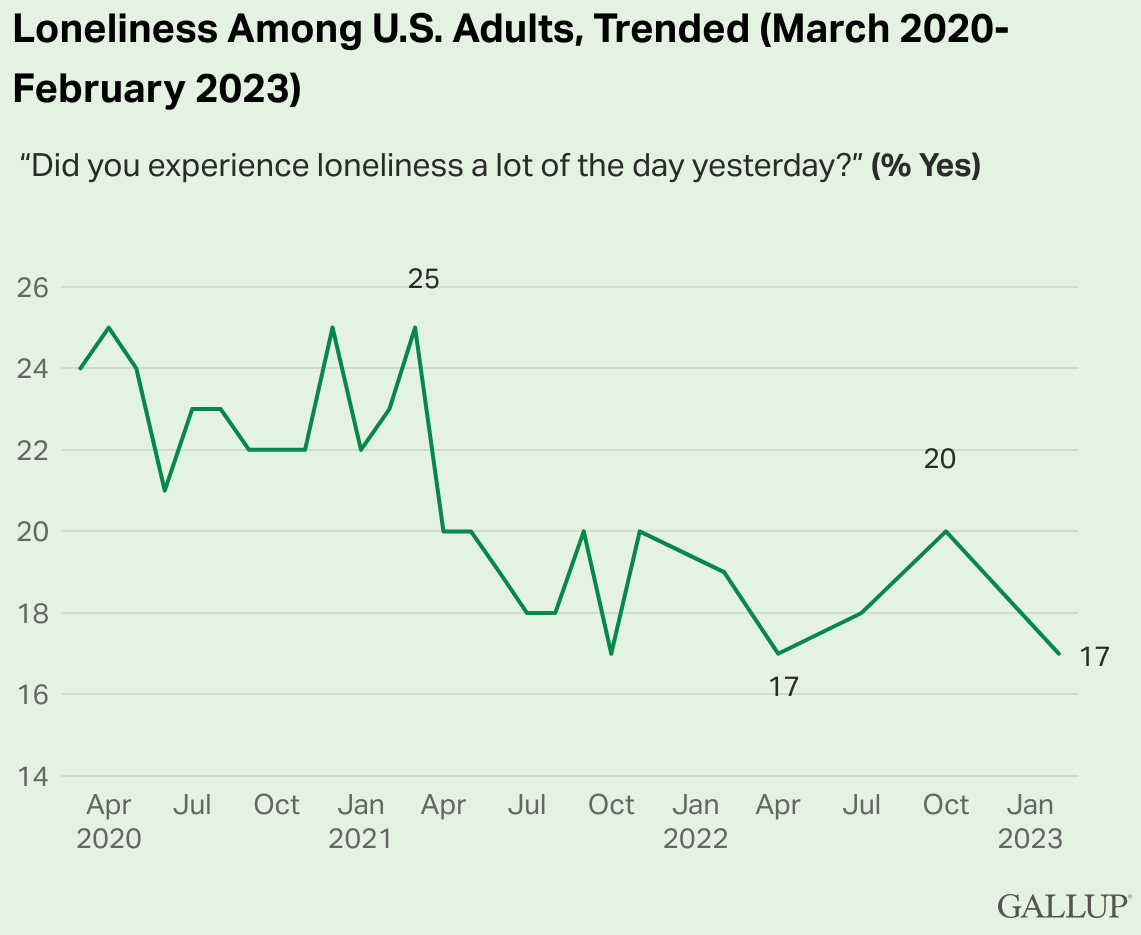
In a landmark ruling that could significantly impact reproductive rights in Pennsylvania, the state's Supreme Court has declared the 1982 Abortion Control Act, which barred Medicaid from covering most abortions, as unconstitutional. The court’s decision, issued last week, underscores the fundamental right to reproductive autonomy and serves as a victory for advocates of abortion rights.
Poland's new ruling coalition is looking to undo the restrictive measures on the morning-after pill that the previous government introduced in 2017; in El Salvador, a victory for women who were jailed under the country’s draconian anti-abortion laws, the result of the tireless work of Salvadoran feminist movements.
New research has shown that the FDA's approval of over-the-counter emergency contraception had an unintended but positive side effect for America’s hospitals. Emergency rooms saw 96% fewer visits from women seeking emergency contraception after the morning-after pill became easily available to adults in 2006. JAMA
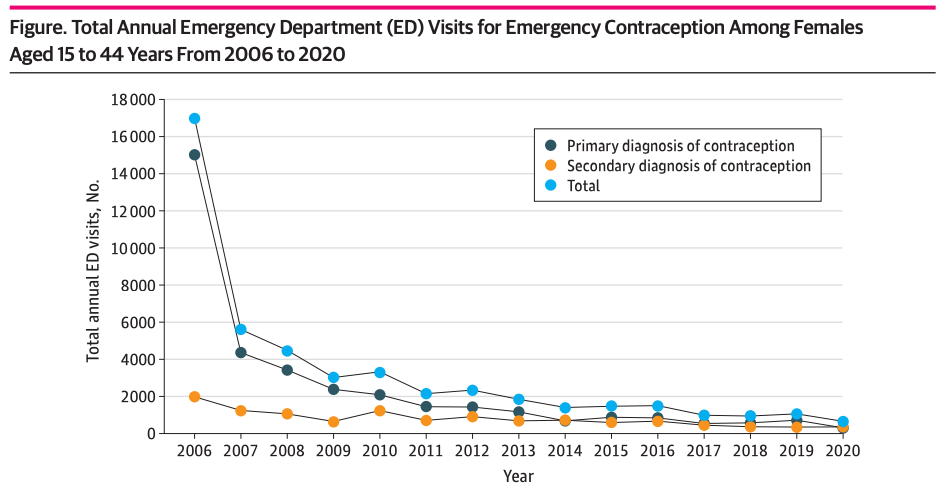
Gun violence experienced the largest decline on record in the United States last year (why is this not a bigger story?). Starting this month, 45 companies in Germany are testing a four-day workweek. Madagascar is starting to take serious steps towards controlling a parasitic disease called porcine cysticercosis. Lebanon's parliament has agreed to consider a landmark law to prevent child marriage. New York is buying up millions of dollars of medical debt in an effort to help as many as half a million people. Austin gave poor families a basic income for a year and it changed their lives. Cambodia just completed its largest-ever government-led mass dog vaccination campaign. All major sectors of the US economy have now seen employment fully recover from the pandemic. Cameroon used to have 12 students for every textbook in 2016; it had three textbooks for every two students in 2023. The South American nation of Guyana is getting close to eliminating filaria, leprosy, and other 'neglected diseases.' The number of teens in America who have tried smoking has decreased fourfold since the 1990s (rebellion just ain't what it used to be).
1st February 2024
In 2008, India recorded over 33,000 cases of a brutal disease called visceral leishmaniasis (black fever). Left untreated, 95% of cases are fatal. In 2023, provisional government data showed just 520 cases nationwide, putting India on the verge of becoming the second country to eliminate this disease. DW
France’s top court has struck down large parts of a divisive new immigration law that was passed in parliament with the backing of the far right, ruling that the measures go against the Constitution. The top court also threw out a deeply divisive measure that made it harder for immigrants to bring their families to France. France24
Women in Türkiye can now use their own surnames after marriage, following a decision by the Constitutional Court to abolish a restrictive provision in the Turkish Civil Code. 'Saying that a married woman must take her husband’s surname, and the child take their father’s surname is lending official support to the patriarchy.' duvaR
In the United States, 21.3 million people have signed up for an Obamacare plan during the enrolment period this year, including more than five million people—about a fourth—who did so for the first time. Four in five of all customers were able to find health care insurance for $10 or less per month after subsidies. CMS
José Andrés and World Central Kitchen always seem to find a way. They just announced they've served over 22 million meals in Gaza. They've been able to dispatch over 800 trucks to the area and set up 27 kitchens and over 750 clean cooking stoves.
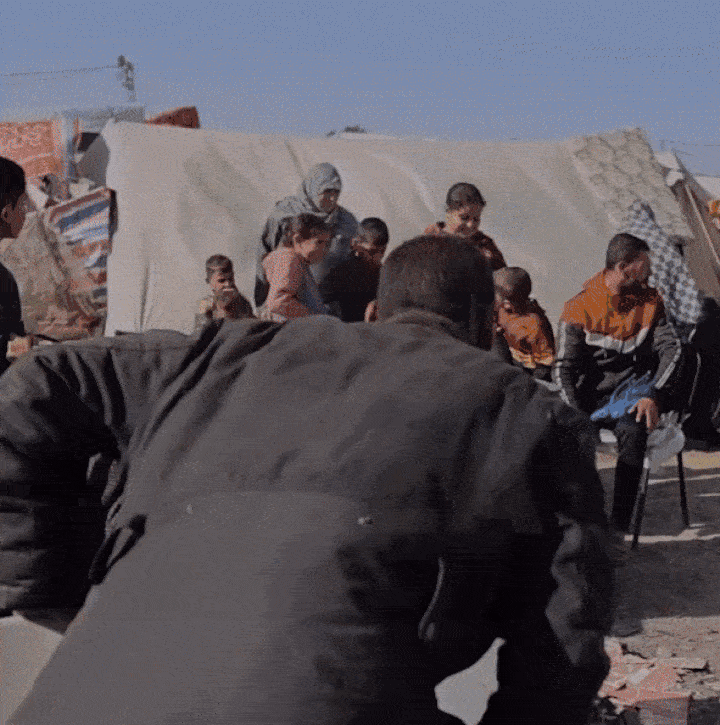
Between 2000 and 2020, the Lao maternal mortality rate fell by over 250%, one of the largest reductions in the world. It's primarily thanks to the work of midwives, who provide critical sexual and reproductive health services and support their patients through labour and delivery, family planning decision making, and the pursuit of rights and choices. UNFPA
'It’s rare to see such fast, decisive action on a major health problem—and impressive to see it immediately rewarded with such a dramatic improvement in blood lead levels and health outcomes. It’s a reminder that things can change, and can change very quickly, as long as people care, and as long as they act': how Bangladesh removed lead from turmeric and saved lives. Vox
In 2023, Colombia trialled a new model for improving maternal healthcare in 16 territories. An analysis of those territories showed a 16% reduction in the maternal mortality rate during the first six months of the year, so the Ministry of Health has now adopted the strategy nationwide. Think Global Health
Zimbabwe has launched a massive house-to-house vaccination campaign to curb the spread of cholera. The target is to vaccinate 2.3 million people in the most affected districts. Each vaccination team is composed of three people, expected to vaccinate an average of 150 persons per day. UNICEF
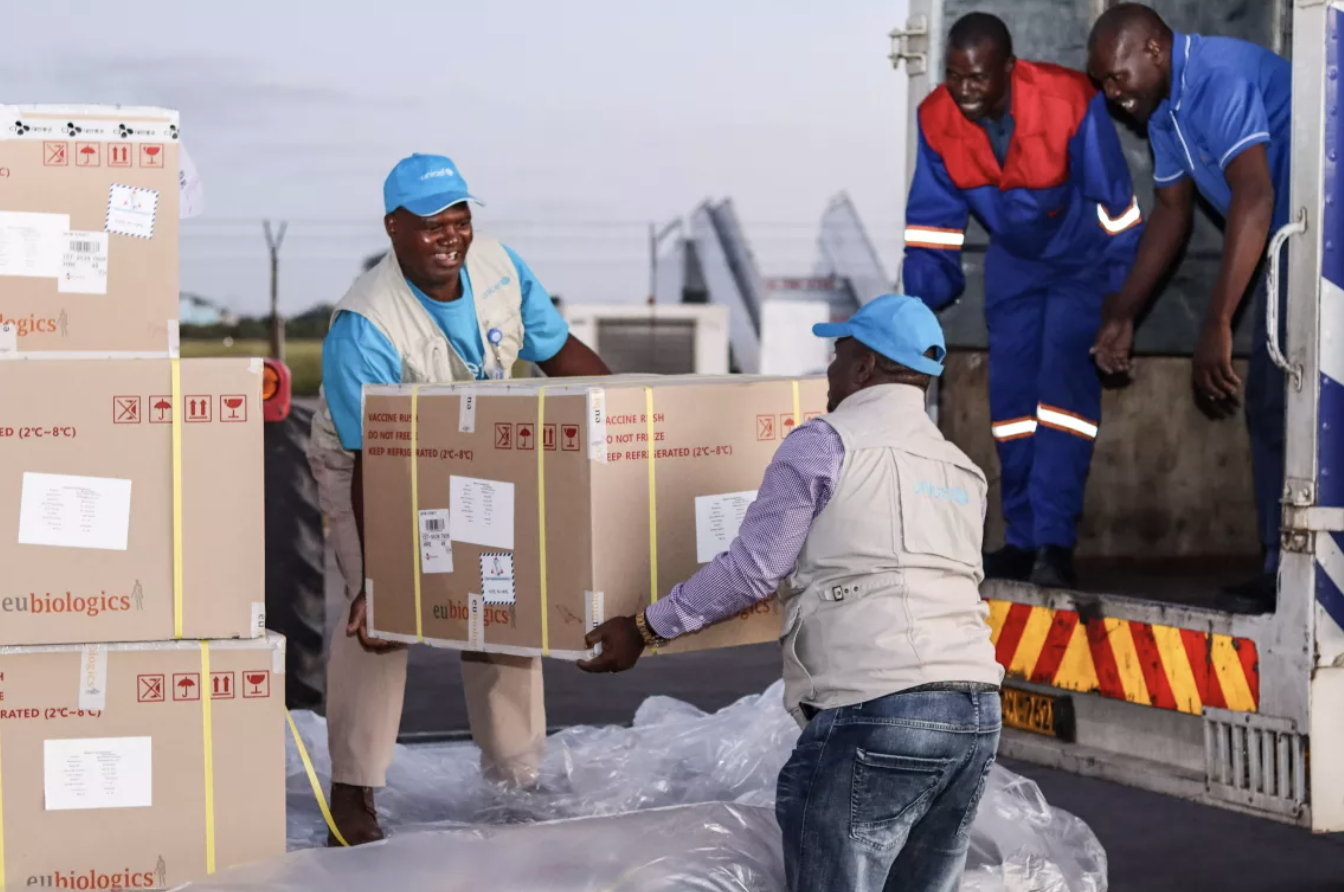
A working-class victory is on the horizon in Colombia, after a labour reform law advanced to a second round of legislative debates. The bill will not only restore labour rights that were rescinded two decades ago by a far-right government, it will go a step further and expand these rights, increasing overtime pay, expanding social security for delivery workers, and strengthening workplace rights.
The Seychelles has the best education system in Africa. At least 9% of the country's budget is allocated to education, and it has met all six of UNESCO's goals, achieving a 50% improvement in adult literacy, ensuring universal access to primary education, and achieving gender equality in education. Fair Planet
Kenya has a major project underway to improve wastewater management and water supplies across the country, and it's working. This month, President Ruto has inaugurated two major clean water schemes—one serving 200,000 people in Trans-Nzoia county and another in Busia County serving 173,624 people. Afrik21
Last year, Türkiye suffered its worst earthquakes in nearly a century, exacting a devastating economic, physical, and human toll. A year on, reconstruction and recovery work is in full swing. Damaged or collapsed infrastructure is being rebuilt, tens of thousands of classrooms constructed, and record investments are pouring in.

24th January 2024
The world's first mass vaccination campaign for children against malaria was launched in Cameroon on Monday. It will distribute 25 million doses to combat the disease, which causes over 600,000 deaths globally per year. 'We are not just witnessing, but actively participating in a transformative chapter in African public health history.' Guardian
Despite persistent efforts by the tobacco industry, humanity is steadily breaking one of its worst habits. A new report from the WHO indicates that 150 countries are reducing tobacco use, around 1 in 5 adults worldwide now consume tobacco compared to 1 in 3 in 2000, and there are 19 million fewer smokers than there were just two years ago.
The American Cancer Society just released its annual report showing that fewer Americans are dying of cancer, part of a decades-long trend that began in the 1990s. Cancer mortality is down 33% in the past three decades, saving an estimated 4.1 million lives, and as many as two-thirds of all cancers can now be treated as chronic conditions or cured outright.
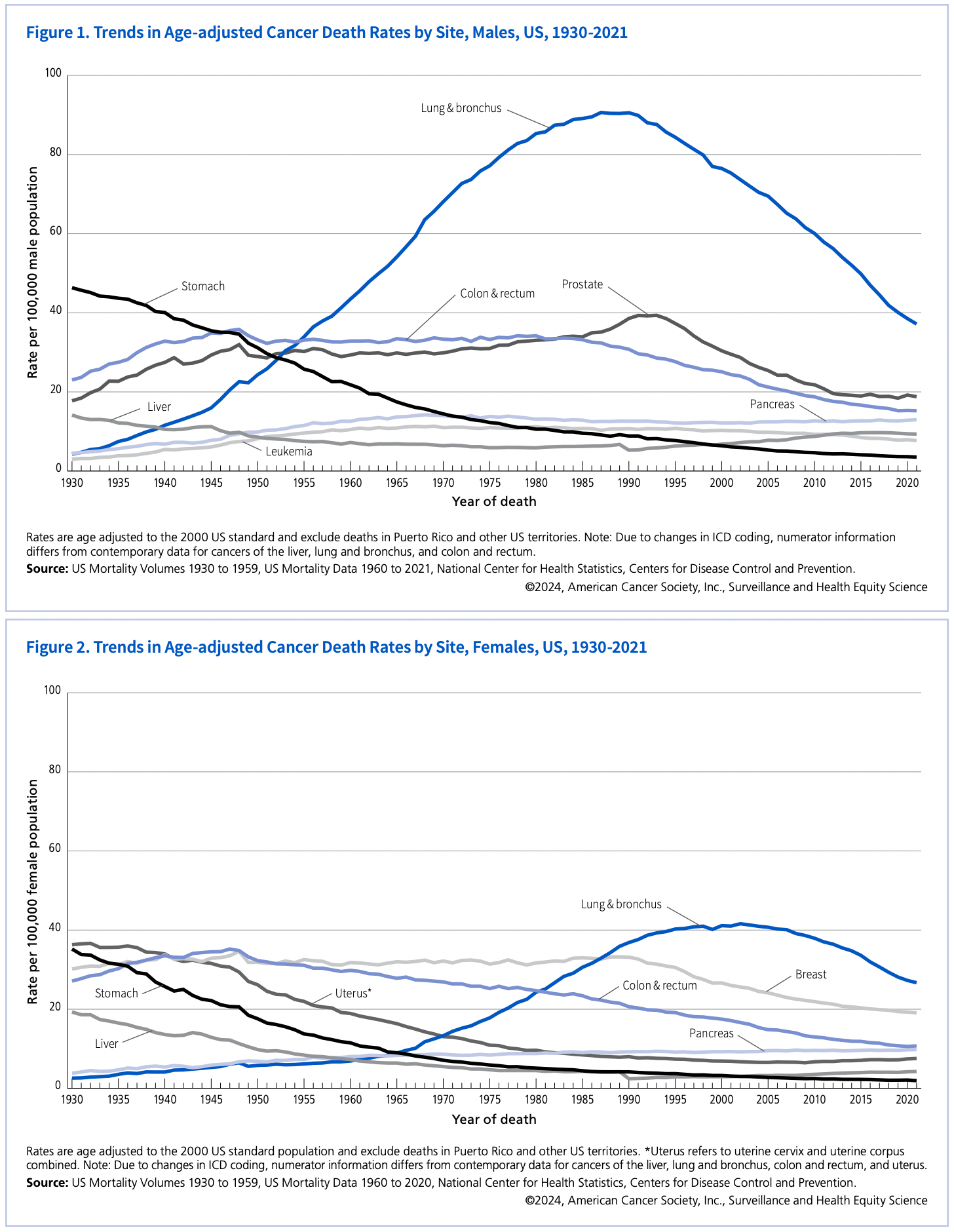
We've said it before, and we'll say it again and again—the HPV vaccine is a bloody miracle. In case anyone needed reminding, a new analysis from Scotland shows that there hasn't been a single case of cervical cancer in women who were vaccinated at 12 or 13 years of age. Exactly what was expected, but nevertheless fantastic news. JNCI
School lunches are Brazil's secret weapon against hunger. At all public schools, children are provided meals for free under a government-run program that feeds more than 40 million students from daycare through high school across 5,570 municipalities, ensuring all children stay nourished and engaged in their education. NPR
The share of India’s population living in multidimensional poverty has fallen to 11.28% in 2022-23 from 29.17% in 2013-14, according to NITI Aayog, the country's apex public policy think tank. Researchers estimate that a total of 248 million people have escaped multidimensional poverty in the last nine years. How is this not front page news around the world?
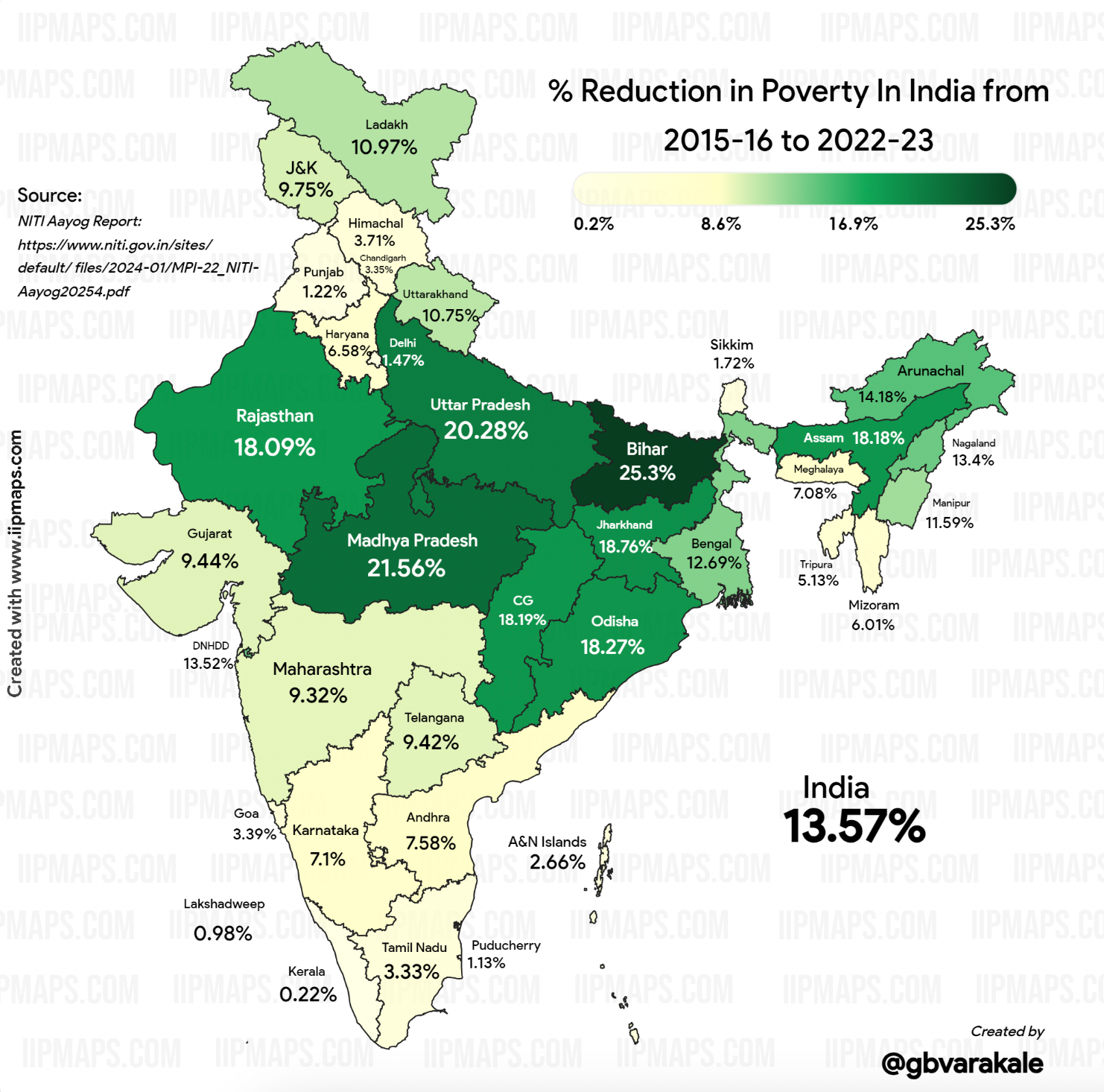
The world's biggest cities are getting cleaner. Deutsche Welle analysed data on PM2.5 levels for megacities with populations over 10 million. Of the 25 with available data, 21 improved their air pollution levels between 2017 and 2022. 'This is something that's resonating across all regions of the world right now, and it's really exciting.'
In the last few years sub-Saharan Africa has made substantial strides toward digital transformation, with over 160 million people gaining broadband internet access between 2019 and 2022. There's still a long, long way to go—but this is encouraging progress. World Bank
Germany's government just injected some good sense into its immigration debate. On January 18th and 19th it passed two immigration bills. The first, pleasing to conservatives, will make it easier to expel asylum-seekers with dubious cases; the second, more significant, law will make it easier for legitimate immigrants to gain German nationality. Economist
During 2023, violent crime plummeted to its lowest level in the United States since the 1960s, and by the end of the year inflation had been tamed and unemployment was at historic lows. In surveys, most Americans still say crime is rising and the economy is struggling, but they’re wrong. Call it the Great Normalization: the twin crises evaporated, and no one is totally sure why. Atlantic
South Africa may have finally turned the corner on HIV as prevalence among pregnant women has dropped to its lowest in two decades. Over the last ten years, the six countries of the Greater Mekong have made remarkable progress towards malaria elimination. In the US, 21 states have abolished the practice of court fines for juveniles. Iran's literacy rate reached 97% in 2023, up from less than 50% in the 1970s. Thai lawmakers have taken a big step forward towards improving air quality. Egypt just amended its laws to include more chances to appeal in criminal cases, a 'victory for human rights.' The US government is forgiving another $4.9 billion in student debt for 73,600 borrowers. The Maldives and Sri Lanka have achieved hepatitis B control, meaning consistent vaccination rates over 90%. No, the maternal mortality rate in the United States is not rising; it's actually on par with those of Canada and France. Since 2014, over 5,000 schools in Ethiopia have been equipped with water, sanitation, and hygiene facilities. In Kenya, 200,000 people just gained access to clean drinking water. California has enacted a law that makes it easier for out-of-state doctors to get experience in reproductive medicine. How Utah is solving the problem of literacy for third graders.
18th January 2024
Cape Verde, an island nation off the coast of West Africa, has become the first sub-Saharan African country to be declared malaria-free in 50 years. The WHO confirmed there have been no cases of local transmission in three years, thanks to a decades-long effort to strengthen its health systems and increase access to diagnosis and treatment. BBC
Eastern and Southern Africa have achieved gender parity in primary education, with 25 million more girls enrolled in primary school in the region today than in the early 2000s. There's still a long way to go: not as many girls complete high school as boys (although the gap is narrowing), and labour force participation is still dramatically unequal, but progress is happening. World Bank
The Canadian Cancer Society has a new report on progress in the fight against cancer, the country's number-one cause of death. Age-standardised mortality rates have decreased by 39% in males and 26% in females since their peak in 1988, and the rate of decline has accelerated since 2016, particularly for lung, bladder, and colorectal cancer, as well as Hodgkin's lymphoma.

Yes, everything in America is awful, apart from the fact that 21 million kids will get free lunches this summer; 22 states just increased their minimum wage, which will benefit 9.9 million workers; inflation is well and truly over (seriously); more than 40% of the population now lives in states that are dedicated to 100% clean energy; Obamacare enrolments are surging in southern states; blue collar jobs are booming and all other major sectors of the economy except for leisure and hospitality have seen job numbers fully recover from COVID; the IRS has collected half a billion dollars in back taxes from delinquent millionaires since 2022; soda taxes in five cities are working better than expected; millions of people just got access to cheaper insulin; the proportion of Texans living in poverty is declining; California has a new law allowing parents who experience miscarriage and stillbirth to take leave from work; trans people are finding refuge in upstate New York; a new FDA rule allowing gay and bisexual men to give blood is making donations more inclusive; Minneapolis has figured out the right way to help people experiencing homelessness; Illinois recently implemented a raft of progressive laws, including a ban on dozens of rifles and handguns; and the federal government just issued a pardon to every American who has ever used marijuana.
Vietnam made big reductions in poverty last year. Its National Office for Poverty Reduction reported a multidimensional poverty rate of 2.93% at the end of 2023, a 1.1 percentage point decrease from 2022. The poverty rate declined by over 5.6 percentage points in impoverished districts to approximately 33%, and in ethnic-minority areas, it dropped to nearly 18%. Vietnam+
Sanitation is coming to Tanzania. Between October 2018 and April 2023, over 4.7 million people gained access to improved water supplies, 6.6 million people gained access to improved sanitation facilities, 594 villages achieved community-wide sanitation status, and 1,904 healthcare facilities and 1,095 primary schools installed improved sanitation and hand-washing facilities. World Bank
Greek PM Kyriakos Mitsotakis’s plan to legalise same-sex marriage and allow adoption for LGBTQ+ couples obtained crucial backing from the opposition last week. Legislation is now set to be approved by Parliament, despite backlash from the Orthodox Church. 'We are going to legislate equality in marriage, which means elimination of discrimination based on sexual orientation.' Euro News

Road traffic kills way more people than war, and is the leading cause of death for young people aged 5 to 29 years. However, humanity is making progress. There were an estimated 1.19 million road traffic deaths in 2021, a 5% drop from 1.25 million deaths in 2010. This happened despite the global motor vehicle fleet more than doubling, and the global population rising by a billion in the same period.
Quite literally proving the adage that 'the news doesn't report the planes that land,' did you know that in 2023 there were no major fatal accidents involving large turbofan-powered commercial aircraft? That makes it the safest year in aviation history. Gotta be worth a headline somewhere, right? Wrong. Simple Flying
A road construction project linking Ivory Coast and Liberia is set to provide an economic lifeline for over 900,000 farmers; a wastewater management project in Vietnam is set to improve water quality and wastewater treatment for half a million people in the province of Binh Duong; and a sanitation project in Tamil Nadu in India will improve water and sewerage for over 2 million people.
Relief may be in sight for consumers. The FAO's food price index, which tracks prices of cereals, vegetable oils, sugar, meats, and dairy, fell 10% last year, the biggest annual decline since 2015, and there are signs that lower wholesale food prices are starting to feed through to supermarket shelves around the world. Bloomberg 🎁
Joe Stiglitz on inflation: time for a victory lap? US-China relations are stabilising, but that's not nearly as newsworthy as when they're shaky. The Global Vaccine Alliance just authorised $1.8 billion for vaccine manufacturing in Africa, for catching up missed vaccinations, and for future pandemic preparedness. The WHO has added the R21 malaria vaccine to its list of prequalified vaccines, opening up further avenues for support and distribution. A law extending marriage and adoption rights to same-sex couples in Estonia just took effect, and Israel's Supreme Court has ruled that LGBTQ couples can adopt. Free bus passes are transforming the lives of millions of women in India. In a major shift, more women than men were employed as associates at US law firms in 2023. Zimbabwe is on the cusp of becoming the next African country to eliminate the death penalty. Not all heroes wear capes: check out these amazing kids in Yemen.

